
Don’t forget the St Mary’s Cathedral Crucifix Competition! - Page 3 www.therecord.com.au
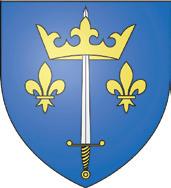








“Be indefatigable in your purpose and with undaunted spirit resist iniquity and try to conquer evil with good, having before your eyes the reward of those who combat for Christ.”



As the Church celebrates the 2000th anniversary of St Paul’s birth with a Jubilee year, use The Record’s poster inside to find out more about this giant of the early Church and how you, too, can live out the Church’s missionary mandate.




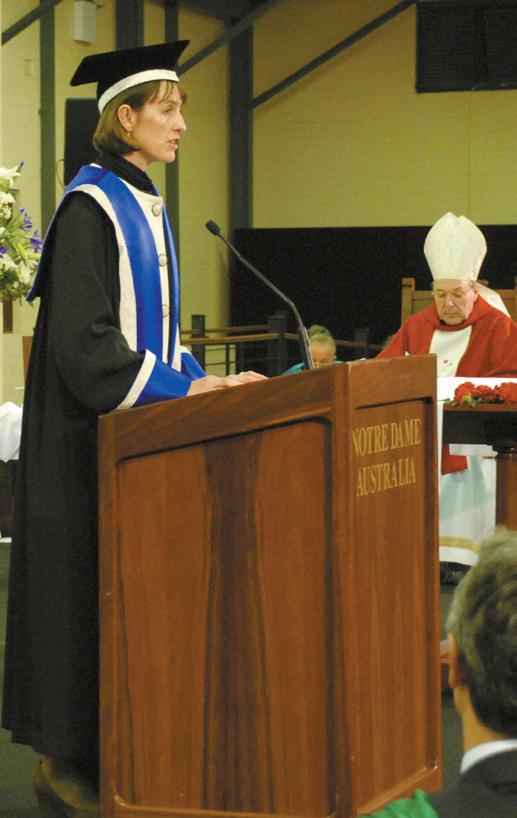









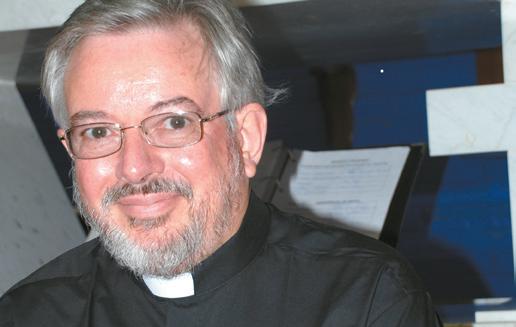
I,
PASSING OF THE BATON
George Pell of Sydney and Archbishop Barry Hickey were present at Notre Dame to witness the institution of the University of Notre Dame Australia’s new Vice Chancellor, Professor CELIA HAMMOND Page 7 The Parish - Pages 4-5 The Nation - Pages 6-7 Letters - Page 8 Perspectives - Pages 12-13 Panorama - Page 18 Classifieds - Page 19 Giftshop Sale - Page 20 INDEX DEATH OF A PROPHET
extraordinary contribution to the 20th Century of a moral giant: ALEKSANDR SOLZHENITSYN Page 16
THANKS OZ
Benedict XVI thanked Australian Catholics for World Youth Day. Page 9
Paul...
Cardinal
The
POPE
Pope
VISTA 1-4
MARRIED CLERGY?
Western Australia’s award-winning Catholic newspaper since 1874 - Wednesday August 13 2008 Perth, Western Australia $2 the Parish. the Nation. the World.
One married priest reflects. Page 14
THE R ECORD
-Bishop Matthew Gibney 1874
SAINT FOR THE WEEK
Juliana Falconieri
1270-1341
feast – June 19
Juliana was the only child of a wealthy couple in Florence, Italy, who had built the church of the Annunciation there. She refused to marr y and was enrolled as a tertiary with the Servite order ; her uncle, St.
Rice’s advice resonates with girls






Stewardship
Twentieth Sunday in Ordinary Time
The woman who sets the US foreign policy agenda around the globe spoke to the students of Mercedes College during her recent visit to Perth. Mercedes teacher Lyn Barker reports that the students were riveted.
BEFORE Condoleezza Rice, the United States’ Secretary of State arrived at Mercedes we were told that she was the most powerful woman in the world, yet when she spoke it seemed as if she were speaking to old friends.
She was an excellent example to the girls: gracious, calm and confident.
Dr Rice shared her personal life experience, advice for young women and heartfelt wishes for a better society.
It was so sincere and so powerful that 500 senior girls at Mercedes College, an inner city Mercy girls’ school, sat either cheering or clapping or in rapt silence.
Walking with Him Daily Mass Readings
17 S 20TH SUNDAY IN ORDINARY TIME
Gr Isa 56:1.6-7 A house of prayer
Ps 66:2-3.5-6.8 Bless us, O God
Rom 11:13-15.29-32 God’s mercy
Mt 15:21-28 Take pity on me
18 M
Gr Ezek 24:15-24 Ezekiel to be a sign
Ps/Deut 32:18-21 I shall hide my face
Mt 19:16-22 Treasure in heaven
19 T St John Eudes, priest, (O)
Wh Ezek 28:1-10 A man and not a god
Ps/Deut 32:26-28.30.35-36 Ruin is close
Mt 19:23-30 Who can be saved?
20 W St Bernard, abbot, doctor of the Church (M)
Wh Ezek 34:1-11 Flock left unfed
Ps 22:1-6 The Lord my shepherd
Mt 20:1-16 First will be last
21 T St Pius X, pope (M)
Wh Ezek 36:23-28 New heart, new spirit
Ps 50:12-15.18-19 A contrite spirit
Mt 22:1-14 My banquet prepared
22 F The Queenship of Mary (M)
Wh Ezek 37:1-14 I will lead you back
Ps 106:2-9 Rescue from distress
Mt 22:34-40 Two commandments
23 S St Rose of Lima, virgin (O)
Gr Ezek 43:1-7 Glory of God
Ps 84:9-14 A voice of peace
Mt 23:1-12 Be humble
If anyone present had some worries about US or Australian foreign policies, these were put aside to hear the wise and thoughtful words of a woman who said she was not concerned about being discriminated against because she was black and a woman; she was in a position of influence, and she had always been black and female.
There was a family feeling about this talk.
Stephen Smith, the Australian Foreign Minister, was there. His daughter Maddie is a year 10 student at Mercedes and she sat in the front row.
Dr Rice remembered Maddie and referred to her by name and also used the names of the head girl and members of staff.
Both Mr Smith and Dr Rice talked about the importance of relationships between nations, governments and peoples whilst stressing the importance of friendship between leaders on a human level.
Mr Smith had invited Dr Rice to Australia and together they sat on stage with the Principal, Mrs Sheena Barber, and spoke to the girls about life, the importance of study and learning languages, and the power of education to change the world.
Friendship was a theme of the discussions. When asked about her boss, President George W Bush, Dr Rice said he values lifelong friendship and has maintained and valued friendships from school and university.

have often been told how the pioneering Sisters of Mercy set sail from Ireland back in 1845 to establish a school in the Swan River Colony.
They found conditions harsh and yet they adapted and established schools and hospitals that still serve people today. Mr Smith said that people in power build on the efforts of those who came before and that real change happens incrementally.
For those who teach and lead in Mercy schools today it is a reminder that we follow in the footsteps of the Sisters who came before us. Her advice to the girls on choosing a path reminds us of the emphasis the Sisters of Mercy have always placed on girls’ education.
“Don’t let anybody define for you what you should be interested in,” Dr Rice said. “Your horizons should be limitless at this point. You have to find that special combination of what you are good at doing and what you love to do.”
As a gift to musically talented Dr Rice, a 12-member choir sang What a Wonderful World, and she and Mr Smith stood to clap their success.
She also received a history of Mercedes, Out of These Stones, written by Sr M Maureen Cream rsm.
After the assembly some Year 11 girls were asked what struck them as most significant in Dr Rice’s talk and question session.
Madison Rae commented:
“When Dr Rice said, ‘find a mixture of what you like and what you are good at for a career’, that made good sense.”





She also spoke of how she values friendship, and how her friends even buy clothes for her.
Dr Rice’s opinions about being open to that which presents itself in life, rather than sticking to rigid five year plans, impressed the girls who
Peter
Adrianna Manino said: “What struck me most about her was her advice to do something you love and are passionate about.”
Matilda Cunningham said:
“I thought Dr Rice was motivating, inspirational and passionate and liked her advice that you may not find your vocation it may find you.”
Luci Labrano said, “Unlike normal assemblies, I noticed how unusually still and attentive the girls were.
“They were sitting looking up and listening to Dr Rice and
Mr Smith and hung on every word.”
Because of WYD
Vocations
The Record will now be able to catch up on articles that would otherwise have appeared earlier.
Page 2 August 13 2008, The Record EDITOR
Rosengren cathrec@iinet.net.au JOURNALISTS
Barich abarich@therecord.com.au Mark Reidy reidyrec@iinet.net.au ADMINISTRATION Bibiana Kwaramba administration@therecord.com.au ACCOUNTS Cathy Baguley recaccounts@iinet.net.au PRODUCTION & ADVERTISING Justine Stevens production@therecord.com.au CONTRIBUTORS Joanna Lawson Debbie Warrier Karen & Derek Boylen Anna Krohn Catherine Parish Fr Flader John Heard The Record PO Box 75, Leederville, WA 6902 - 587 Newcastle St, West Perth - Tel: (08) 9227 7080, - Fax: (08) 9227 7087 The Record is a weekly publication distributed throughout the parishes of the dioceses of Western Australia and by subscription.
Anthony
Falconieri, was one of the seven founders of the Servites For nearly 20 years, Juliana lived a devout and useful life at home. In 1304 she formed a community of tertiary sisters who devoted themselves to prayer and good works in Florence. She is considered the foundress of the Servite community of nuns,
was canonized in 1737.
© 2008 CNS Crosiers
Alexis
and
© 2005 Saints for Today
Happiness Happiness is
way we live. Happiness is
gift that comes from within; it comes from a life of generous giving of self. At the heart of achieving happiness is being what we are called to be – grateful givers – sharing what we have received with the Church and the poor. For further information on how stewardship can build your parish community, call Brian Stephens on 9422 7924. 200 St. George’s Terrace, Perth WA 6000 Tel: 9322 2914 Fax: 9322 2915 Michael Deering 9322 2914 AdivisionofInterworldTravelPtyLtdLicNo.9TA796A division of Interworld Travel Pty Ltd ABN 21 061 625 027 Lic. No 9TA 796 michael@flightworld.com.au www.flightworld.com.au CRUISING • FLIGHTS • TOURS • Travel Dream LIVE YOUR FW OO3 12/07
not something we are given, but rather, something that results from the
a
Editor:
and
Week
Vocal: Mercedes students perform on stage as school principal Sheena Barber and US Secretary of State Condoleezza Rice look on.
Momentous: Condoleezza Rice greets a Mercedes College student during her visit to Perth.
Listen here: Condoleezza Rice addresses Mercedes College as Australian Foreign Minister Stephen Smith listens in.
WA’s own Rosary Bouquet set to turn 20
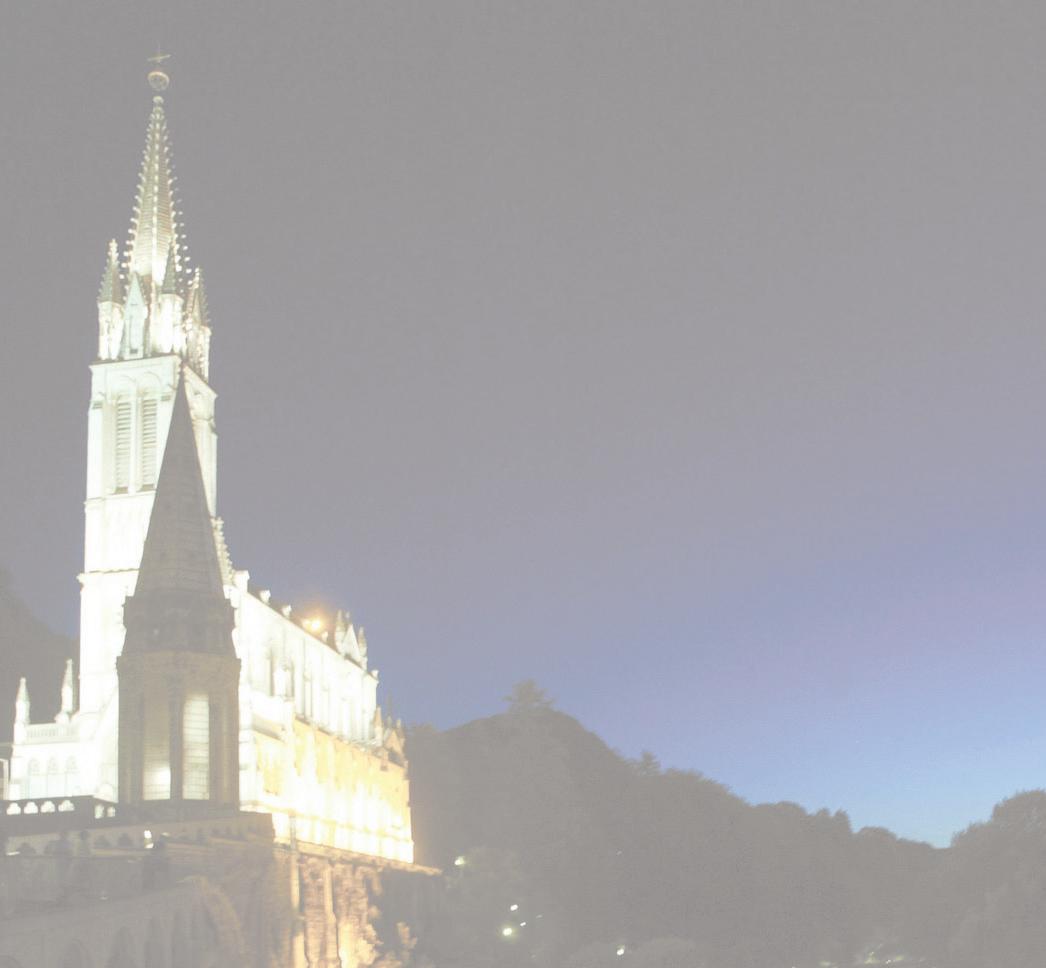
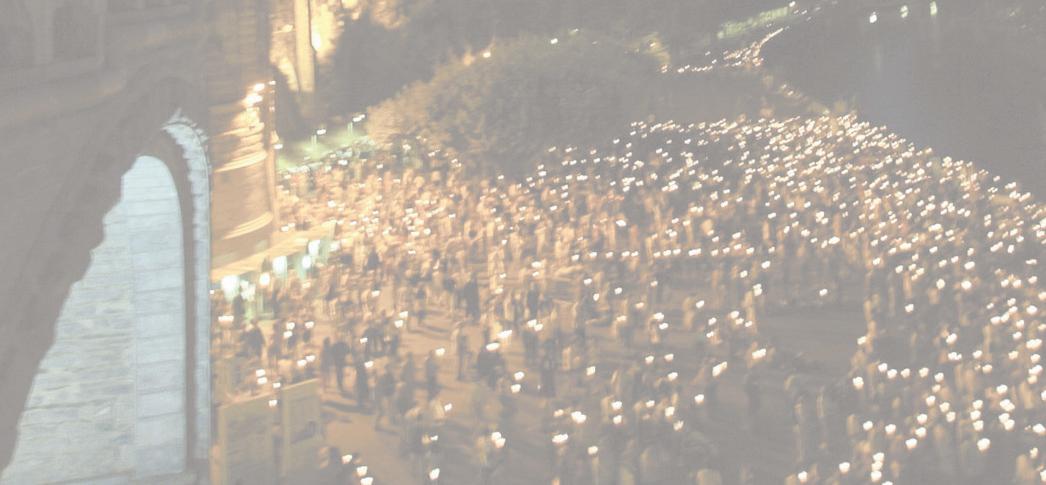




 ■ By Anthony Barich
■ By Anthony Barich
ONE day in 1989, Margaret Bowan was sitting around having a cup of coffee with a group of fellow Marian devotees in Northam when they thought it would be nice to find a practical way to honour Our Lady’s birthday.
Twenty years later, the 48-hour Rosary Bouquet has spread across the State as groups from far and wide have committed themselves to the 48-hour event, in accordance with Our Lady’s plea in each of her six apparitions at Fatima: “Say the Rosary every day to obtain world peace.”
A scroll with names of parishes, schools and individuals taking part will be taken up in a procession during a Mass on September 8 at St Joachim’s Pro-Cathedral in Victoria Park at 12.10pm, preceded by meditative Rosary led by Fr Paul Carey at 11.30am.
All WA Catholic schools have been invited to take part, and more and more schools have been marshalling their forces; while this treasure of the Church has enriched students.
Among the schools taking part this year, Good Shepherd Catholic Primary School in Lockridge will hold a whole-school Rosary on September 4. Children will have posters as they introduce the Mysteries and the school will purchase coloured plastic balls to make a human set of Rosary beads.
This will give a whole new meaning to the prayer commonly said at the end of the Rosary, after the Hail, Holy Queen: “Let us pray… meditating on the mysteries of the
most holy Rosary of the Blessed Virgin Mary, that we may imitate what they contain, and obtain what they promise.”
Indeed, the students will become the Rosary, in a sense.
For Archbishop Barry Hickey, the act of hundreds of school children praying the Rosary together is a treasure in itself.
He looks forward to celebrating the special Mass on September 8 for the 20th anniversary of the Rosary Bouquet.
“Let us hope that many people will be attracted to celebrate Our Lady’s birthday in this way, especially our school children, who we hope will develop a special devotion to Mary as we call for her intercession,” he said.
The Rosary Bouquet’s popularity and devotion has spread across the State.
Geraldton Bishop Justin Bianchini has also thrown his support behind the Rosary Bouquet.
A participant from Geraldton called the Bouquet a “very powerful gift for (Mary’s) birthday”, while one from Broome who represents a small group said that they are aware of a greater cause.
“By linking up with others throughout WA praying the Rosary, we feel part of our mother’s family because she is mother to us all,” the Broome participant said.
One from Albany said: “We are obeying Our Lady’s request in offering Rosaries to Her which links us with others in a chain of prayer around WA. It is the least we can do.”
Rosary Bouquet Coordinator Margaret Bowen Ph: 9341 8082 Fax: 9341 8083 Email: bowen@iinet.net.au Website: www.rosarywa.info






Wname, address and contact telephone number on the back and mail your envelope to: St Mary’s Cathedral Crucifix Competition


August 13 2008, The Record Page 3 Just over the Causeway on Shepperton Road, Victoria Park. Phone 9415 0011 PARK FORD, 1089, Albany Hwy, Bentley. Phone 9415 0502 DL 6061
JOHN HUGHES CHOOSE YOUR DEALER BEFORE YOU CHOOSE YOUR CAR... Absolutely!! Company Philosophy “We are a friendly and efficient company, trading with integrity and determined to give our customers the very best of service”. JH AB 015
JohnHughes
ith the current restoration and completion of St Mary’s Cathedral in Perth, The Record has begun the project of reconstructing the historical 1865 Jarrah floorboards removed from the Cathedral into something most befitting of this holy wood – The St Mary’s Cathedral Crucifixes. The Record would love to share this project with our readers and is giving away one exclusive 37cm St Mary’s Cathedral Crucifix, valued at $119.95. If you would like to go in the draw to win this piece of Western Australian Church history, here’s how to enter: Every week for seven weeks (beginning Wednesday 2nd July 2008) The Record Newspaper is placing one Cathedral Crucifix token in the paper. To enter, simply cut out and collect all seven tokens. Place all seven tokens in an envelope with your
LEEDERVILLE
Entries
27th
THE R ECORD Crucifix Token Week 6 Win! a unique and historic St
Cathedral Crucifix Rosaries for the Bouquet Friday September 5 - Sunday September 7 Name: Address: Phone: C ut out and send to Margaret Bowen 1/44A S c alby S t Doubleview Fax: 9341 8083 Friday 6-7pm 7-8pm 8-9pm 9-10pm 10-11pm 11-12am Saturday 12-1am 1-2am 2-3am 3-4am 4-5am 5-6am 6-7am 7-8am 8-9am 9-10am 10-11am 11-12pm 12-1pm 1-2pm 2-3pm 3-4pm 4-5pm 5-6pm Saturday (cont.) 6-7pm 7-8pm 8-9pm 9-10pm 10-11pm 11-12am Sunday 12-1am 1-2am 2-3am 3-4am 4-5am 5-6am 6-7am 7-8am 8-9am 9-10am 10-11am 11-12pm 12-1pm 1-2pm 2-3pm 3-4pm 4-5pm 5-6pm
The Record PO Box 75
WA 6902
must be received by close of business on Wednesday,
August 2008. All entries received by this date containing all seven tokens (tokens must be originals cut out from the paper and not copies) will be placed in the Thursday 28th August 2008 draw. The winner will be notified by telephone. Happy token collecting!
Mary’s
the Parish
Did WYD08 blow you away? Get ready to go even deeper
 ■ By Steve Gorddard
■ By Steve Gorddard
Taking the World Youth Day experience deeper, an exciting workshop series offers young (and not so young), an opportunity to plumb the depths of their faith for the real Truth.
SOME pilgrims were lucky enough to see the dynamic Christopher West in Sydney. Others regretted missing out and more still wished they could have been part of the WYD08. All will have another chance to hear his convincing message as a new seminar series begins.
Beginning August 29 at 7.15pm at St Thomas’ parish hall in Claremont, Created and Redeemed is a DVD workshop series by West that takes participants through the inspiring teaching of the Theology of the Body over eight Friday nights.
Already with plenty of interest in the event, I’ve heard many testimonies about how this teaching
has changed lives and deepened people’s faith, including my own.
When I first heard this teaching, there was something that resonated and stirred in me as I recognised the deep truth about God’s design. It inspired and convinced me a lot on the nature of love and our calling to love as God loves, which I believe is so critical to every Christian’s mission... there was a feeling of much excitement and joy.
I believe that part of the “missioning” of young people after WYD is for them to discover their identity and mission according to God’s original “blueprint” in creation. We’re talking about the most important questions you can ask about what it means for you to be a man or a woman.
The course gives a greater knowledge of Christ’s plan for marriage and sex, a greatly misunderstood aspect of what the Church teaches. With his trademark genuine conviction and charisma, West tackles the hard questions head on with answers that will astonish and inspire.
And with a fully catered event, kicking back with a cappuccino or vanilla latte to an entertaining and inspiring presentation doesn’t sound so bad.
Oh, and did someone mention pizza? It could never be the same as WYD08, but with the absent crushes of people and no lining up in the winter cold for half an hour before... that just may not be a bad thing. For more info, contact Stephen: 0431 228 630 or emai truelovewaitswa@yahoo.com.
Combatting homelessness
TOOTHPASTE, a toothbrush and a bar of soap top the list of the ten most wanted items for present street youth in Perth.
So says Lucinda Ardaghfrom St Vincent de Paul Society, which is fighting the good fight for the forgotten ones this winter while the State enjoys ‘boom times’.
“Most people have on their ‘wish list’ a new car or an overseas holiday, while youth living on the streets of Perth have everyday necessities like toilet paper and socks,” Lucinda says. The list of the ‘10 most wanted
items’, by Passages Resource Centre, SVDP and the Rotary Club, highlights the plight of those in poverty during National Homeless Persons Week, August 4-10, that combats homelessness. There are now 100,000 homeless nationwide with a quarter of that population children under the age of 18.
SVDP urges you to think about those less fortunate
Donate by calling 13 18 12 or www.vinnies.org.
au. For welfare assistance call 1300 794 054.

Represented in WA by Ron Raymond at
A prospector laid to rest in a Goldfields ghost town
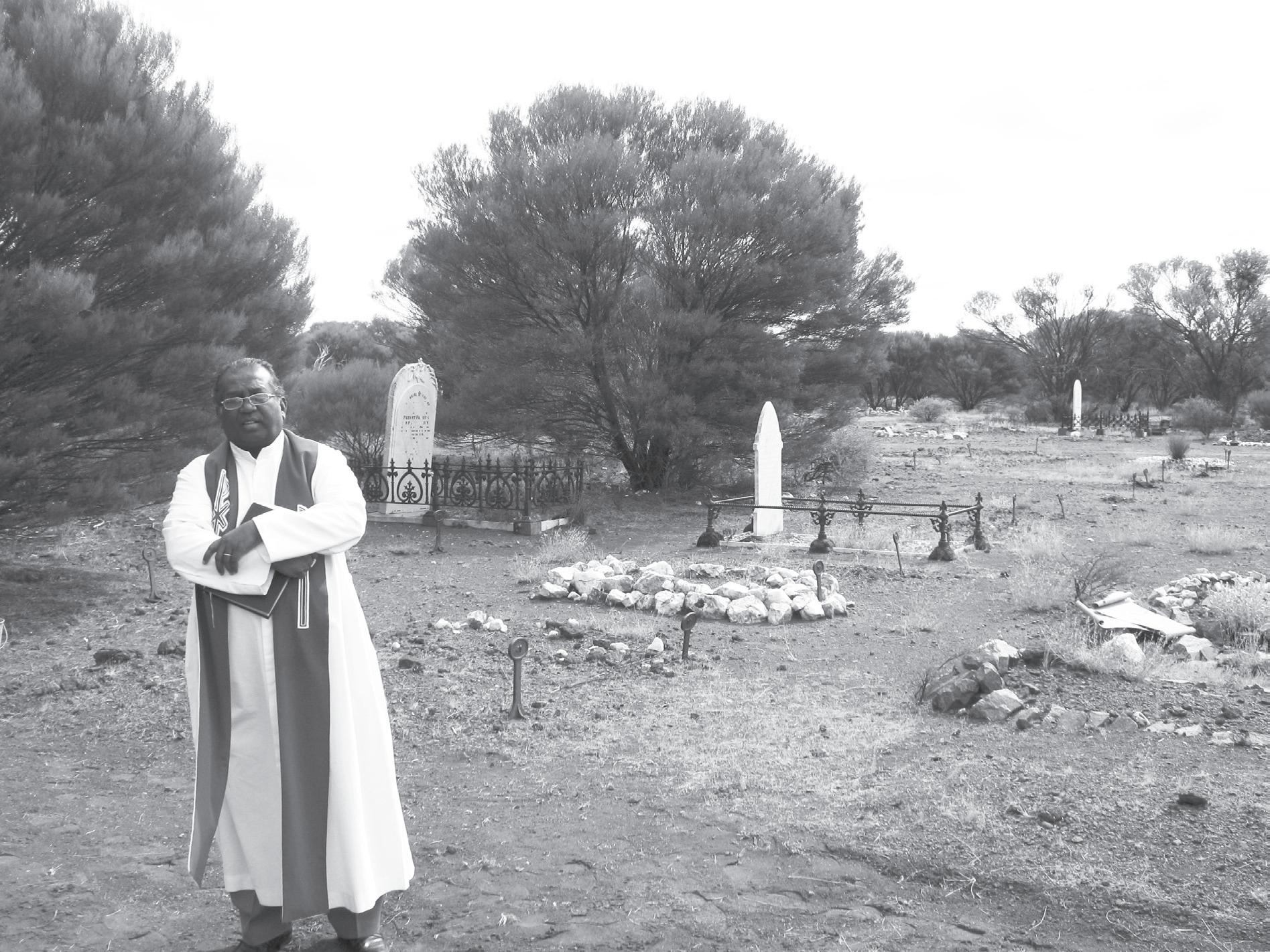
A prospector is laid to rest in a Goldfields ghost town cemetery
■ By Harry Argus
ON July 31, roughly 60 people gathered around a gravesite in a lonely town in rural WA to remember a faithful friend.
It was a moving moment; one which has not been seen since 1926, but it reflected that when it boils down to it, the Church is about family. Family and friends had travelled from various towns in the State to Kookynie, 8km north-east of Menzies, to attend the funeral of the late Peter Smith Lloyd in the town’s cemetery.
Peter was a local prospector who had lived in the district for many years, and wanted to be buried in the peaceful Goldfield’s outback ghost town that he so dearly loved.
Fr Joseph Rathnaraj, parish priest of the Kalgoorlie-Boulder parish, travelled 200km to the town to
the Parish the Nation the World
www.allenorganswa.com
conduct the very moving funeral service, which was the first Roman Catholic burial since William Spicer, aged 43, died of kidney failure on May 31, 1926.
During the prayerful funeral service, which was set amongst the beautiful mulga trees that grow naturally in the cemetery, the wonderful life of Peter was expressed in three eulogies, which were spoken by family members. Burial records indicate that there have only been six other burials conducted in the Kookynie Cemetery since William Spicer’s funeral in 1926. They were in 1926, 1929, 1934, 1936, 2000 and 2002.
The population of Kookynie has been very small in numbers since the First World War, and at the present time about fifteen residents live in the town with one hotel.
Before the First World War the town’s population rose to about 7000 people with many gold miners working in the district.
The town at that time had a hospital, seven licensed hotels, five coffee lounges, a brewery, a local Shire Council and a mayor.
Another similar funeral took
place 11 years ago on April 24, 1997 at the cemetery of the little Goldfield’s ghost town of Widgiemooltha, situated on the highway half way between Coolgardie and Norseman.
Fr Peter Toohey SSC conducted this moving Catholic funeral service, and laid to rest the mortal remains of Eoin McLean McLeod, aged 66, who was a local resident of the little gold mining town of about 20 people.
This funeral was the first Roman Catholic burial in the Widgiemooltha Cemetery since Mary Doyle, aged 83 died on July 13, 1945.
Her family at the time owned the local hotel in the small town. The location of the Widgiemooltha Cemetery is very interesting. Due to the town of Widgiemooltha being located amongst hard diorite hills, the cemetery is located six kilometres away from the town on a scrubby sand island one kilometre in from the shore of Lake Lefroy.
Mourners and visitors need to walk across the mainly dry salt lake to reach the island.
Rest in Peace.
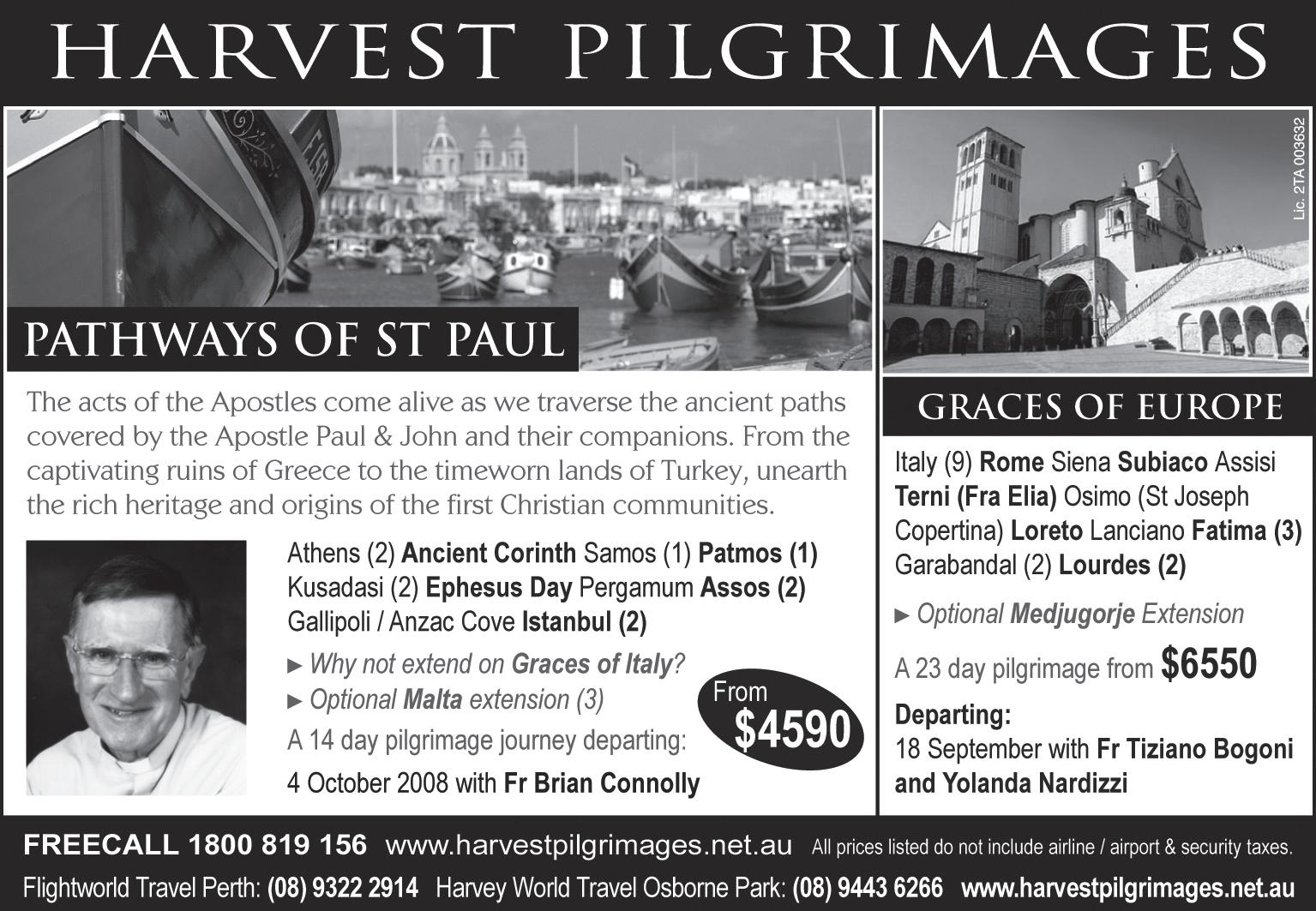
Page 4 August 13 2008, The Record
��������������������������� ����������������
DIGITAL
ORGAN STUDIOS (WA) 14 AMERY
COMO 9450 3322
ALLEN
COMPUTER
ST.,
Remembered, and prayed for: Kalgoorlie-Boulder parish priest Fr Joseph Rathnaraj stands at the lonely gravesite where prospector Peter Smith Lloyd was laid to rest in Kookynie’s cemetery.
PHOTO: HARRY AR GUS
Mufti of Osborne Park nurtures mother parish
■ By
Anthony Barich
FATHER Michael Gatt is known as the Mufti of Osborne Park.
The nickname came shortly after he moved into the parish – his sixth - on February 3, 2000, when a parishioner told him that’s what he was being commonly called.
Apparently he was the only Catholic parish priest who has a church and a mosque next to each other.
Then there’s the curious fact that St Kieran’s Church in Osborne Park
Gatt says he had been known as the Tidyman, a title he was “quite comfortable about”.
In fact, on day one at the parish he brought with him his handyman kit and started work putting his house in order.
St Kieran’s is a parish that has proved something to ponder greatly for Archbishops Patrick Clune and Redmond Prendiville for 30 years – from 1907 to 1937 when the par ish was erected in its own right.
Since then it has grown larger and, like a family, other parish es were created in Scarborough,
Park and Wanneroo were also created at a later date.
But Osborne Park – the “Mother parish”, as Fr Gatt calls it – remains strong, despite branches breaking off it to form new parishes over the years. It seems to have a hold on those who have been baptised there by one of the 11 priests who have resided there since 1937.
“It’s interesting to know that many
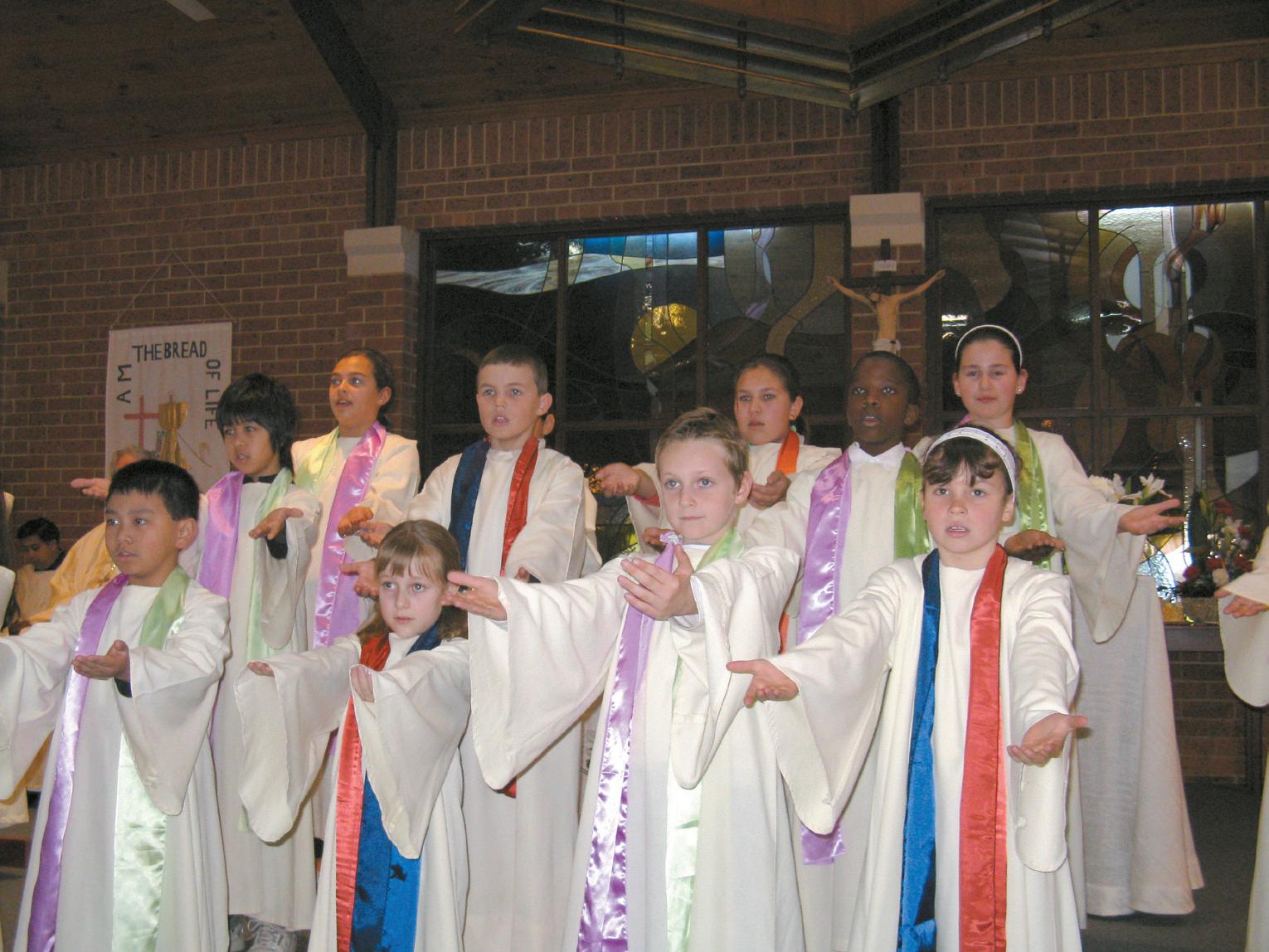


July 23 celebrating the new church’s 25th anniversary.
Present at the Mass was Perth Auxiliary Bishop Donald Sproxton, who was there when the refurbished parish centre was blessed in November 2004.
Proof that St Kieran’s has grown as a thriving, loving community is the amount of positive feedback Fr Gatt received after the Silver Jubilee Mass. One woman, who called her
“St Kieran’s brings back memories for me of our grandson Michael’s baptism...” and proceeded to update the parish priest on the movements of said grandson over east.
Like many parishes, St Kieran’s has its stalwarts: those who go about their business unbeknown to most ensuring the parish runs smoothly.
“I would like to acknowledge the good work of so many other


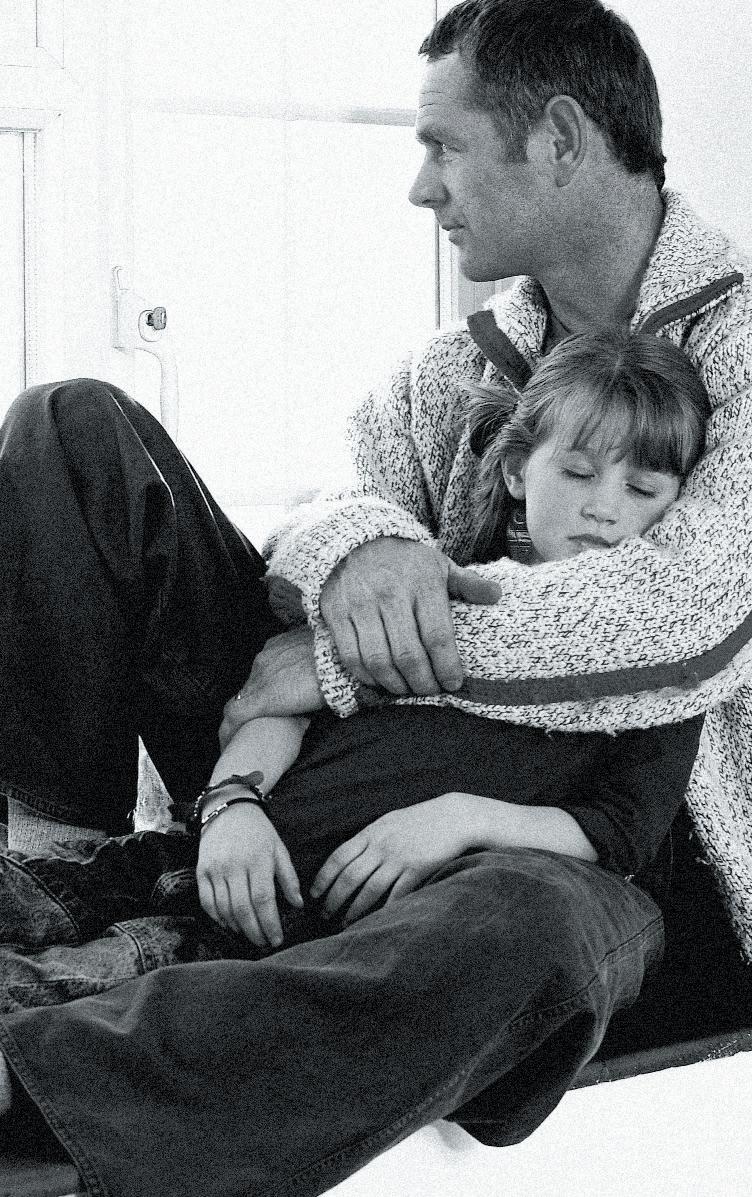
August 13 2008, The Record Page 5 the Parish This insurance product is issued by Catholic Church Insurances Limited ABN 76 000 005 210 AFSL 235415. The Product Disclosure Statement is available from our website or by phoning us. You should read and consider the Product Disclosure Statement before deciding to buy or renew this insurance product. Secure. Catholic Church Insurances is not your average insurance company. Our name alone should tell you that. You can trust us to be there with honest protection when it counts most. If you’re looking for a genuinely different kind of insurance company, one that provides value and cares for you and your family, you’ve found it. Call us today for an obligation free Building and Contents Insurance quote and affordable Personal Accident Insurance. 1300 655 003 www.ccinsurances.com.au How an insurance company is supposed to make you feel. CCI015_Secure145x157 27/7/05 11:32 AM Page 1
Blessed are the children: Perth Auxiliary Bishop Donald Sproxton blesses an infant parishioner during the Mass celebrating Osborne Park’s 25th anniversary.
PHOTOS COURTESY OF SAM DI NUCCI
Making it real: Students from St Kieran’s Primary School take part in liturgical movement during the Mass celebrating St Kieran’s Church’s 25th anniversary.
Delicious: St Kieran’s parishioners share that which often brings people together - food - at the community gathering after the anniversary Mass for St Kieran’s Church.
Family love: Parishioners, left, savour the family environment fostered in the parish at the gathering after the celebratory Mass. Right, Father MIchael Gatt stands behind the cake.
the Nation
State school parents feel ‘marginalised’ in parishes
 ■ By Joanna Lawson
■ By Joanna Lawson
CATHOLIC parents who send their children to state schools may feel marginalised in their parish communities.
Dr Carmel Suart, a consultant on the Catechist Service Team for the Catholic Education Office, researched the ways in which families who do not school with the Catholic system nurture faith development in their children. The research paper, entitled Nurturing Faith Within the Catholic Home: a Perspective from Catholic Parents who do not Access Catholic Schools, sampled families from metropolitan and country parishes and included 36 parents.
Amongst a range of findings which covered liturgical education, moral formation and spiritual challenges within the families, Doctor Suart found that they often feel a sense of being on the outer of parish life in spite of the various programs that have been developed by the Church which are designed to include all families. She said that the problem was not that families who don’t attend the local Catholics schools are not welcome, but that the families are not aware of what is available to them, and that there should be a focus at both diocesan and parish levels to promote social and catechetical
MacKillop on a coin
■ By
Anthony Barich
AUSTRALIAN World Youth Day patron, Blessed Mary MacKillop, is the first person featured on a new series of Australians coins. Superannuation and Corporate Law Minister Nick Sherry told The Age newspaper in early July that as Australia’s ‘saint in waiting,’ Mother Mary MacKillop was a fitting choice to launch the series.
Mary MacKillop - the foundress
Orthodox create Eparchy
■ By Anthony Barich
THE Romanian Orthodox Church has set up a new Eparchy for Australia and New Zealand, with Dr Mihail Filimon enthroned as its new bishop at the Cathedral of Ss Peter and Paul in South Carlton, Victoria on June 29.
He was enthroned by Mitropolit (Archbishop) Laurentiu of Ardeal.
His consecration took place in the Cathedral of Ss Constantine and Helen in Bucharest on February 20, Palm Sunday according to the old calendar, by Mitropolit Nifon of Targouiste.
The decision to create a special episcopate of Australia and New Zealand was made at the Holy Synod in Bucharest on March 5, when it was deemed their popula tion warranted their own bishop.

The new bishop will over see significant growth in the Romanian Church, with new parishes to be established in Hobart, Darwin, Parramatta and Newcastle, while a new priest must be found for Auckland after Fr Michael Cumbias died during prayer on July 4.
A new priest will also be assigned for Tokyo, which also comes under the Eparchy, as there are significant numbers of Romanian nationals studying and working in Japan who require a place to worship.

used St Luke’s Anglican church in Maylands until 2006 when they moved to a building they bought in Koondoola in Perth’s northern
Parishioners of his Holy Trinity Church raised $120,000 to buy the building, which used to be a veterinary clinic behind the local shopping centre.
It is humble beginnings, but Fr Doru says the parish is growing, and the enthronement of a new bishop will re-energise the Episcopate.
involvement. “Parishes have to be mindful of those parents within their community who do not have the support or resources offered to parents in the Catholic school system,” said Dr Suart in the thesis. “…parishes have a responsibility to identify who their marginalised members are and put into place support structures that will enable them to feel part of the community as well as educate them for the task at hand.”
Dr Suart is herself a mother of three and was prompted to choose the topic of faith building within families who choose state schooling, because as a contributor to the current curriculum for the Catechesis Program, she became aware of the lack of research outside the Catholic school system.
“I was trying to work out how to support parents in the home, and the research came from there,” she said.
As a result of the research, Dr Suart makes several observations, including that many of the parents felt themselves inadequate in terms of faith education and were anxious for further support from their parishes to assist them in nurturing the faith of their children. She recommends that an Archdiocesan agency be set up specifically to facilitate home catechesis in all Catholic families.
A summary of the findings has been submitted to Archbishop Hickey for his consideration.
of the Sisters of St Joseph of the Sacred Heart, known as the ‘Brown Joeys’ and the ‘Josephites” - has been depicted by Royal Australian Mint coin designer Vladimir as “guiding future generations”.
“Mary was an exceptional Australian woman who stands as an example of great courage, trust and compassion, and as our first saint, she will forever inspire our nation,” Senator Sherry said.
Born in Fitzroy, Victoria as the eldest of eight children in 1842, Mary MacKillop set up a parish school for underprivileged children in a disused stable in Penola, South Australia in 1866. She was beatified in 1995.
Previously, all priests of the Church were ordained in Romania and a bishop would only visit Australia every two to three years.
But Fr Doru Bucur, Perth parish priest and Protoierei (coordinator of all Australian priests)who was present at the enthronement with priests from Sydney, Adelaide and New Zealand - said the tyranny of distance and rising Romanian population made it necessary to have a bishop.
He said Romanian Orthodox members consider bishops an important link between the past and present, as they are the suc-
cessors of the Apostles, and he often gets requests to meet the bishop.
A bishop is needed locally for important feast days, patron saints of churches, ordinations, and consecrations of churches and to deal with government authorities.
The first Romanian Orthodox parish in Australasia was established in 1972 and in 2006, Fr Dumitru Coman, a parish priest in Melbourne, was made the Vicar of the Romanian Orthodox Vicariate of Australia and New Zealand, which was raised to the status of Eparchy earlier this year.
The Perth branch started in 2000, and Fr Doru was appointed parish priest in 2003. Worshippers
PRINCIPALSHIPS
They welcomed the new bishop at a special Mass on June 22 attended by over 150 and concelebrated with Fr Doru at Holy Trinity with Catholic Archbishop Barry Hickey of Perth assisting.
Fr Doru said the new bishop won over the locals’ hearts with his “kindly nature”, and said his parishioners now feel more spiritual protection knowing they have their own bishop.
Fr Doru said Archbishop Hickey congratulated Bishop Filimon on his new mission and said he appreciates the Romanian bishop’s efforts to promote the Romanian family tradition, faith and language in Australia’s multicultural society.
ASSUMPTION CATHOLIC PRIMARY SCHOOL
Assumption Catholic Primary School, Mandurah, is a double stream, co-educational school with an enrolment of 503 students. The school, which was opened on its present site by the Presentation Sisters in 1982, is located 72 kms south of the city of Perth and is easily accessible via the Kwinana Freeway or new rail system.
The school is in its fourth year of the RAISe (Raising Achievement in Schools) program. A strong emphasis is placed on literacy and assisting children in their learning and future development will seek to enhance the numeracy aspects of the curriculum.
Building community support structures is occurring with a focus on Aboriginal education, an optional extra kindergarten day and the future incorporation of an after-school child care service on the school grounds. Parents are trained in the Volunteers in Education program to provide an extra source of parent help in the classrooms.
The School Board and Parents and Friends’ Association work tirelessly to provide facilities and community spirit within the school.
KEARNAN COLLEGE
Kearnan College, Manjimup, is a co-educational College situated 300 kms south of Perth. The College caters for students from Kindergarten to Year 12 with a middle school component. The junior school student enrolment is currently 180 and the secondary enrolment is 128.
The College was founded by the Sisters of St Joseph of the Sacred Heart in 1923 and named after the first Parish Priest, Father Francis Kearnan. The College operates in partnership with parents, who are regarded as the prime educators of their children.
Kearnan enjoys good facilities and the continuous upgrading of the buildings and grounds has been a priority of the College Board. The junior school and secondary components are on the same campus.
A broad and comprehensive curriculum meets the needs of all students. The junior school participates in the RAISe (Raising Achievement in Schools) initiative which provides a strong literacy program to meet the needs of all students. Information and Communication Technology is integrated into the curriculum and a health, fitness and wellbeing program is a priority.
The successful applicants will be expected to take up these positions on 1 January 2009.
Applicants need to be practising Catholics and experienced educators committed to the objectives and ethos of Catholic education. They will have the requisite theological, educational, pastoral and administrative competencies, together with an appropriate four-year minimum tertiary qualification, and will have completed Accreditation for Leadership of the Religious Education Area or its equivalent. A current WACOT registration number must also be included.
The official application form, referee assessment forms and instructions can be accessed on the Catholic Education Office website www.ceo.wa.edu.au. Enquiries regarding the position should be directed to Helen Brennan, Consultant, Workforce Relations & Development Team on (08) 6380 5237 or email wrd@ ceo.wa.edu.au. All applications, on the official form, should reach The Director, Catholic Education, Catholic Education Office of WA, PO Box 198, Leederville 6903 no later than 22 August for Assumption Catholic Primary School and 29 August for Kearnan College.
POSITION: PRINCIPALSHIPS:
Page 6 August 13 2008, The Record
Welcome: Archbishop Barry Hickey congratulates the new head of the Romanian Orthodox Eparchy of Australia, Bishop Mihail Filimon, as Perth Romanian Orthodox priest Fr Dohu, also shown below, looks on.
Angels: Students at a Catholic Primary School sing Christmas carols. However a WA study has found Catholic parents with children in state schools feel marginalised at parish level.
PHOTO:
CNS
the Nation
New Vice Chancellor sets out her vision
■ By Anthony Barich
THE University of Notre Dame Australia’s new Vice Chancellor Celia Hammond has pledged to lead with her head and heart guided by faith, she told an audience of 400 at her inauguration at its Fremantle campus on August 4.
Prof. Hammond, 39, said that becoming UNDA’s third Vice Chancellor - “taking the torch” from Catholic education “champi on” Peter Tannock AM - was daunt ing, but believes she is in good stead having benefited from his mentor ship over the past four years.
Prof. Hammond, the daughter of the former Chief Judge of the District Court of Western Australia, Judge Kevin Hammond, has worked in private legal practice in Perth as well as in senior administrative and teaching positions at UNDA, includ ing as Deputy Vice Chancellor.
Dr Tannock, who has been chair of the Australian Schools Commission, the National Catholic Education Commission and the WA Football Commission and director of Catholic Education in Western Australia, retired on July 31 having served as UNDA Vice Chancellor since 1992. Prof. Hammond, a law yer and mother of three boys, said she would lead the university with a “light touch and a strong hand... depending on the circumstances”.

Having experienced love “at every moment” in her life, espe cially in Jesus, “whom I recognise as God’s unique gift of love offered to the whole world”, she said love is the cornerstone of UNDA’s work and the framework through which all the university’s fruits must be learned. “I believe that education is one of the most valuable enabling and empowering opportunities that can be offered to people,” she said.
“However, knowledge and learn ing without a context or framework of humanity is hollow. Knowledge without love and respect is not wis dom.” She said the role of UNDA is not simply to transmit infor mation or create knowledge but to always teach and educate in an environment that encourages peo ple to seek understanding, wisdom, to serve and to live “in a way that fulfils everyone’s higher purpose”.
During his homily in the Mass celebrating the inauguration of Prof. Hammond at UNDA’s Drill Hall, Cardinal George Pell of Sydney, who helped set up a campus in his archdiocese, said the Catholic university’s role is to protect and advance human dignity and culture through its teachings, research and services offered to the local, nation al an international communities.
Quoting the late John Paul II’s 1990 Apostolic Constitution Ex Corde Ecclesiae (From the heart of the Church), he said Catholic uni versities have institutional auton omy and guarantee academic free dom within the confines of truth and the common good. Noting that Notre Dame is a lay-led Catholic university, which “we rejoice in”, he said that Ex Corde Ecclesiae recognises that Catholic universi ties depend “to a great extent on the competent and dedicated service of lay Catholics”.
“For John Paul II this was a ‘sign of hope’ and ‘a confirmation of the irreplaceable lay vocation in the Church and in the world’,” he said.
“Certainly a Catholic university has to be committed to a systematic exploration of the ‘God question’, of the relationship between faith and reason, of the interaction of Catholicism and culture today as well as in the past.”




August 13 2008, The Record Page 7
PHOTOS: FIRST MATE PETER ROSENGREN, CREW TO BENEDICT THE TERRIBLE AND KATERI THE
Blessings: Archbishop Barry Hickey gives his blessing to Prof. Celia Hammond during her inauguration Mass as the University of Notre Dame Australia’s new Vice Chancellor.
TERRIBLY BEAUTIFUL
A special occasion: Archbishop Barry Hickey presides over the Mass celebrating the inauguration of new UNDA Vice Chancellor Prof. Celia Hammond at the university’s Drill Hall in Fremantle. Also concelebrating were Cardinal George Pell of Sydney, Bishop Gerard Holohan of Bunbury and over 20 local priests.
BRILLIANT PETER ROSENGREN
Above three photos: Chancellor Michael Quinlan vests Prof. Celia Hammond as her predecessor Peter Tannock helps out, then applauds as she shakes the Chancellor’s hand. PHOTOS: THE EXCEEDINGLY
Perspectives
editorial letters to the editor
Vote celebration turns sour
Do Western Australians realise that many of the politicians who will be elected in three weeks time will not actually take office for another seven months, in May 2009?
This should have been the most welcome State election since 1890 because it will be the first time we will have an election in which everyone’s vote for the government-forming Legislative Assembly will have the same value.
Sadly, this celebratory occasion has been turned into a cynical betrayal of democratic decency. Premier Carpenter’s decision to call an election on September 6 has no justification in reason or politics, and his public attempts to justify himself contain neither reason nor truth. He has recently presented himself as the man to finally make the Labor Party honest, but this objective is now gone.
All he had to do was to govern in a proper manner until the proper time, next February or March, when he would have reaped the rewards of the first ever onevote-one-value election. It is a principle the Labor Party had championed since its formation, and there is little doubt that Labor would have won that election. Instead, Premier Carpenter has turned it into an election he does not deserve to win, and one for which he will not be honoured regardless of the result. His decision to call the election was bad, his attempted justification of it was appalling, and revealing. He started with the claim that “for weeks” there had been “continuous speculation about an election” – not acknowledging that he and his party generated nearly all of it. That aside, when did speculation about an election become something for which the public should be punished with an early election? We know this government does not like freedom of information, but is it now targeting freedom of speculation?
He followed up with global or universal generalisations: “every day, everything we’ve done, everything I’ve said has been discounted … and that’s not good for everyone (government, business and the general community). Why didn’t he end this imagined ingratitude towards his noble words and deeds by announcing in Parliament that the election would be held next year? Because no one would believe him. If he believes that no one has any faith in him, he should not be offering himself for re-election.
THE RECORD
PO Box 75 Leederville, WA 6902 cathrec@iinet.net.au
Tel: (08) 9227 7080
Fax: (08) 9227 7087
It needs to be said that these sequences of universal or global generalisations are understood in the world of communications as clear danger signs. The words themselves have their place, but when they become a pattern they reveal a mind that cannot absorb the world around it with accuracy and cannot communicate it effectively. It is a common problem: ‘you always pick on me’, ‘you never believe a word I say’, ‘you criticise everything I do’, ‘you never say a kind word’ etc, etc, the endless language of endless arguments. It is not confined to family arguments. It is common in business and politics and makes the beneficial exchange of information and ideas almost impossible. As a way of justifying an unjustifiable early election, they are a grim warning of what the future may hold.
Consistent with this pattern of inadequate communication is a lack of consideration for the feelings, thoughts and needs of others. The premier’s defence of his early election call has been characterised by his self-interest and no mention of any benefits, real or imagined, for the public at large. Even after the opening days, when the premier was confronted by the nine per cent swing against Labor in the Northern Territory’s early election, his defence of himself was based on himself, not on the needs of others.
“We needed to get that situation sorted out, give some certainty, give some clarity, end the cynicism, and that’s what we have done, “ he was reported as saying. Apart from the laughter that greeted his claim to have ended the cynicism about premiers who call early elections, the sentence is meaningless. It is just another example of a mind that does not understand what is going on and cannot understand the effects of his own actions. For example, in a democracy, elections are not designed to give certainty, except in a Mugabe style democracy. In a real democracy, elections are designed to create the opportunity for change, the opportunity for people to decide who will govern, not for a government to engage in underhand tricks in order to entrench itself.
What Mr Carpenter hasn’t understood about his “certainty and clarity” is that if he wins an election so dishonourably called and so dishonourably defended, for the next four years there will always be a legitimate claim that he is premier only because he did not give the people a reasonable chance to make an informed choice. His pretence about seeking certainty and clarity is also overturned by the fact that the Legislative Council will not change until May 2009. MLCs elected for the first time on September 6 will have to find something to do until they actually become Members of Parliament seven months later.
Only a premier who is the father of four daughters and yet thinks that prostitution is a suitable occupation for other people’s daughters could have so debased what should have been an historical moment of decency in our democracy next February.
Congratulations
Just want to congratulate you and your staff for the great coverage of the World Youth Day week. It was very uplifting especially after the denigrating “discussions” presented by some media channels – notably 9 and ABC (predictable, so why was I hopeful?)
You must have been tremendously busy putting it all together but you did an admirable job. I bought several copies and passed them on to non-Catholic friends and one overseas.
Anne Maurel Perth
What a week
WYD was extraordinary for Australians and Catholics around the world. World Youth Day 2008 was an outstanding success and I am sure that the many announcements made through the Church and by the Pope will continue to resound in people’s minds, hearts and souls for many years to come.
The announcement on Monday 21 July 2008 of a Resident Ambassador to the Holy See and the choice of the Hon. Tim Fischer AC to fill that role is an excellent one.
This appointment is a first for Australia and one which places our nation on an equal footing with our allies and other countries of the world.
The Hon. Tim Fischer AC has a distinguished record of achievements in all tasks that he has undertaken, including his term as Deputy Prime Minister, Minister for Trade, Federal Member for Farrer and as a National Serviceman in Vietnam. Mr Fischer has also had a strong serving interest in organisations such as the St Vincent de Paul Society, The Fred Hollows Foundation and Autism New South Wales.
Tim is a man of great integrity, compassion and strength. Tim
Thanks from Victoria
Many thanks for the complimentary copy of your “Special WYD08 Souvenir Edition” of The Record. It gives a great coverage of WYD events and makes wonderful reading.
From the Parishes of Mooroopna/Shepparton, Victoria.
will be an effective and diligent representative for Australia in the Vatican and I wish him every success.
I congratulate the Government on this announcement, which enjoys bi-partisan support and is one which I have supported wholeheartedly.
C Ellison Senator Western Australia
A Mary and Martha moment
It was Friday afternoon at fifteen minutes to four. I was sitting on a bench at the periphery of Forrest Chase waiting for the WYD celebration at 4pm as advertised.
I took delight in watching the young people preparing the stage and surroundings for the WYD cross and icon and the public that would attend the celebration.
There was much joy and camaraderie in the air. I was thrilled to be part of such a celebration in the heart of the city.
At 4.15pm the cross and icon had still not arrived and it seemed that nothing was about to start so I approached a pleasant young lady in the information tent and found out that the celebration was only due to begin at 6pm.
She told me that the cross had however arrived and pointed to the van at the other end of Forrest Chase.
As I could not remain until 6pm I thought I would go and have a look at the cross and icon that I had not yet seen up close. A number of youth were standing around the van like a rugby line waiting for the ball to come out of a scrum.
Then I noticed a familiar face that I had met and not seen for more than two years. I will call him Joshua.
I walked towards Joshua who was down on his haunches, squatting so that he could be at eye level to an aboriginal gentleman who could be around forty
who was sitting on the concrete floor and looked as if he had too much to drink and could be one of the 300-plus homeless living in the city centre. I will call him John.
Joshua was completely engaged with John. For Joshua nothing else or no one else seemed to matter or even exist, he was completely present to John.
I stood back not wanting to intrude into this sacred encounter.
I watched engrossed as Joshua conversed with John with such compassion, sincerity and love.
Joshua treated John with such respect and dignity, as an equal. I saw John’s eyes light up and it warmed my soul. It was such a Jesus-like moment.
I saw John being touched as if Jesus himself was conversing with him. John wanted to know what was going to happen in Forrest Chase.
Joshua explained and invited John to be part. John was smiling. He was happy and said he would definitely be present. And then there was a kind of Mary and Martha moment to disturb the encounter.
A friend of Joshua came and impatiently urged Joshua to come and help with the cross. But Joshua remained with John, he had chosen the better part, he wasn’t going to allow himself to be drawn away.
He continued with John for a while and then gently excused himself.
John was satisfied. He had his encounter with the Lord.
I was able to have a few words with Joshua but my mind and heart was on the encounter. It was only as I was walking to the station that I fully realised that I had indeed seen and encountered Jesus in Forrest Chase.
Gerald Searle
Ashby
PS: I look forward with anticipation for The Record each week, which I read with interest. Thank you and your team for bringing us such good news and stories.
Keep it up.
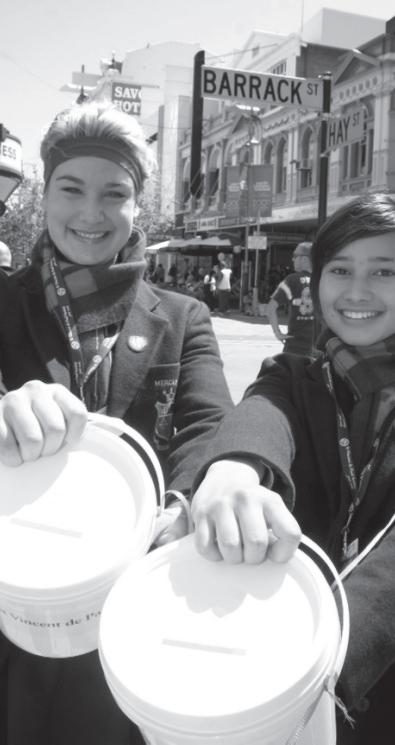


Page 8 August 13 2008, The Record
LETTERS TO THE EDITOR
Around t he tabl e dnuorA t eh lbat e
We want your story! experience of an amazing event - WYD in Sydney. Subject: What I got out of WYD/What was special about the experience for me. Length: 150 words maximum. Send also: your photo (must be high-resolution.) Send to: production@therecord. com.au Revised deadline: August 20 The Parish. The Nation. The World. Read it in The Record
Scientific approach draws in youth
■ By Anthony Barich
POPE Benedict XVI’s scientific approach to explaining the faith to the secular world has sparked a global network of youth dedicated to doing just that, and now it looks likely to spread to Australia.
It all started during World Youth Day 2005 in Cologne, Germany, when the secular media’s coverage could be divided into two kinds: young attractive youth interviewed who believe the archaic and autocratic Church has got it all backwards; and Church supporters who were invariably represented by elderly vicars or bishops.
Nathaniel Liminski, now 22, who at the time was doing his internship with a good friend at the German Bundestag (parliament), was appalled.
He was apalled especially because he knew the media simply didn’t give genuine believing young Catholics a face.
This generation, who have deep questions about the important things in life and actually do see merit in the teachings of Benedict XVI, are ‘Generation Benedict’. So Nathaniel and 11 others from Mexico, Italy, the United States, France and Germany started a youth network of the same name.
Doing interviews for EWTN during WYD05, Nathaniel found that youth outside the Church responded to Benedict’s words.
They felt that they did not need to have a Catholic background to be accepted by Christ and His Church.
Most importantly, Benedict XVI communicated to them clearly and easily.
“Young people today aren’t interested in being labelled ‘conservative’ or ‘progressive’, right or left-wing,” Nathaniel said.
“They just want answers, and look to any public figure for them, be they popes, comedians or movie stars.
“With John Paul II, the Church seemed to move on from its image in the ‘80s of being like ‘burnt earth’, where no one seemed to be listening, to becoming one of these authorities that youth now count as being one of these populist figures they listen to.”
To mark the anniversary of Benedict’s visit to Cologne for WYD05, they launched their website, www.generation-benedikt.de, and started bi-monthly workshops where they discussed Church teachings on life issues then invited a secular journalist in to detail how their industry works.
After that, the workshop attendees – up to 40 searching youth who come from around Germany – would come up with ideas of how to convey the Church’s teachings to the secular media.
One such idea that sprang up as a result of one of these meetings was a website where people who had almost had abortions but decided not to, or even those who did, and others with personal stories, told their testimonies in a brief, media bite-like format, easily digestible for even the least-discerning member of the public.
Having worked with the local youth ministry, Nathaniel was close to Cologne’s Cardinal Joachim Meisner, who lobbied hard to host WYD05, who was, in turn, close to Pope Benedict, previously the Archbishop of Munich.
Nathaniel and his 11 co-founders of Generation Benedict presented to the pontiff, via Cardinal Meisner, 12 searching questions about the faith, like: “What is responsible sexuality? Am I missing anything when I’m a faithful follower of Christ? Am I just imagining there is a God when I pray? Is there one Truth?”
Nathaniel says that when the Pope saw




these questions, he was struck by their sharpness and simplicity, and said that they “breathed his spirit”, meaning that the questions represented an authentic dialogue between him and the youth of the world.
He was so impressed with the questions, and the concept behind Generation Benedict, that he volunteered to write the foreword to the book that comprised the 12 questions and answers, which were also constructed by the founders based on the teachings of Benedict XVI and John Paul II.
In his foreword to the book, which The Record republishes to the right of this story, to the of this stor y, Pope Benedict XVI said: “Faith must be proclaimed today in the compatibility of seeking and finding - in dialogue with inquiring persons. Dialogue is inherent in the Christian doctrine of the Annunciation.
“In this regard, Saint Peter said to the recipients of his first letter: “Always be prepared to give an answer to those who question why you hope” (1 Peter 3:5).
Published by Random House, the book has been distributed in Polish and German,


and they are working on an English translation. When this happens, a whole new world will open up for the young network of inquiring youth.
“We don’t care about having a massive movement,” Nathaniel told The Record in the relaxed environs of an Irish pub in Sydney’s Chinatown two days after the hype of WYD08 had calmed down.
“We’re interested in having good people. We have no money, and the people who run our workshops and website do so in their free time from their regular jobs, getting the message out to the public. We want to give a face in the secular media to those young people who believe in the Church but are searching for more answers to the big things in life, who aren’t given a face usually in the media, and certainly weren’t at WYD05.”
So far the network is established in Spain, Poland, Austria, the US, Italy, Mexico, France and, during his trip to Australia for WYD08, Nathaniel found some Melbournians who were interested in starting an Australian branch.
Foreword by Pope Benedict XVI
Young people are seeking something. They want to find the path to the future; they want to find life.
In searching for the path into life, the question of God inevitably comes to the fore - today more so than for the previous generation, to whom it broadly seemed that this question prevented us from shaping the world, which we were convinced we held in our own hands. That we must leave the world better than we found it is the conviction not just of young people. But how can we accomplish this? It has become clear that change for its own sake is not enough - that that can just as well result in making things worse.
We need criteria - but where do we find them? Thus, the question of God again becomes urgent. This is a very personal question, because every person longs for the truly great and the infinite. But it must also be a question for society if we wish to find common criteria for leading good lives, and for the proper shaping of the world.
Where is God? Does He care about us? Can we come into contact with Him? Can we know what He wants? Can He become for us the measure of life? In such matters, one naturally looks to the religions, which, in very different ways, want to be paths to God and along which one travels with God, paths leading to upright lives. Is Christianity an answer? Can we still believe and live today what Christianity tells us about God and ourselves? Or has it indeed become a thing of the past?
Meanwhile, there are movements of young people, who, with enthusiasm and élan, recognise the Christian Faith as the way, and the answer to their innermost questions; as a path along which they make friends who join them in constituting communities that break down barriers between cultures and generations.
Even more young people are being moved by great happenings such as World Youth Day; but to make permanent the promise of a fleeting moment, questioning and answering must go on, just as in communities of friends seeking and finding always belong together. Seeking never comes to an end in the finding, and yet it must never go in circles, become complacent and finally end in nothing.
Faith must be proclaimed today in the compatibility of seeking and finding, in dialogue with inquiring persons. Dialogue is inherent in the Christian doctrine of the Annunciation. In this regard, St Peter said to the recipients of his first letter: “Always be prepared to give an answer to those who question why you hope” (1 Peter 3:5). This sentence is worthy of detailed interpretation.
Here I would like to underscore just two points: First, in its totality, Christianity can simply be described as hope. It bestows the future. Second, this hope is rational. It has a reason that can be imparted to others. Christianity is “answer” and as such enables others to hope and to become fellow believers and comrades in hope.
The medieval theologians saw in the phrase of St Peter not only the justification of their scientific, rational work for the faith, but felt it obliged them to do that work.
Therefore, they did not simply lay out the sum total of the faith in the form of a treatise, but rather as an ordered collection of “Questions” (Quaestiones.) These questions are so framed that problems and difficulties - the “questions” about the faith - are presented first, followed by an attempt to make the faith understandable as “answer.”



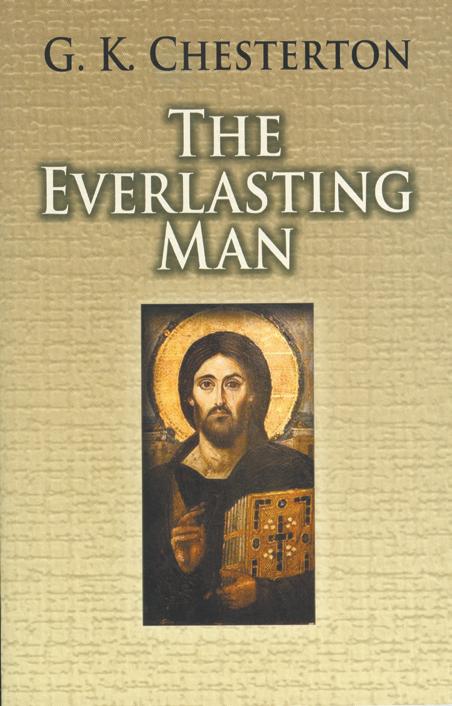

Every question contains within it a dialogue, which frequently grows out of a dispute that took place at the university, in the encounter of teachers and students. Even catechesis - the basic means of conveying the faith - has been set forth since time immemorial in the various catechisms in the form of questions and answers; the Compendium of the Catechism of the Catholic Church (2005) has again taken up the practice of conveying the faith in the form of dialogue.
I am pleased that in this book the dialogue is lively and quite realistic, that the questions have been posed not by those writing the answers, but rather by young people, who describe their very personal quests in their own words, and thereby act as spokesmen and spokeswomen for their generation.
Page 9 August 13 2008, The Record
makes human beings uniquely human? Can we be so bold as to call ourselves the pinnacle of creation? One of the 20 th Century’s greatest thinkers explains what sets human beings apart from all other living creatures.
Available from The Record Bookshop
Inspired moment: Nathaniel Liminski, right, who mobilised a network of youth from around Europe to educate other young people about the truth of the Catholic faith in the modern media, is greeted by Pope Benedict XVI, a keen supporter of the book that the young movement has produced.
What
$20.95+postage
Migrant Week
As Migrant Week, from August 24-31, looms, Perth’s new Vicar for Migrants reflects on what parishes can do
■ By Anthony Barich
EAST Fremantle parish priest Father Blasco Fonseca was quite the rebel at school back in Kenya.
Though he had the vaguest of inclinations towards the priesthood since a child, he’d been kicked out of class one day aged 16 and was sent to the school chaplain’s room for a chat.
When the priest asked him “why are you playing the fool, not thinking of your future?”, he told him of his very vague calling, but after a long chat, came out of the meeting committed to joining the priesthood.
As Father Blasco tells it, the event was nothing less than the hand of God. Now he’s amongst it again, calling for a change in attitude of many parishes to embrace migrants and refugees and their Catholic cultures in which they feel most alive.
Father Blasco has taken over replacing Scalabrinian Father Anthony Paganoni – who left for Adelaide – as the Archdiocesan Episcopal Vicar for Migrants.
Though he’ll humbly tell you he’s still warming to the role, there’s nothing lacking in his conviction about the cause of the many migrants in the Archdiocese who are struggling to feel connected to English-speaking parishes.
Archbishop Barry Hickey saw in Father Blasco the ideal replacement for Father Paganoni, whose very charism it was to care for migrants.
Father Blasco is well travelled, having been born in Pune, roughly 93km southeast of Bombay, India and was brought up in Kenya as his father worked in East Africa. He studied for the priesthood at Propaganda Fide College in Rome.
Ever since Prime Minister Ben Chifley’s Immigration Minister Arthur Calwell opened the floodgates for immigrants post-World War II, Australia has been increasingly a multicultural society.
And with the Rudd Government scrapping the Temporary Protection visas regime for asylum seekers in May this year, the cultural composition of Australia – and the Catholic Church within it – is changing dramatically.
As migrants flood in from third world conditions including Sudan, Vietnam and Burma, among others, they bring with them a distinct Catholic culture in which they truly belong.
While the aim of immigrants is always to integrate into the society in which they came, many elements that made their Catholic faith so vibrant back home – even when that home persecuted them just for believing – simply don’t exist in many Australian parishes.
Father Blasco freely admits it’s a difficult area that some parish priests struggle with; it doesn’t have to be the case. His vision is that which could very well be the future of the Catholic Church, especially in light of the cultural change that’s happening as we live and breathe – people gathering in communities of common interest.
Just as new movements like the Neocatechumenal Way, Disciples of Jesus, Opus Dei and others are proving to be seedbeds of vocations, so




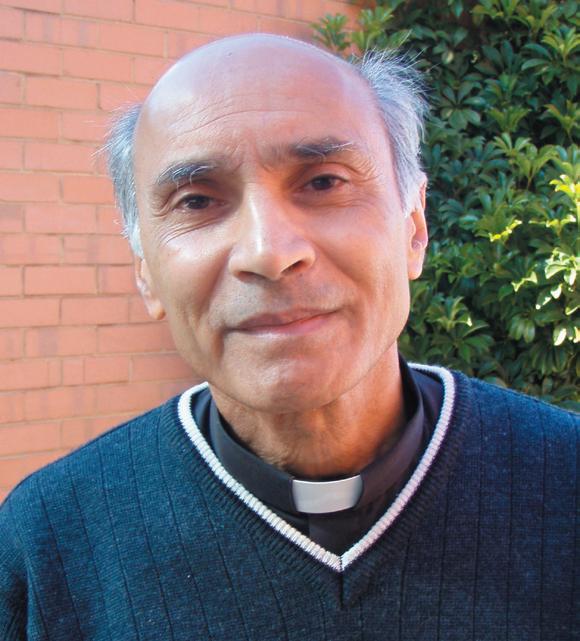
too can migrant communities.
And when they are immersed wisely and carefully into Englishspeaking parishes, the potential for the Catholic Church in Australia is boundless. There are many migrant chaplaincies in the Archdiocese of Perth – African, Burmese, Chinese, Portuguese, Maltese, Croatian, Indonesian, Korean, Polish, Ukrainian and Vietnamese, to name a few. The largest of these is the Italians, which have several communities scattered around Leederville, Guildford, Dianella, North Perth, Fremantle, Morley, Osborne Park, Highgate and Midland.
As vibrant as these communities are with their cultural feasts and processions, Father Blasco believes parishes can do much more in embracing these groups into their own big events. They can start by working in cultural music played by an ethnic community that is prominent in their area to get involved in music and liturgy.
“If people see Sudanese drums or South American guitar music, are the people in the pews likely to frown, or will they think ‘these people are part of the universal Church”? Father Blasco asks.
“People from other countries want to associate with each other as they miss the good and dynamism of their faith back home.
“They come to Perth and spread out, but want to get together on Sundays. It’s a re-inforcement of their faith and life. If everyone is speaking English, how do you integrate into that parish?
“A person’s faith is part of who they are. Archbishop Hickey believes that as long as they feel good about being Catholic; if that is ‘Church’ for them, then let them meet in community, where they truly come alive. Many migrants, say from South-Central America, will be church-goers, yet will probably have no say in the Englishspeaking parish they come to in Perth. They’ll sit up the back as they don’t understand much of the Mass, and even if the parish has coffee afterwards they disappear. Where as, if their cultural group is meeting afterwards and they have much in common, then they’ll stay after Mass – and stay for a long time.”
He gave the example of visiting a South American community in Mosman Park, where, on that particular day, they had a food fair. The community had a huge capacity to mobilise and organise fundraising activities to send up to 80 pilgrims to World Youth Day.
Then there’s the Portuguese community, which has several committees just to organise individual feast day celebrations – something an ordinary parish in unlikely to have, Father Blasco says, though there are a few exceptions. “There’s something unique about these migrant communities,” he says.
The Croatians have, on the Feast of St Anne, a singing competition to
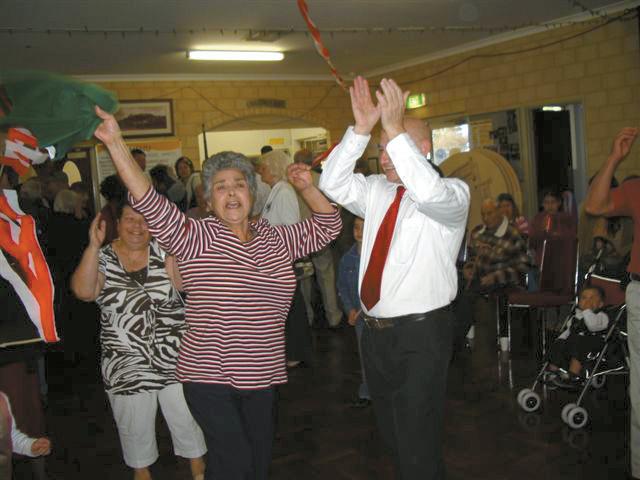




native tongue as they are second-generation Australians, but learn the lyrics just the same.
Fr Nikola Cabraja, who next year will celebrate 30 years as chaplain to the Croatian community, runs a Croatian ethnic school where
students learn the language and faith of their ancestors, to keep that vital connection with tradition that enkindles the fire of their faith. The Vietnamese community’s base at Westminster is a “hive of activity”, Father Blasco says. On special feast days, several hundred will come for a full day and night’s worth of

is n d
Migrants come alive when tradition is nurtured








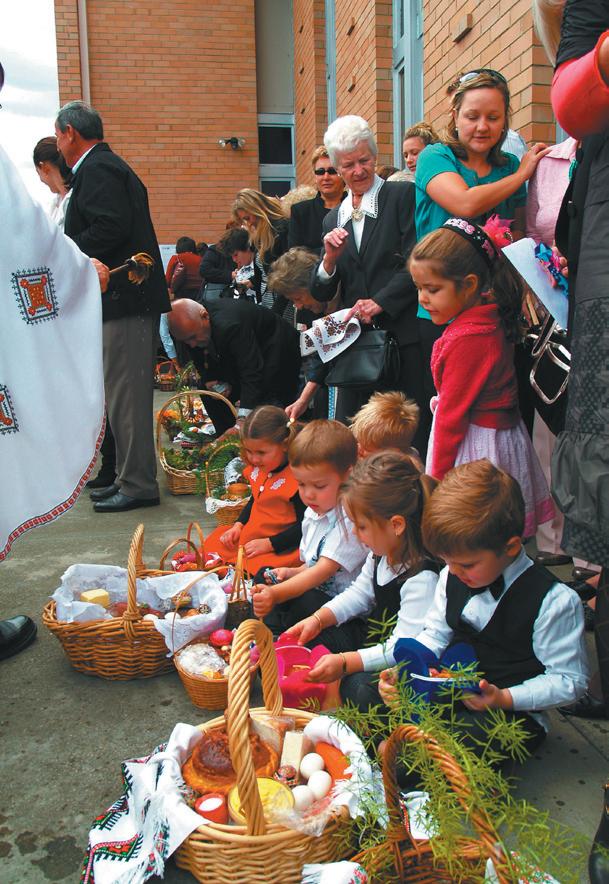

events,
with
a
fam-
“With the Communist background that their parents and grandparents endured, the family unit and traditions are crucially important to the Vietnamese,” Father Blasco says.
Page 10 August 13 2008, The Record
Fr Blasco Fonseca
belt out Croatian music that attracts young people, even those who don’t speak their
starting
Mass, then
procession, then marriage and
ily instruction that last until 9pm.
Big and loud: Members of the Maltese Catholic community parade through the streets for the anniversary of the Maltese association of Western Australia. P H OTOS COURTESY OF GERRY PULE.
Alive: Left, Maltese Catholics celebrate the 50th anniversary of the Maltese Association of WA; right, children of the Ukrainian Catholic Church parish in WA enjoy the colours and traditional foods during their Easter celebrations.
PHOTOS COURTESY OF THE MALTESE AND UKRAINIAN COMMUNITIES RESPECTIVELY.
Colourful: Traditional dancers put on a show during the Chinese New Year celebrations at Como parish.
Young faith: Young parishioners re-enact the Nativity during the Polish community’s long-standing tradition during Christmas.

Vista Star Witness
Aussie priest’s role in Anglicans’ Vatican bid
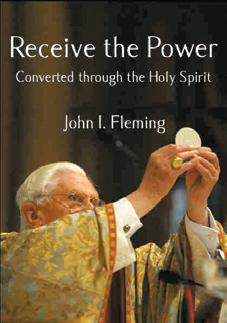
August 13 2008
TRANSLATE WYD INTO YOUR LIFE BY CELEBRATING THE YEAR OF ST PAUL

Pilgrims returned from WYD and many other Catholics may be wondering how to keep the spirit of their remarkable experiences alive. What better way than to start in the Year chosen by Pope Benedict XVI as the Year of St Paul? In this week’s VISTA, Mark Shea reflects on the greatest missionary.
■ By Mark Shea
As a convert to Christianity, St Paul dedicated his life to reconciling Gentile and Jew, slave and free, man and woman, and God and human
St Paul’s place in the Church has been a bone of contention ever since he was knocked off his feet by Our Lord on the way to Damascus.
He was a mass of paradoxes that seemed (to those who did not understand him) a mass of foolish contradictions.
He loved Christ above all and was not infrequently named an enemy of God.
He was all things to all and yet had a determined circle of enemies who regarded him as a two-faced phony.
He laboured to present the truth to wildly different audiences in terms they could understand, only to be suspected of compromising the truth.
He was devoted to the tradition and yet hailed (and reviled) as an innovator.
How do we explain this complex, passionate, visionary, practical, mysterious, querulous, humble, brilliant, obscure man?
I think a big part of the answer is that he was a Catholic convert.
Special burden
Unlike the original apostolic circle, Paul had not experienced the long, slow process of discipleship to Christ. There were, for Paul, no long days of trekking around Judea and Galilee, listening to the preaching of Jesus, sharing a meal with him or being astonished by his miracles. There was no moment at which love and devotion turned to cowardice and bitter tears of regret.
On the contrary, for Paul, the walk of discipleship began with the stark apprehension that Jesus was a monstrous imposter who deserved what he got.
Unlike the other apostles, Paul had been on the side of those who screamed for his blood, who felt satisfaction that the nails had been
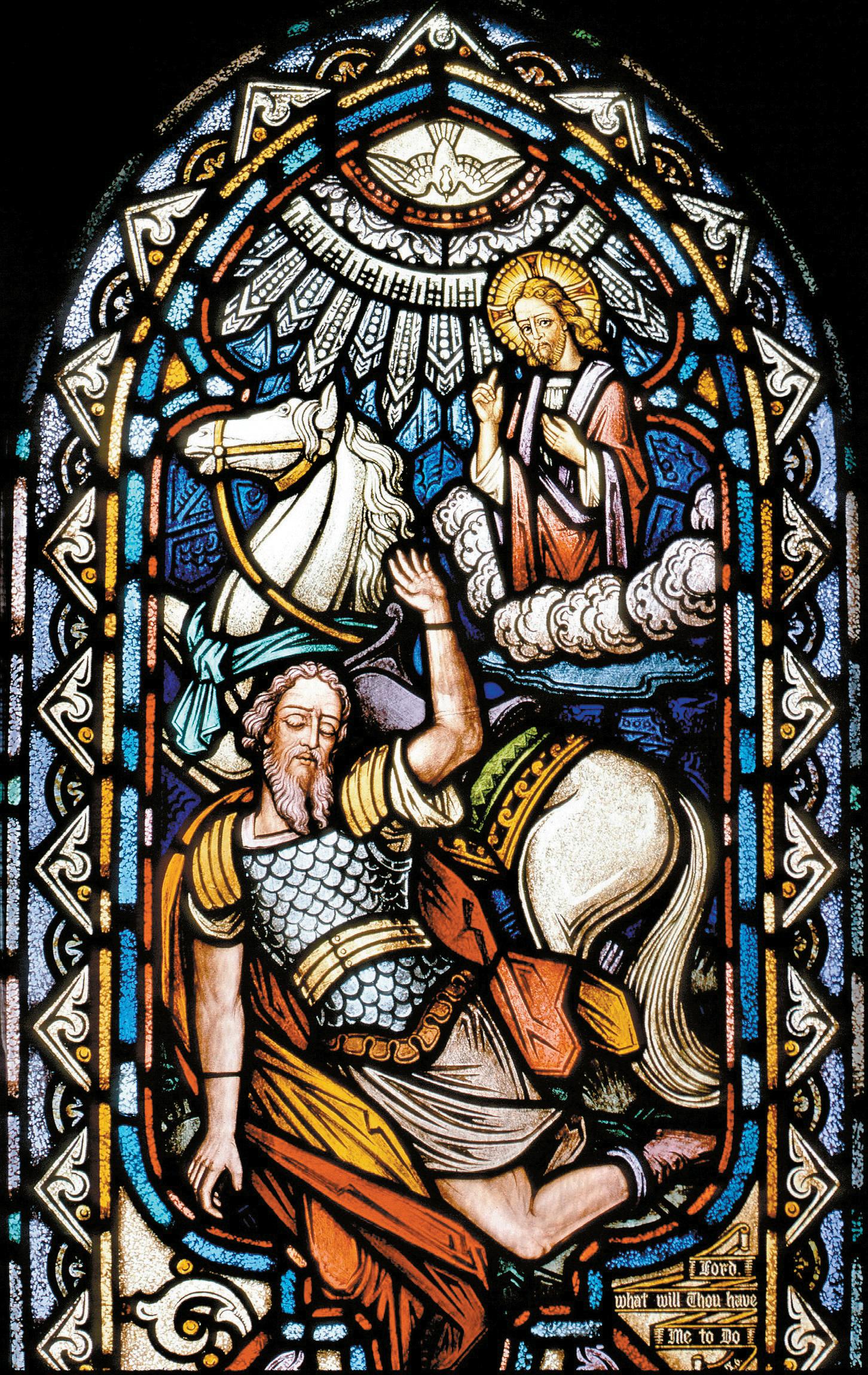
driven home, who prided themselves on having rid the world of a knave. When his tiny misgivings about the death of Stephen grew as he went from house to house dragging out people who prayed for his soul, he laboured to suppress it, to “kick against the goad” (Acts 26:14).
And when the Risen Christ overturned Paul’s world, the full horror of what he had done was fused with the full glory of the truth of Jesus’ mercy. Paul saw that God had been crucified by and for men just like himself. God had, as he put it “made known to us in all wisdom
and insight the mystery of his will, according to his purpose which he set forth in Christ as a plan for the fullness of time, to unite all things in him, things in heaven and things on earth” (Eph 1:9-10, RSV).
So, Paul carried within himself the strange burden of knowing that he had been the persecutor of Christ and that the very One he had persecuted had, as both a grace and a penance, called him to suffer for his name. Fired by this new vision of God, “reconcile all things for him, making peace by the blood of his cross” (Col 1:20), Paul’s whole life was spent living out this reconcili-
ation of Jew and Gentile, barbarian and Scythian, slave and free, male and female, and, above all, of God and each individual person. To the world this was and is “folly.”
But to Paul it was and is the simple consistency of “Christ crucified, a stumbling block to Jews and folly to Gentiles, but to those who are called, both Jews and Greeks, Christ the power of God and the wisdom of God” (1 Cor 1:23-24, RSV).
Mark Shea writes for The Record from Washington and is a convert to the faith from agnostic paganism and evangelical Christianity. He is also senior content editor for CatholicExchange.com
Get the Indulgence
As reported earlier this year in The Record, Pope Benedict XVI authorised the granting of a plenary indulgence during the Pauline Year, which commenced on June 28, 2008 and runs to June 29, 2009.
In addition to the normal requirements for all indulgences (going to confession, receiving the Eucharist, praying for the intentions of the pope), the Vatican decree explained specific requirements for the indulgence:
■ Those visiting the Basilica of St Paul Outside the Walls in Rome in the form of a pilgrimage must offer personal prayers before the Altar of the Most Blessed Sacrament and must recite the Our Father and the Creed in front of the Altar of the Confession, adding invocations to honour Mary and St Paul.
■ The Catholic faithful in any local church can obtain the indulgence by participating with devotion in a liturgy or other public event dedicated to St Paul — in any sacred place on the opening and closing days of the jubilee year, and on other days in places designated

Here in Perth, Archbishop Barry Hickey added several dates to the list of those on which the indulgence can be gained. There are three occasions remaining, all in 2009: January 25, June 28 and June 29, the end of the Year of St Paul. Archbishop Hickey also designated eight churches in the archdiocese where pilgrims may gain the indulgence:
St Simon Peter Church, Ocean Reef
Church of Saints Peter and Paul, North Perth (also known as the Redemptorist Monastery)
St Mary’s Church, Kalgoorlie
St Joachim’s Pro-Cathedral, Victoria Park
St Joseph’s Church, Northam Basilica of St Patrick, Fremantle
St Jerome’s Church, Munster
St Paul’s Church, Mt Lawley.
■ Catholics impeded by sickness or other serious cause, as long as they have the intention of fulfilling the other conditions as soon as possible, can obtain a plenary indulgence by joining spiritually in a jubilee celebration in honour of St Paul and offering their prayers and suffering for Christian unity. Individuals may obtain more than one indulgence during the holy year, but not more than one per day.
The fall: A window at Holy Cross Church in Mendota, Illinois, depicts the conversion of St Paul. The jubilee year dedicated to the saint began on June 28 this year and runs through June 29, 2009. PHOTO: CNS
- Page14
Guy Crouchback: No need to be scandalised - Page 16

Witness to Jesus
WAYS YOU CAN MAKE WYD and THE YEAR OF ST PAUL COME ALIVE IN YOUR LIFE!

FEASTS OF SAINT PAUL
A JUBILEE

J 25 T he Conversion of St Paul

As he neared Damascus on his journey, suddenly a light f rom heaven flashed around him. He fell to the ground and heard a voice say to him, “Saul, Saul, why do you persecute me? ”
“ W ho are you, Lord? ” Saul asked.
“I am Jesus whom you are persecut ing ,” he replied. Now get up and go into the cit y and you w ill be told what you must do.” Acts 9: 3-6
W hen he got up, he was blinded — possibly f rom the light — so his t ravelling par tners led him by the hand to Damascus He couldn’t see for three more days
Af ter his encounter w ith Christ he was bapt ised by Ananias and spent several years in Arabia in prayer and meditat ion.

Febr 10: T he S hipwreck in Malta But the ship st ruck a sand bar and ran aground. T he bow stuck fast and would not move, and the stern was broken to pieces by the pounding of the sur f T he soldiers planned to k ill the prisoners to prevent any of them f rom sw imming away and escaping But the centurion wanted to spare Paul’s life and kept them f rom carr y ing out their plan. He ordered those who could sw im to jump overboard fi rst and get to land. T he rest were to get there on plank s or on pieces of the ship In this way ever yone reached land in safet y Acts 27: 41-44


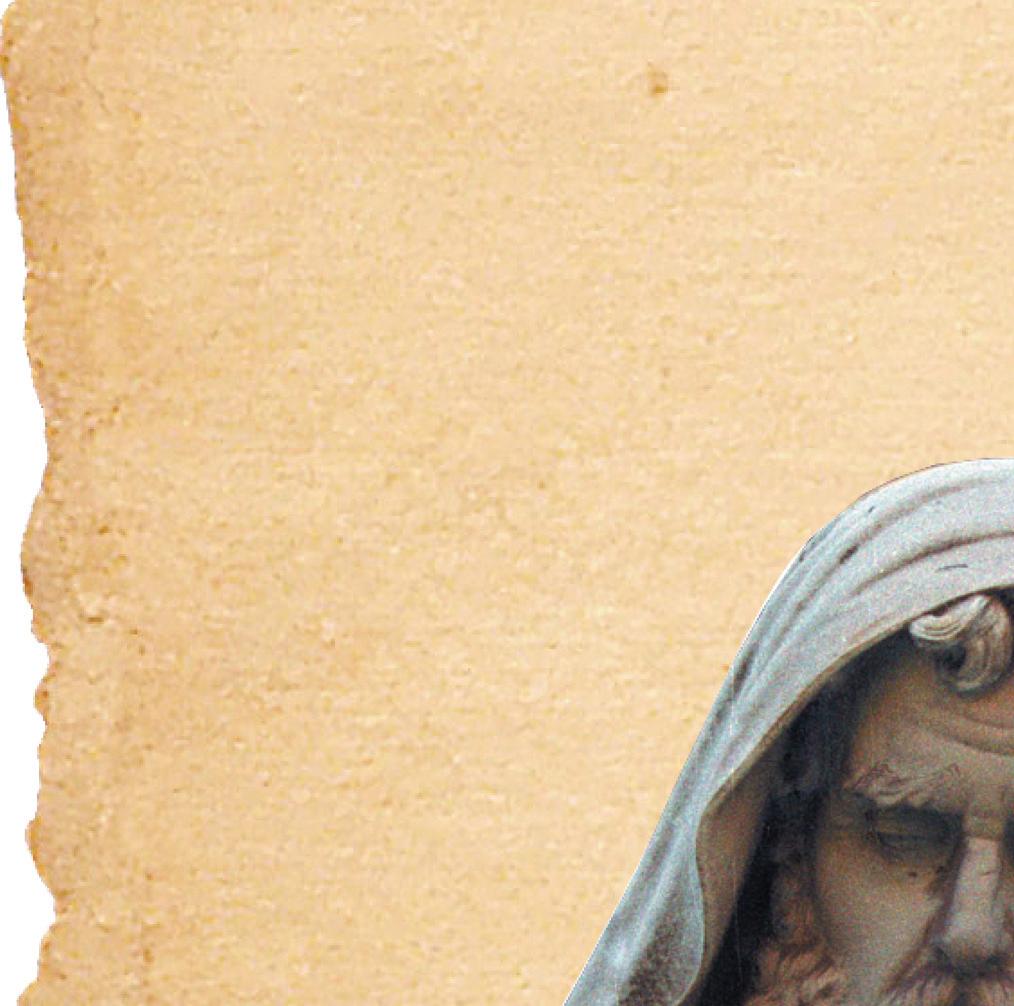
June 29: Feast of Sts Peter and Paul T here is a t radit ion which says both Saints were mar t y red on the same day and f ur ther to that in the same year 6 4AD

November 18: F f the dedications of the B asilicas of Sts Peter and Paul Both Saints have been laid to rest under basilicas that bear their names: Saint Peter s and St Paul Outside the Walls both in Rome.




Pope Benedict X VI proclaimed June 28, 2008 to June 29, 2009 to be a special jubilee year dedicated to St Paul. T he Pauline year commemorates the 2,000th anniversar y of the saint s bir th.
Jubilees or holy years are a t radit ion drawn f rom the Old Testament which describes years of jubilee that occurred ever y seven years Just as the seventh day of the week was reser ved for rest in honoor of the Lord, so was the seventh year (see Lv 25:1-13 and Ex 23:10-11). Special jubilee celebrat ions also took place ever y 50 years, during which debts were forgiven and land was returned to its ancest ral owners Since the 14th centur y the Church has celebrated holy years ever y 25 years T hey are special t imes dedicated to pilgrimage and prayer to help Catholics become closer to G od. T here are many liturgical moments unique to jubilee years including the opening of the Holy Door, a large bronze door to the right of the main ent rance of St Peter s Basilica in Rome that remains open only during the holy year In addit ion, popes can decree the observance of other holy years dedicated to a par t icular person, sacrament or theme, such as the Marian Year of 1987-88 and the Year of the Eucharist in 2004-05 T he Year of St Paul is such a year Note: th, chbishop








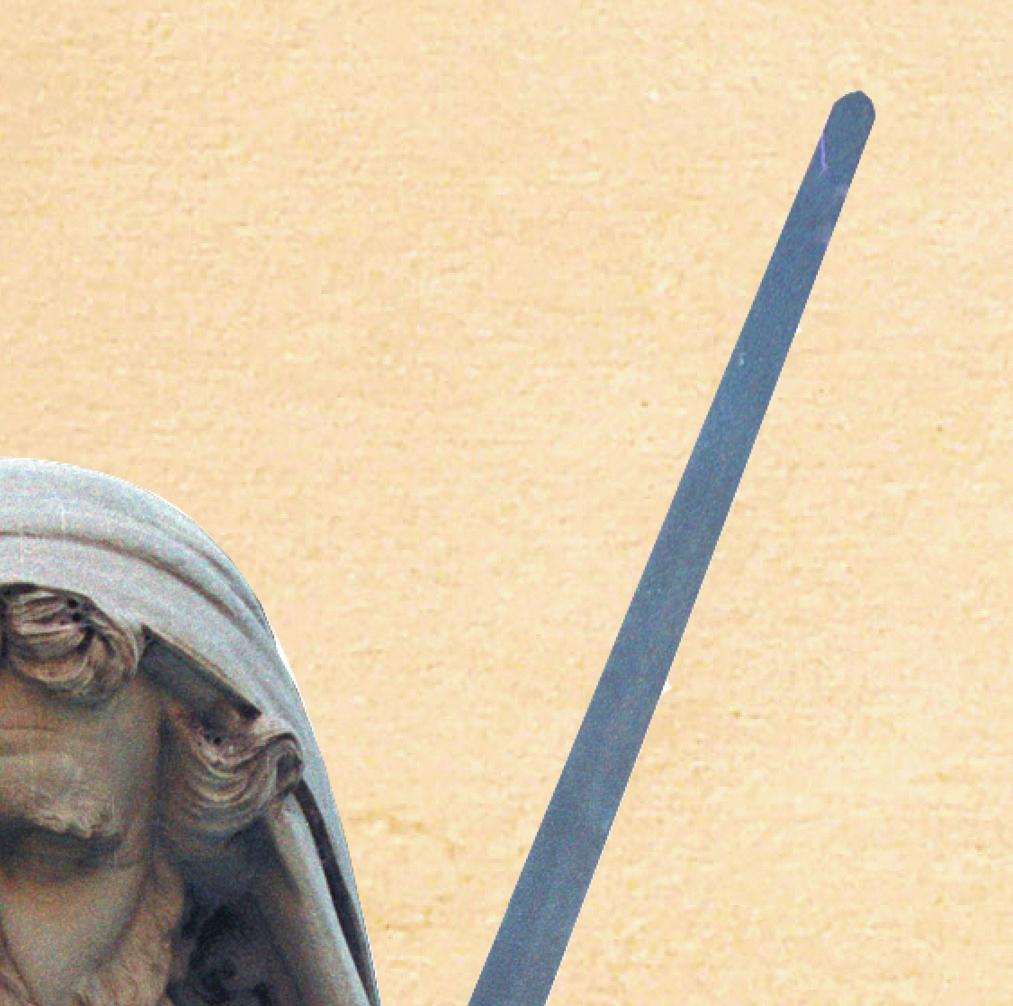



DID YOU KNOW…
■ St Paul was descended f rom Benjamin, the youngest of Jacob s 12 sons (Phil 3:5).
climb into a basket then lowered him f rom a w indow in the cit y walls to safet y (2 Cor 11:32-33).

■ W hen the k ing of Damascus t ried to k ill him, St Paul’s f riends had him
COULD YOU DO ANY OF THESE...?
RE AD ST PAUL’S WRITINGS
■ St Paul studied w ith a prominent rabbi, G amaliel, in Jerusalem when he was a teenager (Acts 22:3).
■ St Paul had at least one sister who




B Hick has added eight churches and the dates of Januar y 25, 2009 and June 28 2009 wher ou can gain the special indulgence (see a 1).
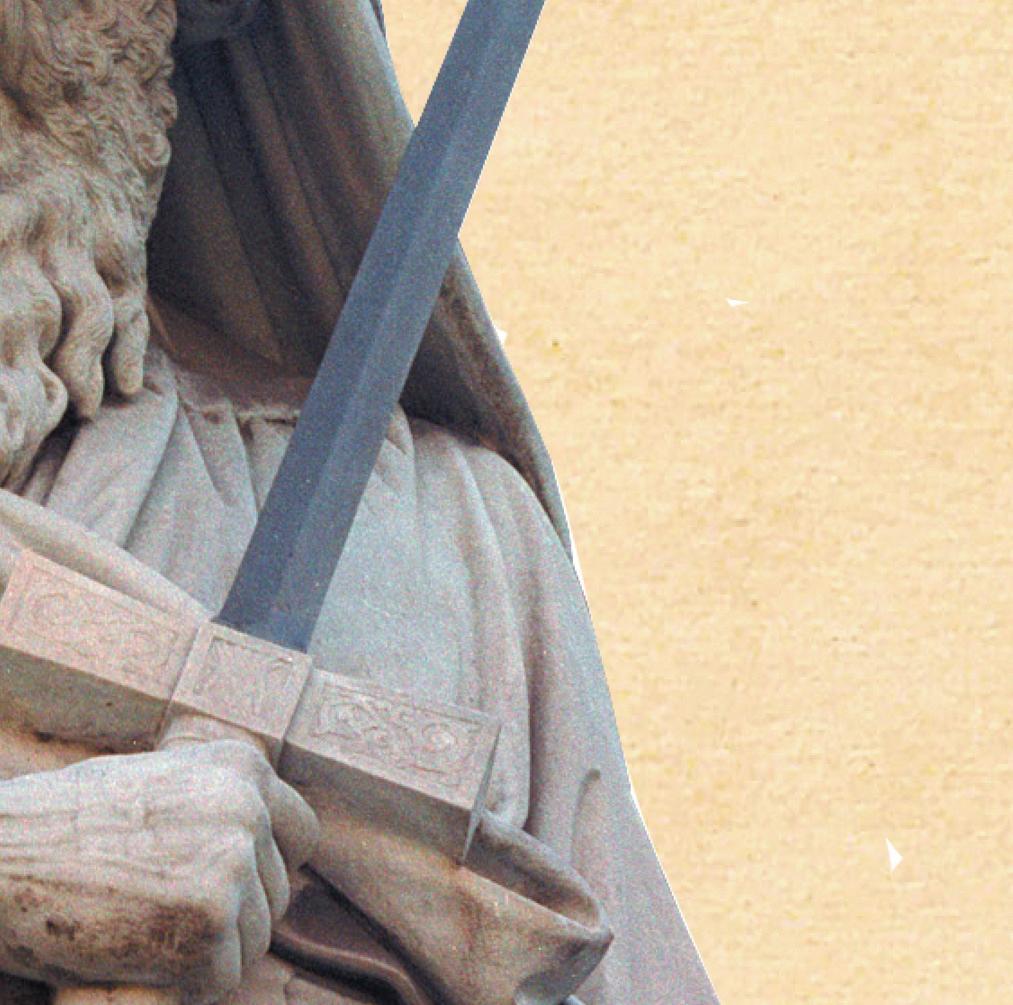




Select a book about St Paul for spiriual reading
Inv ite others to celebrate the life of Paul by beginning a Bible study group
MAKE A MINI-PILGRIMAGE
V isit T he Record’s ‘Panorama sect ion online at w w w.therecord.com.au to watch for special events focusing on St Paul.


PR AY, PR AY, PR AY !
P ray a novena to St Paul. P ray for each of the count ries to which Paul t ravelled. How are the Christ ians in that area of the world liv ing out their faith?
P ray for the unit y of all Christ ian churches Obtain the plenar y indulgence of fered for this Year of St Paul.
SPRE AD THE GOSPEL

Volunteer to be a catechist in your parish.Volunteer to ser ve your parish in some capacit y.Tell parish staf f you would like to sponsor someone for RCIA Par t icipate in local ecumenical discussions
FURTHERMORE...
■ It is never said that Saint Paul fell of f a horse at his conversion, it merely states that he “fell to the ground”.
■ His tomb was t radit ionally believed to lie under the Basilica of Saint Paul
Outside the Walls It was confi rmed in 2006 that a sarcophagus bearing an inscript ion: To Paul, the Apostle and Mar t y r resided beneath the altar
■ He wrote thir teen (*four teen if you include Hebrews which has no att ributed author) letters which make up nearly one third of the New Testament
■ He worked as a tentmaker for some t ime.
lived in Jerusalem. W hen Paul’s enemies planned to ambush and murder him, his sister s son warned him and the Roman authorit ies (Acts 23:16-17).
■ St Paul’s fi rst conver t was Lydia, a businesswoman who sold pur ple cloth (Acts 16:13-15).

WAYS TO CELEBRATE THE YEAR OF PAUL
Sponsor a missionar y - today s missionaries carr y on the t radit ion of St Paul by bringing the word of G od to places who would other w ise hear nothing of his love. Many missionaries endure harsh condit ions and even risk their f reedom and lives to bring G od’s love to the poor and forgotten.
Contact CATHOLIC MISSION for f ur ther informat ion on (08) 9422 7933
Spread the G ospel - in your parish or youth group organize a st reet mission or if that is too daunt ing evangelise w ith your act ions like going to v isit lonely people in an aged home or hospital or joining in a soup pat rol. Let people know you do these acts of k indness in honour of St Paul. T hough I speak w ith the language of angels but have not love, I have become noisy gong or a clanging cy mbal.” 1Corinthians 13:1

Organise a pilg rimage - fi nd out which parishes are dedicated to St Paul and plan a t rip to v isit them. You might like to say a decade of the Rosar y in each church or if you can fi nd nine “Pauline” places make a novena by pray ing at each stop Have a parish St Paul weekend - organise a morning tea or lunch at church and enjoy food f rom each of those count ries Decorate the hall w ith a Pauline theme- using quotes or sy mbols that stand out f rom the Epistles
WORDS OF WISDOM - FROM THE MAN HIMSELF

“Be not forgetf ul to enter tain st rangers: for thereby some have enter tained angels unawares.” Hebrews 13:2
“Do not rebuke an older man but exhor t him as you would a father ; t reat younger men like brothers older women like mothers and younger women like sisters all in purit y.” 1T imothy 5:1-2
“Be subject to one another out of reverence for Christ W ives, be subject to your husbands, as to the Lord... Husbands, love your w ives, as Christ loved the church and gave himself up for her,” Ephesians 5:21-22 & 25
“Greet one another w ith a holy k iss.” 2Corinthians 13:12
“Rejoice always pray constantly give thank s in all circumstances; for this is the w ill of G od in Christ Jesus for you.” 1T hessalonians 5:16-18
PAUL: THE PATRON OF MALTA
T he feast of St Paul’s shipwreck is celebrated ever y year on the 10th of Februar y in Valetta, Malta. T he day star ts w ith Mass w ith the local Bishop and is followed by a procession of the statue of St Paul through the cit y st reets fest ive music and fi rework s It commemorates the shipwreck of the Saint ’ s boat on Malta s shores that lef t him st randed. From there he healed the pagan P ublius who went on to become Malta s fi rst bishop Due to this miracle the whole of Malta was conver ted.
QUIZ
P ut the letters of St Paul in chronological order Colossians 1 Corinthians 2 Corinthians Ephesians G alat ians Hebrews*, Philemon, Philippians Romans 1 T hessalonians 2 T hessalonians 1 T imothy 2 T imoth See the St Paul Kid’s Quiz on Page 17!

Vista 2-3
August 13 2008, The Record 13 2008, The Record
THE SWORD
sy mbolizes St
Paul’s mar t y rdom in Rome
around AD 67 A s a Roman cit izen, Paul could not be crucified nor stoned, but rather was accorded the honour of beheading by sword.
THE BOOK represents St Paul’s epistles which make up one-third of the New Testament It is somet imes depicted as a scroll.
SYMBOLS OF ST PAUL
Photo: CNS
Vista
Following in his steps
Here’s how you let St Paul guide you in becoming an evangelising disciple of the Lord - and focusing the inspiration so many received through the experience of World Youth Day
■ By Mark Shea
You may not be able to travel ‘to the ends of the earth,’ but you, too, can spread the Gospel.
Ask your average Catholic about evangelisation and you get a mumble and a shrug. Evangelisation? That’s what evangelicals do, isn’t it?
It’s not that Catholics think it’s bad. Rather, it is that most Catholics simply have no idea what to do. So, we console ourselves with that saying of St Francis of Assisi that he never actually said: “Preach the Gospel at all times. Use words when necessary.”
That would be great advice - if we really were preaching the Gospel at all times by our lives. But for many of us, evangelising is near the bottom of our to-do liSt
We shift uncomfortably in our seats as we drive past the little fundamentalist church sign that says, “If you were charged with being a Christian, would there be enough evidence to convict you?” We tell ourselves that our faith is “deeper” then mere talky evangelical chatter.
Total dedication
Here’s the thing: While it’s perfectly true that a faith that is all talk is shallow faith, a faith that we cannot articulate if our lives depended on it is not an improvement. St Peter tells us, “Always be prepared to make a defence to anyone who calls you to account for the hope that is in you, yet do it with gentleness and reverence; and keep your conscience clear, so that, when you are abused, those who revile your good behaviour in Christ may be put to shame” (1 Pt 3:15-16, RSV).
St Paul understood this. And in this Year of Paul, the Church calls us to take a chance and tell people about the enormous treasure of the Catholic faith. She insists that it’s better to try, and fail, then to not try. Many Catholics wonder if there


is some sort of technique they need to master in order to bear witness to their faith. For such folk, Pope Benedict XVI has liberating news.
In his announcement of the Year of Paul last June, the pope said that Paul’s success was not due to some “refined strategy” of salesmanship or philosophical wrangling. Instead, he said that Paul’s achievement came from his extraordinary personal involvement springing from his total dedication to Christ, despite all obstacles.
In short, Paul really believed this stuff. He acted exactly like a man who really had met the Risen Christ on the Road to Damascus and was now convinced that Jesus had conquered death, forgiven his sins and laid upon him the charge to tell the world. Because he really believed, he was willing to “pay personally for [his] faith in Christ, in every situation.”
Trust in the Spirit
Pope Benedict knows this because he has read Paul, who states: “When I came to you, brethren, I did not come proclaiming to you the testimony of God in lofty words or wisdom. For I decided to know nothing among you except Jesus Christ and him crucified. And I was with you in weakness and in much fear and trembling; and my speech and my message were not in plausible words of wisdom, but in demonstration of the Spirit and of power,
that your faith might not rest in the wisdom of men but in the power of God” (1 Cor 2:1-5, RSV).
“The great thing about being Catholic is that you can plagiarise and call it “being faithful to the Tradition.”
Paul no more felt equal to the task of evangelism than you or I do. His secret was not a technique or a philosophy. It was that Paul believed that if he trusted in the Spirit of Jesus to provide the power and the wisdom, the Spirit would come through.
And he did.
We can do the same. The great thing about being Catholic is that you can plagiarise and call it “being faithful to the Tradition.” Not a theological brainiac when somebody
asks you what Catholics believe? You don’t have to be clever. Go find a Catechism of the Catholic Church.
Not particularly confident that your saintliness is such that merely knowing you is to be exposed to the living presence of Christ? Welcome to normal Catholic life.
You don’t have to be Mother Teresa or some other spiritual giant. Just ask a friend to Mass.
They will, we are solemnly assured by God himself, have a genuine exposure to the actual, spiritual and physical presence of Jesus Christ himself.
Those are but two simple ways in which you can bear witness. The key is not mastering the techniques of Paul. The key is having the faith of Paul that Christ will keep his promise to us.
Mark Shea writes from Washington and is Senior Content editor for Catholic Exchange.com.
Parishes can become communities
■ By Father Herbert Weber
When I was asked to found a new parish three years ago, I read the Acts of the Apostles for possible insights in establishing a new church congregation. Since it was shortly after Easter and Acts is a staple for that liturgical season, I soon found myself immersed in the travels and challenges faced by the apostle Paul.
All churches can learn from Paul’s efforts. Long-established parishes and new congregations alike need to see themselves as evangelists, enthusiastic about sharing the message of Jesus and willing to take a journey of faith.
Only one time in my priesthood have I encountered an American
adult who never heard of Jesus. That person, after following the Stations of the Cross around the church, pointed to the image of Christ, asking me, “Who was that man, and why did they do that to him?”
It would be a mistake to assume that people already know the fullness of the Gospel message. Many Christians, in fact, have trouble understanding the significance of Jesus’ life and death, much less know how it affects them in a secular world. Consequently, imitating Paul is necessary.
Those who follow the footsteps and the spirit of Paul can begin with the road to Damascus. For Saul, this journey provided a conversion experience, a direct encounter with the Lord. In the flash of a light, Saul received a new beginning which is symbolised by the new name, Paul.
All evangelisation begins with one’s own encounter with the risen Lord. People don’t usually see a blinding light. But there has to be an awareness of the Spirit’s activity in their lives, calling them to something important and unique.
When our parish was barely six months old, I introduced the concept of small faith groups. With concentrated periods of weekly Scripture study and sharing, these groups are one of the ways we provide people with faith encounters. Other opportunities include weekend retreats, Rite of Christian Initiation of Adults, a family-inclusive faith formation program and the Sunday liturgy itself.
The goal of all these activities is to provide a setting in which people may experience the movement of the Spirit. Put in another




way, before Paul was able to preach to others, his own faith had to be enflamed. Paul spent time with the Christian community before beginning his great missionary journeys. He was immersed in their prayer and in sharing their way of life.
When I was growing up, I often
heard from various religion teachers that good Catholics don’t have to preach; they can lead by giving a good example. Practising their faith and living their morals will speak loudly to the people around them.
After more than 30 years as a priest, I no longer believe that is enough. People need to speak about their faith and be willing to express their beliefs.
For those who want to follow Paul’s footsteps, doing this will be one of the biggest challenges.
Sharing one’s faith is not the same as talking about church events or parish politics. It involves going deeper and expressing the core of one’s beliefs, that which gives direction and purpose. It centres on a relationship with the Lord.
Many Catholics feel their faith
Continued on next page
Vista 4 August 13 2008, The Record
Inspired: Many pilgrims like these, above, from the Cook Islands, returned from WYD are asking “How can I share this astonishing gift of faith with those around me?” The joy of seeing how normal it is to be a believer in Jesus and to want to follow him was one of the key benefits of WYD for hundreds of thousands. This week’s Vista section of The Record offers suggestions about how you can do this. They key is prayer - speaking to Jesus as a friend. Another word for this is ‘holiness.” offers suggestions about how you can do this is prayer - speak ing to Jesus as a friend Another word for this is ‘holiness ” PHOTO: CNS
the Church
Mother to the homeless of the streets
Obituary
CS Lewis once wrote about a beautiful luminous woman in heaven, surrounded by children, who, while she was alive, had cared for the homeless and unloved but had never been recognised for her great love. In Perth, many people who knew Liz Hare would have felt his words applied equally to this remarkable woman.
■ By Mark Reidy
When Elizabeth
Anne Hare passed away on July 2, 2008 many of Perth’s rejected and marginalised people lost a friend and advocate.
“Liz”, as she was known to those who crowded into the Sacred Heart Church in Highgate on July 9, spent the latter years of her life living out the Gospel message; reaching out to the homeless, the lonely, those caught up in the darkness of addictions and prostitution, those with mental illness, the imprisoned and the sick.
Julie Williams, Co-ordinator of the Shopfront, a Catholic outreach centre in which Liz gave much of her time as a Support Officer, told mourners that Liz found it hard to put into words the depth of her feelings for those who were suffering, but that her love was reflected by how she reached out to others.
“She found fulfilment at the Shopfront and was always ready with a big smile and warm welcome to everyone who came”, Ms Williams said.
“She made a difference in the world where she lived and she brought Christ’s love in action to
Continued from Vista 4 stories are so private they don’t know how to share them even if they want to. So I’ve been teaching people how to talk about their faith. Paradoxically, it begins with listening and not talking. As other people enter into conversations of trust and start to focus on what matters to them, the listeners try to focus on their own longings and hopes, finding answers to their own longings too.
The word “preaching” has many negative connotations, but this kind of dialoguing is how the modern-day Paul would preach. And it is consistent with what Paul did in Athens when he addressed the crowd regarding the altar to the
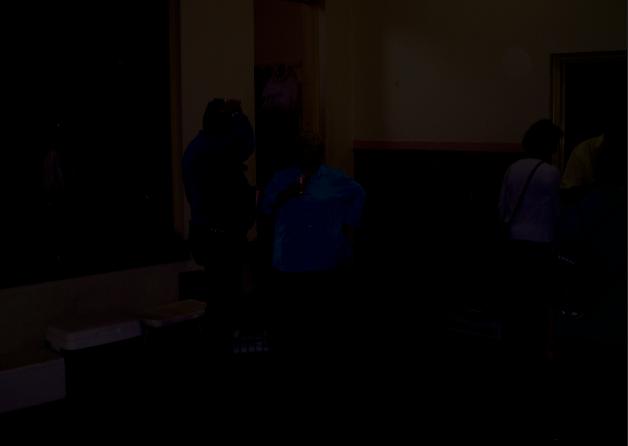
vulnerable and rejected. She had visited countless prison, hospitals and psychiatric institutions, reaching out with a hand of friendship to people who knew no other. Through perseverance and resourcefulness Liz could find short and long term accommodation when others failed.
She would even take people into her own home when they couldn’t find a place to stay.
Even her beloved dog “Pippy”, who was often by her side, had been a beaten and neglected stray left to fend for herself. Pippy found a home in Liz’s heart, as did the countless people that she reached out to.
She indeed lived out the Gospel from Matthew chapter 25 that was read during the Requiem Mass of Thanksgiving, “I was a stranger and you made me welcome, naked and you clothed me, sick and you visited me, in prison and you came to see me”.





many”. But she reminded those gathered that underlying her handson approach was a spiritual woman who often prayed for those to whom she reached out.
Liz’s cousin and lifelong friend, Loretta Hill, recounted a childhood of great energy and athleticism,
Unknown God (Acts 17:22-31).
Noting that Athenians were religious and had a place even for the God they had not yet discovered, Paul spoke about their deep desire to know this God. He used their anonymous longing as a way to share his story of the Christ.
Another aspect of Paul’s ministry that relates to today’s congregations can be found in his first letter to the Corinthians. Aware that the church at Corinth was conscious of the gifts of each of its members, Paul was also troubled that there was divisiveness and competition.
Using the analogy of the body with many parts (1 Cor 12), Paul emphasised unity and the use of each gift for the good of all.
describing a young girl who was always willing to take on a new challenge.
Born Elizabeth McMullin on June 26, 1945, Liz was the only child of parents who owned a hotel in Victoria Park, a place Ms Hill remembers as one of great joy and welcoming.
She also told mourners that Sacred Heart Parish had been central throughout Liz’s life. It was the place where she had attended school, received the Sacraments and had continued to contribute to in her latter years on the Parish Council, as a Special Minister and in organising the night roster for Perpetual Adoration.
Ms Hill described her schoolmate as the fastest runner, the best climber and the person everyone wanted on their team.
“When you had Liz on your side”, she said, “You always knew you had a head start”.
It was a theme that ran throughout Liz’s life. Whether she was volunteering at The Shopfront or Miriam’s House for single pregnant women, Linda’s House of Hope for those trying to escape the clutches of prostitution or with the running of a ministry house for people living on the street as a member of the Holy Spirit of Freedom Community, those who worked beside Liz were buoyed by her determination, reliability and commitment. As were those that she assisted.
empathise with the struggles of others.
Ms Laurie shared that after more than thirty years working at the Royal Perth Hospital, mostly as a Supervisor, Liz “threw herself into working with the Church”.
Liz’s compassion, sense of humour and love of a social get together meant that she would not only be greatly missed by family and friends but also by many of Perth’s most


Despite Liz’s quiet and unassuming nature, she received the Centenary Medal from the Prime Minister in 2003 in recognition for her services to Australian society. It was an award that she did not seek, but one that she received with humble gratitude.
However, Liz did not expect accolades for her efforts, she simply recognised loneliness and emptiness in others and did what she could to fill that void.
Liz touched people from all walks of life, attested to by the presence in the Church of Archbishop Barry Hickey as well as a number of those that she had reached out to. Many nodded in agreement to the words Ms Williams believed would have greeted Liz after her departure from this world, “Welcome into My Kingdom, you good and faithful servant”.





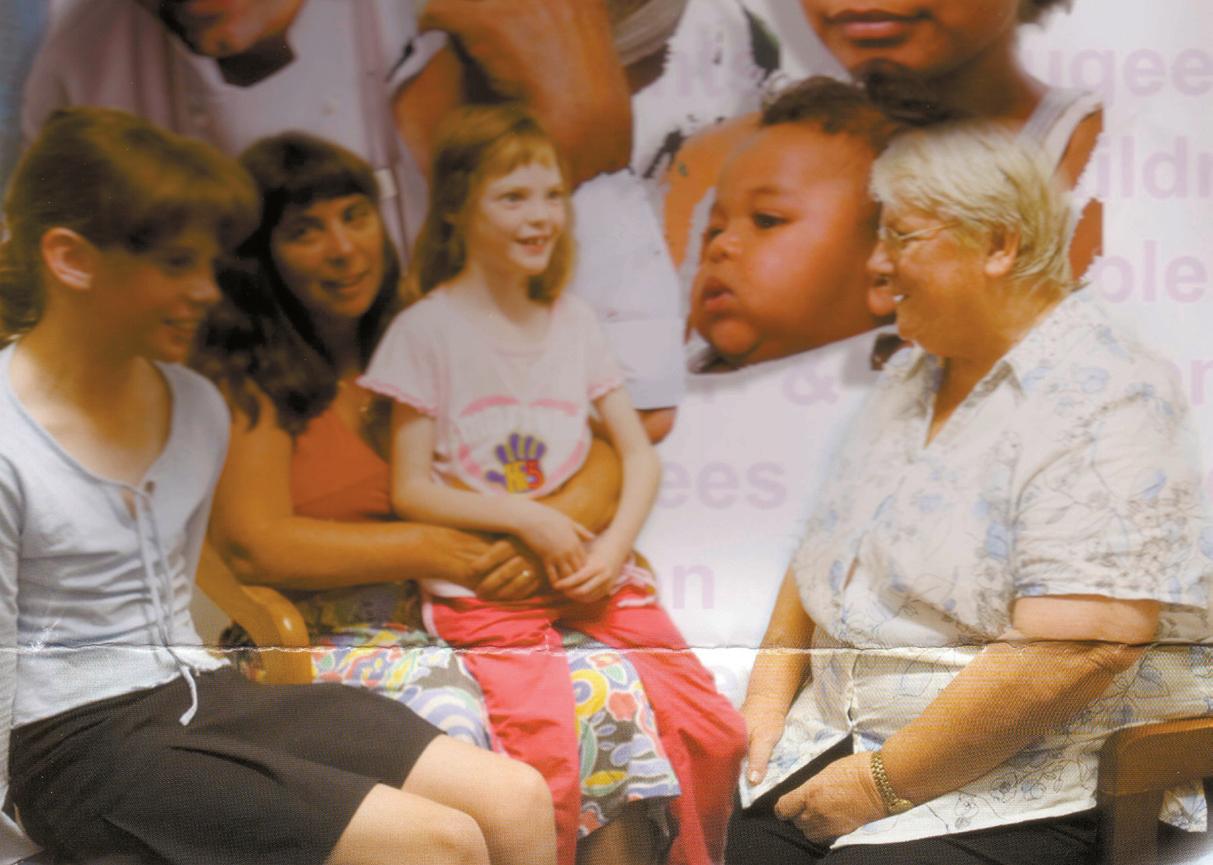




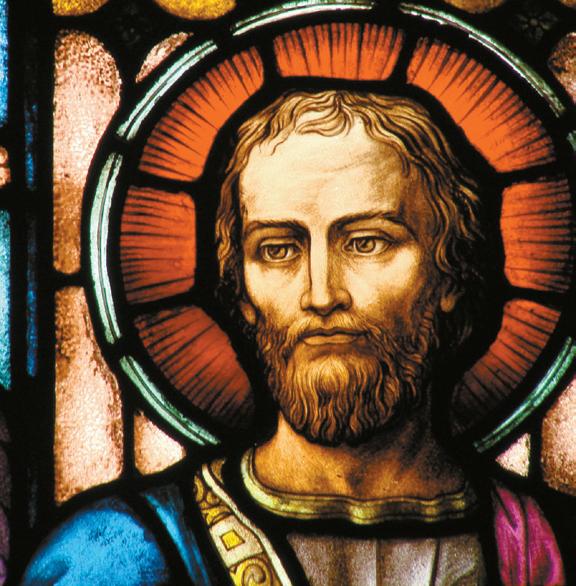
As contemporary congregations seek to help each member of the parish grow, they often use gift-discernment processes. When parishioners discover their talents to be used in service of the community, they usually become more engaged in the church. With that their faith grows; they, too, are evangelised.
Paul’s work of evangelising took place nearly 2000 years ago, yet the process of discovering faith, sharing it, and enlightening others still goes on.
Father Weber is the founding Parish Priest of Blessed John XXIII Parish, Perrysburg, Ohio.
Often referred to as “Mum” by those who came to know her, Liz was able to speak sternly to the most hardened of characters without ever losing their respect, because they knew that she always spoke with love.
Whether she was making a cup of coffee, trying to find accommodation or simply listening to those who had no one else to listen, people could recognise that Liz had a true understanding of their pain.
Her niece, Jane Laurie, described her as, “a real hero” who had reinvented herself after the tragic death of her beloved husband, Stuart.
Through her own pain Liz had turned closer to God and was, subsequently, able to recognise and



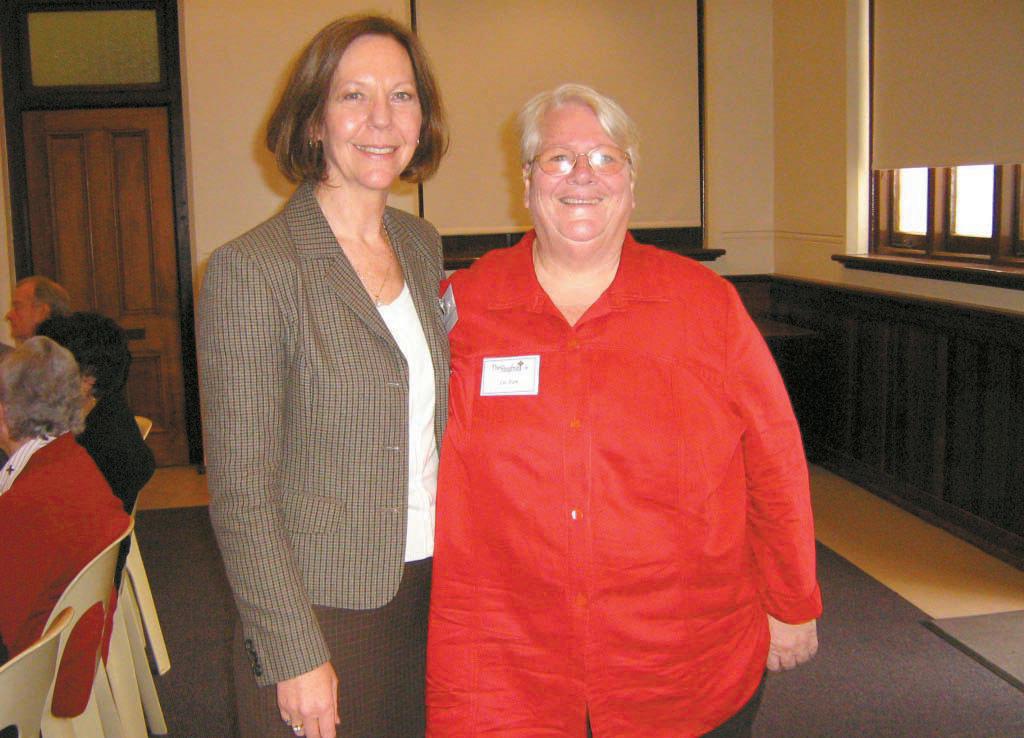
August 13 2008, The Record Page 11
True beauty: Liz Hare, shown here in this undated photograph, chats at The Shopfront where she volunteered. Many who knew her simply referred to her as “mum.” Although she would have been mightily embarrassed, many others would have described her years of helping the unwanted and those down on their luck as saintly and heroic.
True beauty: Liz, with friend and Shopfront Coordinator Julie Williams, and, in top photo, featured on a poster publicising the archdiocesan LifeLink welfare agencies.
Perspectives
Mary led me to Christ, I was saved Body Language
 Beth O’Neil
Beth O’Neil
Our family was living in Denmark, down south. We had made the decision to return to Perth and were trying to sell our shop as well as our house. I was at a crossroads and struggling with a lot of anxiety which I was sort of managing.
Why I became Catholic



 with Debbie Warrier
with Debbie Warrier
A friend of mine suggested that I see a Christian counsellor. I knew I had to do this as there was something that I had to forgive myself for. The counsellor, Christine Diamond, led me to Christ. The process was a profound experience. Christine oozed faith and was a great believer in the power of the Holy Spirit. It was very transformative and healing. During the time that I was receiving counseling, there was this sense that Our Lady was coming into my presence and offering her grace. I could not at this stage even look at Christ, it was too painful.
This was so surprising to me as I wasn’t brought up a Catholic. I was confirmed in the Church of England but God wasn’t a big part of our life. Our Lady had not even been in my field of view. She was just this vague person in the Bible that was the Mother of Jesus.
Yet Our Lady led me to Christ. This was one of the factors that attracted me to the Catholic Church, the way Catholics honour Our Lady. That is a big part of the spirituality and the feminine side of it.
However, ultimately Christ was the only one that could forgive me through His overwhelming love. That was the beginning point of me following Him.
Then we came back to Perth. My husband returned to his vocation as a teacher within Catholic education and my two sons began the process of their sacraments. So, it seemed natural that I would be part of this as well.
As a child one of my best friends in grade seven had a mum who was Christian and she had a great faith. I was attracted to this and used to love going around to their house.
I wasn’t a practising Christian all through my 20s but was searching for Truth and the source of Love.
I tried New Age beliefs and Eastern philosophies. Through them I gained knowledge of meditation and psychology of the ego. However, I was drawn to a different kind of conversion. It has been a converging of paths that led solely to Christ.
I went to the Our Lady of Grace Parish, North Beach and joined the RCIA (Right of Christian Initiation for Adults) program that was run by Robyn and her husband Don Devine. They are lovely people. The program was fantastic.
I became a Catholic in 2003 and was confirmed that Easter. I didn’t tell a lot of people about this because it was a very private thing that I was doing.
Mostly now I call on Christ but Our Lady is always there. I also like the universal aspect of Catholicism. For a while Ken and I were part of the Music Ministry at our Church.
We weren’t very good at it... But for the past two and a half years I have been conducting with Joan Burke the Prayer and Meditation Services using songs from Taize at our Parish which I sing for. My faith continues to be a journey.
debwarrier@hotmail.com
But wait, there’s more!
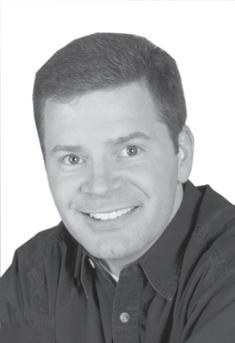
a commentary on the intersection of faith, sex and culture
By Christopher West
Heaven’s Song: sexual love as it was meant to be.
Authors often compare writing a book to giving birth. I can relate. Right now I’m feeling the “after glow” of having delivered my “fifth child” (coincidentally, my wife is really and truly about to deliver our fifth child). My publisher just sent my latest work off to the printer. Heaven’s Song: Sexual Love as It Was Meant to Be will be released in September by Ascension Press. It’s based on the “hidden talks” of John Paul II’s Theology of the Body (TOB). Let me explain.
In the summer of 2005, Dr Michael Waldstein of the International Theological Institute in Austria (now a professor at Ave Maria University in Florida) contacted me to ask for my assistance with a very exciting project he was working on – a fresh English translation of John Paul II’s TOB. Having worked with the existing English editions for nearly a dozen years at that point, I was well aware of various shortcomings in the translation.
News of Waldstein’s project was music to my ears. But, as a TOB devo-
tee, what I was about to learn knocked me off my chair.
During his research for the project, Waldstein discovered John Paul II’s original manuscript in the archives in Rome.
The text, Waldstein told me, was written as a lengthy book and had been divided by John Paul II into 135 talks. But, as I knew well, he had only delivered 129.
Are you kidding me?! New undelivered material from John Paul II’s Theology of the Body!? To what shall I compare my astonishment and delight?
It’s like a die-hard Beatles fan finding out that some unknown tracks from the Fab Four had just been discovered in a closet at Abbey Road studios.
And not only that – when I finally got my hands on this new material, I realised these lost songs were not “Bsides.” This material had not fallen by the wayside because it wasn’t up to par.
This material contained some of the most beautiful tracks that John Paul (the Pope, not Lennon and McCartney) had ever laid down.
These “hidden talks” provide deeply moving reflections on the intimacy of the lovers in the Song of Songs; penetrating insights into the spiritual battle that accompanied the marriage of Tobias and Sarah in the book of Tobit; and new illuminations on the “spousal” nature of the Church’s liturgy gleaned from St Paul’s teaching on the “great mystery” of marital union in Ephesians
5.
John Paul had delivered four addresses on these themes as part of his 129 talks. I was quite familiar with those.
But Waldstein discovered that there were actually 10 prepared talks in this section of the catechesis which the pope had condensed into four.
The 10 unabridged talks, unearthed for the English-speaking world for the first time by Waldstein, offer a much fuller vision.
Heaven’s Song zooms in on this section of John Paul II’s catechesis, unfolding the hidden treasures of these unabridged addresses in an extended form for the first time. Although I’ve touched on these themes elsewhere, including a series of columns for “Body Language,” it seemed not only appropriate, but necessary, to give this new content – tucked away all these years in the John Paul II archives – a fuller exposition.
Why is my new book called “Heaven’s Song”?
Because the erotic poetry of the Song of Songs transposes heaven’s music into a human key, helping us to understand sexual love as it was meant to be. It was meant to be a foretaste here on earth of the joys that await us in heaven.
Why is the Song of Songs the favourite biblical book of the mystics? Why have the saints written more commentaries on this seemingly obscure and wildly erotic love poetry than on any other book in the Bible. Hmmm...
What do they know that most Christians seem not to? If this is “heaven’s song” transposed into a human key, then, as the saints and mystics know, the Song of Songs is the authentic soundtrack of Christianity.
My new book seeks to bring the divine secrets of John Paul’s “spousal mysticism” to all those “with ears to hear.” If you are already familiar with TOB, you will delight in this new material. If you’ve not been exposed to the genius of John Paul’s catechesis, this book will serve as a good introduction and whet your appetite for more.
Heaven’s Song will be available by order from The Record Bookshop
Church’s teachings are binding whether people like them or not
 By Fr John Flader
By Fr John Flader
Following on from your column “The teaching of Humanae vitae”, I recently heard a religion reporter say on national radio that since many Catholics rejected Pope Paul VI’s teaching in that encyclical, the teaching was not binding. His words were: “If a teaching is not received by the people, according to ancient Catholic tradition, it’s not a teaching at all.” Is this correct?
No, this is not correct. There is no such “ancient Catholic tradition”. Once the Church has spoken authoritatively on an issue, that teaching is binding and is to be accepted by all. If some of the faithful, even a large number, do not accept it, the teaching retains its binding force.
As I wrote in my earlier column, on at least two occasions Jesus’ own teaching was not accepted by some of his disciples – his teaching on the inadmissibility of divorce and remarriage (cf. Mt 19:10) and on the Real Presence in the Eucharist (cf. Jn 6:60) – but that did not make the teaching any less true.
With respect to the latter teaching, St John tells us, “When many of his disciples heard it, they said, ‘This teaching is
difficult; who can accept it?’” (Jn 6:60) He adds a few lines later, “Because of this, many of his disciples turned back and no longer went about with him.” (Jn 6:66)
But even though they left, Jesus continued to teach the truth about the Eucharist. To be sure, down the ages the Church has always taught both the inadmissibility of divorce and remarriage, and the Real Presence in the Eucharist.
The attitude of the faithful, in the face of a teaching they find hard to understand or to live, should be like that of St Peter, when Jesus asked the apostles, “‘Do you also wish to go away?’ Simon Peter answered him, ‘Lord, to whom can we go? You have the words of eternal life. We have come to believe and know that you are the Holy One of God.’” (Jn 6:67-69)
Jesus Christ is the Holy One of God, the Second Person of the Blessed Trinity. He is “the Way, and the Truth and the Life.” (Jn 14:6) What he teaches is true, whether it is accepted by others or not.
Down the ages, Jesus continues to teach through his Church. In order to preserve the Church from error he promised the apostles that he would send them the Holy Spirit, “the Spirit of truth”, who would guide them into all the truth (cf. Jn 16:13).
When the Church teaches, it is Christ who teaches. We should never forget Jesus’ strong words to his disciples when he sent them out to teach: “Whoever listens to you listens to me, and whoever rejects you rejects me, and whoever
rejects me rejects the one who sent me.” (Lk 10:16)
If someone today rejects an official teaching of the Church, they are rejecting Christ. And they can be sure they are wrong.
The Second Vatican Council teaches clearly that the definitions of the Supreme Pontiff do not require the assent of the Church in order to be considered valid: “The Roman Pontiff, head of the college of bishops, enjoys this infallibility in virtue of his office, when, as supreme pastor and teacher of all the faithful – who confirms his brethren in the faith (cf. Lk 22:32) – he proclaims in an absolute decision a doctrine pertaining to faith or morals. For that reason his definitions are rightly said to be irreformable by their very nature and not by reason of the assent of the Church, inasmuch as they were made with the assistance of the Holy Spirit promised to him in the person of blessed Peter himself.” (Dogm. Const. Lumen gentium, 25)
One of the greatest minds the Church has ever had, St Thomas Aquinas, wrote in his Summa Theologiae about the teaching authority of the Pope: “Against his authority neither Jerome nor Augustine can assert his own opinion.” (STh, II-II, q. 11, a. 2, ad 3)
St Augustine himself speaks of his respect for the teaching authority of the Church: “But I would not believe in the Gospel, had not the authority of the Catholic Church already moved me.” (Contra epist. Manichaei, 5, 6)
Got a question? Email Fr Flader: director@caec.com.au
Page 12 August 13 2008, The Record
Q&A
Perspectives
Church is more than money for the poor

In clear view
By Guy Crouchback
The Fairfax Press, never exactly backward about publicising anything likely to distress or damage the Church, headlined a recent story: “Catholic day a ‘scandal’.”
This stated: “A Catholic priest has said the money being spent on World Youth Day is an embarrassment and a scandal.
“‘There is a great dissatisfaction with the Restorationist spirituality, which is also devoid of any commitment to social justice,’ Father Confeggi said.
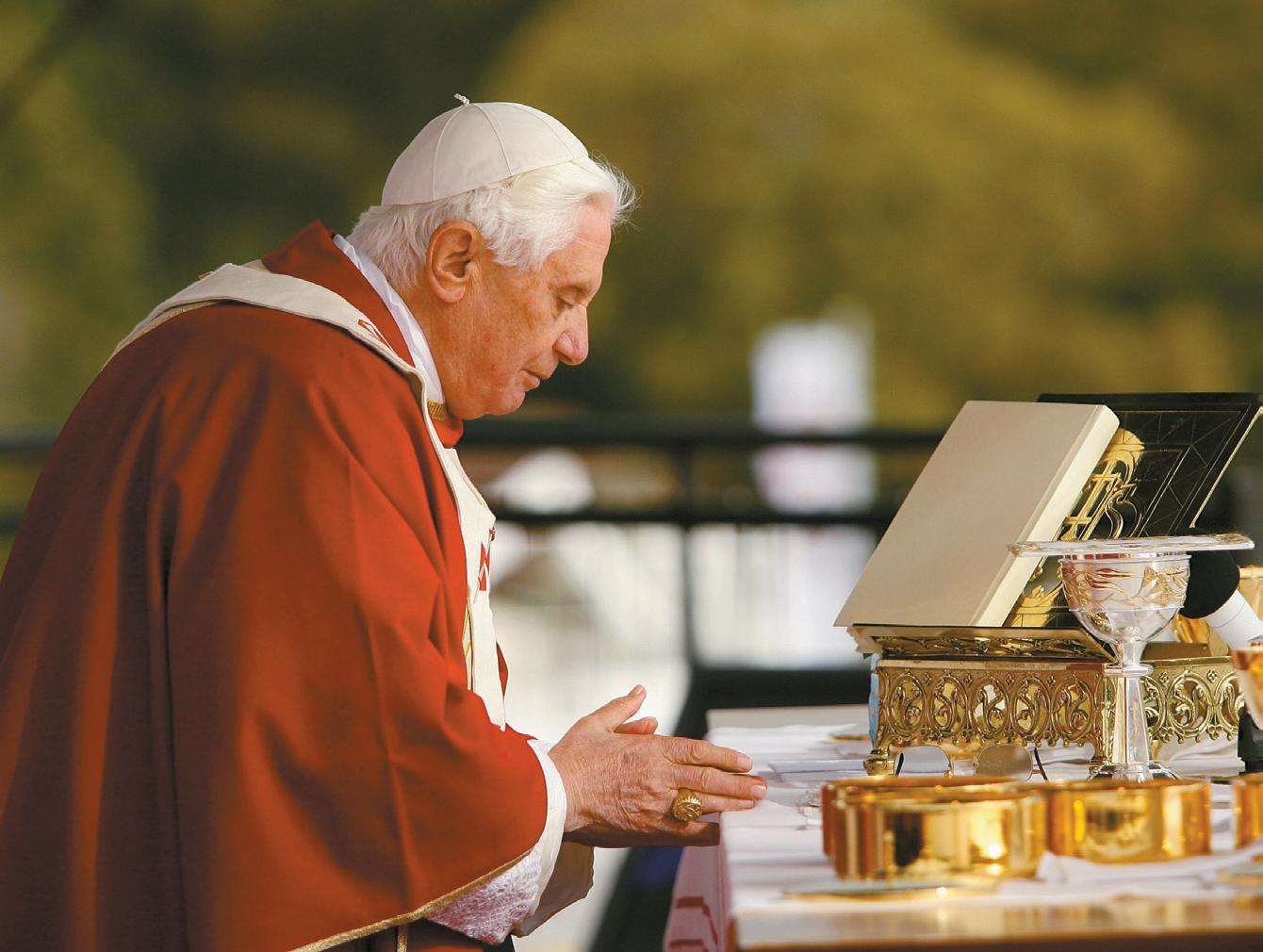
“Father Confeggi said his parish was one of the most disadvantaged in Sydney. He said the Church and State funds could be directed elsewhere, including to the 120,000 people sleeping homeless in Australia or education of the disadvantaged.
“Father Confeggi said it was an ‘utter scandal’ that a chalice, Communion plate and vessel to hold Communion hosts - adorned by Argyle diamonds and being made for a rumoured six-figure sum - would be given to the Pope.
“Yesterday Bishop Kevin Manning, the Bishop of Parramatta and member of the local organising committee for the event, defended it, saying it was ‘an investment in the future of the Church and
It is difficult to escape the message that it is ok to be having sex outside of marriage. I think we need to hear more often about the sacredness of the sexual union, and why the Catholic Church tells us it belongs inside the sacrament of marriage.
The truth is that sex is a powerful expression of love. Today we find many meanings and misconceptions surrounding love. The word is used to describe various feelings and emotions, love of food, love of pets, love of our family and friends. But the use of the word in this way does not reveal the whole truth of love. It confuses our understanding of the fullness of the truth and how love manifests itself in the human person, particularly in the experience of the love between man and woman.
But what is love? Love, real love, wants what is best for another. To love is to be a gift of our self to another in a way that affirms and draws out true goodness in that person. Deep down in our hearts, we all desire to give and receive this kind of real love. It’s what our hearts yearn for and it brings us true happiness. We all simply want to love and to be loved.
Without real love, we tend to fall back into satisfying our own desires. Sex can become an act of using another to satisfy our own desires. It’s no longer an act of self-giving love, as it’s meant to be. It becomes just an act of self-gratification, at the expense of another. That’s not the real meaning of sex.
society. ‘World Youth Day is about renewing the faith and ideals of young people so that they, too, will work for social justice and charity and will carry forward the works of the Church in these areas’,’ Bishop Manning said.
“‘The Catholic Church is the largest non-government provider of education, health care and welfare services for the disadvantaged in Australia and the world and we want to ensure that such works continue and are strengthened in the future.’
“He said World Youth Day would ‘renew Australia’s commitment to a fair go, produce a new generation of leaders committed to justice and charity, and also
guarantee that the significant contribution the Church makes to the care of the most disadvantaged continues’.”
Now, it isn’t for me to tell the Church its business, but - and setting aside my deep dislike of the phrase “social justice,” which I believe is meaningless (what’s wrong with plain “justice’?) - didn’t this problem specifically arise in Scripture?
And wasn’t it very specifically answered?
I hope Catholic readers will forgive me that I have only the King James Bible to hand, but there St John 12, says as follows:
“Then took Mary a pound of ointment of spikenard, very costly,
and anointed the feet of Jesus, and wiped his feet with her hair: and the house was filled with the odour of the ointment.
“Then said one of the disciples, Judas Iscariot, Simon’s son, which should betray him, ‘Why was not this ointment sold for three hundreds pence, and given to the poor?’
“Then said Jesus, Let her alone: against the day of my burying hath she done this.
“For the poor ye always have with you: but me ye have not always.”
The point today, I humbly suggest, is this: The Church is one of the greatest providers of charity in the world.
For much of human history it was by far the greatest, and indeed the only significant, such provider.
But it must be careful not to be nothing but a charitable organisation.
Had the Church existed simply for giving money to the poor there would have been no cathedrals, no monasteries (which would mean no Western civilisation), no Church patronage and protection of the early universities, and in the long-run, no spiritual or material improvement in the world beyond the low ceiling which had existed universally in pre-Christian times.
The Church has no reason to be ashamed of its record as a provider of charity, but it has other dimensions as well, and as Bishop Manning has suggested it looks not only to charity but also to some more permanent remedies to the human condition.
cathrec@iinet.net.au



 with Bronia Karniewicz
with Bronia Karniewicz
Sex speaks the language of real love. Much more than just something we do, sex is a way of communicating with another. It speaks a language of giving ourselves completely to another. Through our body, it’s saying to someone, “I give my whole self to you, forever”. Whether we realise it or not, this is the language our heart hears and understands.
Sex is the ultimate expression of love and commitment between a man and a woman, and it’s an expression of love designed for the context of marriage. Some might say marriage is just a piece of paper, but the real meaning of marriage reflects the ultimate meaning of love – the gift of self.
Marriage is a freely given but permanent commitment between a man and a woman to love each other for the rest of their lives. They promise to nurture and take care of each other through all the good and difficult times ahead of them. Their love is exclusive and they share trust and an intimacy unmatched with any other.
Sex is the ultimate reflection of this complete gift of self. Through the sexual union of husband and
wife, they make visible with their bodies the commitment they’ve made with their lives. It creates an emotional bond that strengthens their marriage and helps them live out their commitment. Even when times are tough, this bond helps to ensure that their love emerges even stronger.
Before marriage, sex isn’t the answer to finding love and happiness in our lives. Pleasure and intimacy might be there, but there will always be parts of the expression that are false. It will always be a frustrated expression of what it’s meant to be.
Sexual relationships outside of marriage leave a lot of people feeling used, hurt and lonely. They leave us with a feeling that something is missing. Our deep desire for real love isn’t satisfied, because our heart knows that real love is always whole and true.
Saving sex for marriage not only respects the true meaning of sex, it respects the essence of who we are as individuals. It helps us protect our own dignity and helps us to see and respect the true beauty and dignity of others.
When we discover the true meaning of sex and marriage, we discover the beauty of God’s plan. And it’s by living according to His plan that we come to experience real love and lasting happiness in our lives. That’s exactly what God wants for us. It’s what we were made for!
Bronia Karniewicz is executive officer of the Perth Archdiocesan Respect Life Office.
GOOD NIGHT & GOD BLESS


Volume 1: A Guide to Convent and Monastery Accommodation in Austria, Czech Republic and Italy
By Trish Clark
Convents, Monasteries and Abbeys have always been places that generously welcomed weary travellers. This tradition continues today and Good Night & God Bless takes you on a tour of religious hideaways offering tourist and pilgrimage accommodation throughout Europe.
Good Night & God Bless reveals these unique, atmospheric and affordable places which accommodate tourists or those pursuing a pilgrimage or spiritual retreat.
This user-friendly travel book provides safe, affordable and comfortable accommodation information, local tourist information, places of pilgrimage, travel tidbits and anecdotes against a fascinating backdrop of history and religion. An amazing reference guide for all those planning to travel to Europe!
$29.95+postage

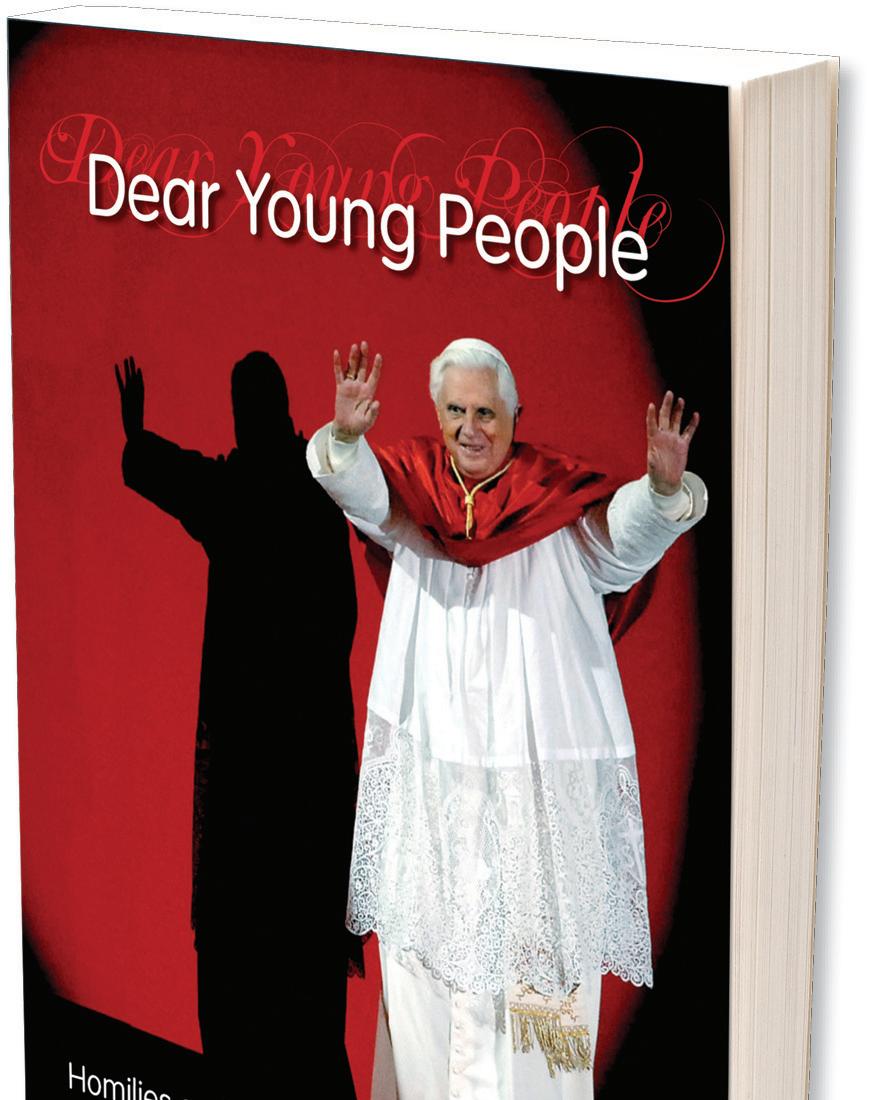

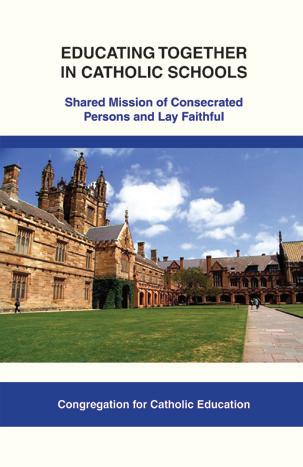






August 13 2008, The Record Page 13
Life... Why save the gift of sex for marriage? LOCAL I NTERNATIONAL TRU STWORTHY New Titles for AUGUST 2008 DEAR YOUNG PEO P LE Homilies and Addresses of Pope Benedict XVI during his Apostolic Journey to Sydney, Australia, for World Youth Day, 2008. 978192147214 5 | Paperback | $12.95 Young people – and the young at heart – were all enriched by the presence of the Holy Father in Australia for World Youth Day. The Pope has now gone but his words remain, recorded in this attractive volume, to be reflected upon, savoured and put into effect. Includes eight pages of colour photos. Available 20 August! E D U C ATI NG TOGE TH ER I N C ATH OL IC SCH OOL S: A S H ARE D M ISSI ON B E TW EEN CON S E C RAT E D PER S ON S AN D L AY FA ITHF UL D E A R YO U N G P E O L E NEW RELEASE ! ORDER YOUR COPY NOW! Phone Caroline at The Record Bookshop 9227 7080 •Available August 20
The path to unity
The recent Lambeth conference revealed deep divisions in the Anglican communion. Some 400,000 have decided that the only place they can truly call home is Rome...
Vatican ‘seriously studying’ request
■ By Deborah Gyapong
OTTAWA (CNS) - The Vatican has assured a group of traditionalist Anglicans that it is studying seriously their request for full communion with the Roman Catholic Church.
Cardinal William Levada, head of the Vatican’s doctrinal congregation, also linked the issue of corporate unity for the Traditional Anglican Communion (TAC) to larger issues within the Anglican Communion.
“The situation within the Anglican Communion in general has become markedly more complex,” Cardinal Levada said in a letter to Archbishop John Hepworth of Blackwood, Australia, primate of the TAC. “As soon as the congregation is in a position to respond more definitely concerning the proposals
you have sent, we will inform you.”
Last October, Traditional Anglican Communion bishops from around the world met in plenary session in Portsmouth, England, and signed a letter “seeking full, corporate, sacramental union” with the Holy See. The TAC, formed in 1990 as a worldwide body, represents socalled continuing Anglicans who left the Canterbury-led Anglican Communion over the ordination of women.
It has been in informal talks with the Vatican since the early 1990s.
While the TAC seeks unity with Rome, the much larger Anglican Communion headed by the archbishop of Canterbury is wrestling with issues such as the ordination of active homosexual bishops, blessing same-sex unions and, more recently, a Church of England decision to ordain women bishops.
At least twice during the once-a-
decade Lambeth Conference that began in July, Vatican officials have warned of the consequences some of the Anglican decisions have on Anglican-Catholic unity.
Speculation has been rife on the Internet about whether the Vatican was planning to receive disaffected Anglicans en masse, perhaps through expanding the Anglicanuse provision that already exists in the United States.
The Vatican established a special pastoral provision to oversee the movement of former Episcopalian clergy in the United States who wanted to minister as priests in the Roman Catholic Church.
The provision also set up guidelines for Anglican-use Catholic parishes, allowing former Episcopal parishes to retain some of their Anglican liturgical and spiritual traditions.Archbishop Hepworth received Cardinal Levada’s letter
via the Australian apostolic nun cio on July 25. “This letter should encourage our entire communion and those friends who have been assisting us,” Archbishop Hepworth said in a statement posted on the TAC website, www.themessenger. com.au.
Of various Anglican splinter groups, the TAC is the largest and the only one with a global reach. It represents up to 400,000 Anglicans.
Though their worship is AngloCatholic, they are often confused with Anglo-Catholics who have remained with the worldwide Anglican Communion.
Two Anglo-Catholic bishops from the Anglican Communion went to Rome recently to see what provisions the Vatican might make for them should up to 1000 English clergy defect over the Church of England’s decision to ordain women bishops.

Seriously: Cardinal William Levada told the TAC the Vatican is “seriously considering” its request.
Only the Catholic Church has authority on Truth
A quiet lunch between two Anglican bishops and Catholic priest at a restaurant in Parramatta led to over 400,000 Anglicans on six continents seeking full corporate and sacramental communion with Rome.
■ By Anthony Barich
AUSTRALIAN Campion College presi dent Fr John Fleming has revealed his cru cial role in the global Traditional Anglican Communion seeking full communion with Rome.
Fr John Fleming, speaking exclusive ly about his new book, Converted through the Holy Spirit the global disintegration of Anglicanism was intertwined with his own conversion and the authority of the Catholic Church.
The book, to be released by Connor Court next month, covers his own “spiritual odyssey”, explaining how the “global disintegration of Anglicanism” helped lead him to the Catholic Church, and tells why Catholicism alone could satisfy his need for the synthesis of faith and reason.
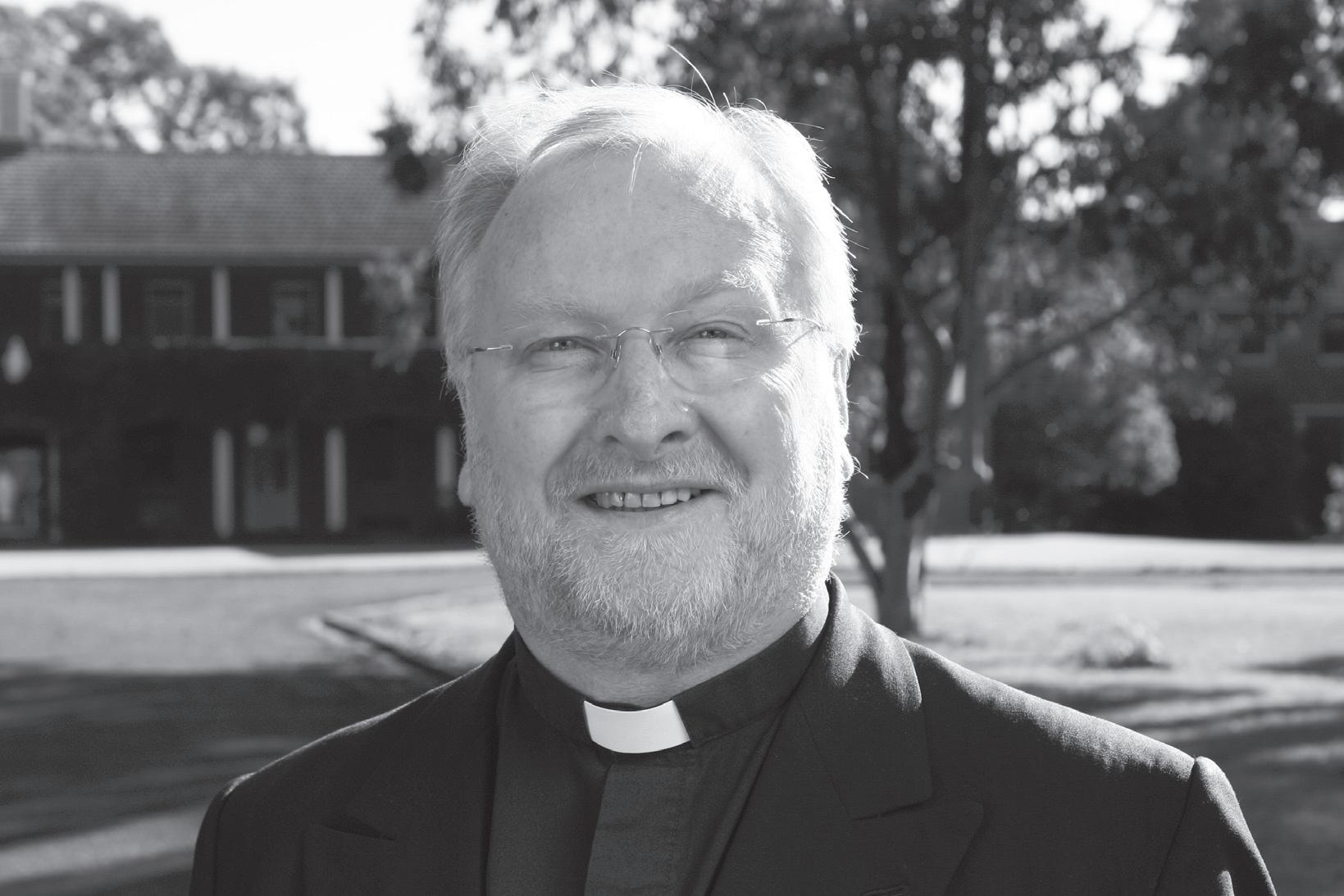

ordained by women bishops are also invalid, making the sacraments they distribute invalid.
The Mass being a crucial factor in his own conversion, he tells of an exchange with a young couple - one a Catholic the other not - on the reasonableness of Transubstantiation and the Sacrifice of the Mass.
Fr Fleming said that the first chapter of the book is a letter to his three daughters, now aged 27, 25 and 22, who never knew the full story of his conversion, though his reception into the Catholic Church from the Anglican Church changed their lives.
This chapter details his conversion from youthful agnosticism to finding his faith by having his intellectual doubts resolved and being converted during his exposure to an Anglican Solemn High Mass.
This awakened in him why the valid priesthood is so important. The next two chapters, he says, are a letter to the young couple he refers to.
Fr Fleming told The Record that the ordination of women denies people the right to having their sins forgiven and receiving the Body and Blood of Christ.
This problem is deepened as priests
He says the issue of women’s ordinations within the Anglican Church was catalytic to his conversion.
“In the end, I was left in the position that I was clear in my own mind that the ordination of women could not be permitted as Christ did not permit it; but I recognised there were some very intelligent people, including my own (Anglican) archbishop, who thought it could be done,” he told The Record
“So that begs the question, who’s the umpire? Not the Anglican Church, but the Catholic Church.”
Quoting Vatican II’s Dignitatis Humanae (Declaration on religious freedom), he said the highest truth was to be found in religious faith, and “once you’ve discovered that truth you’re under a moral obligation to conform your life to that truth”.
“So in conscience I was left with no other alternative than to abandon Anglicanism and become a Catholic,” he said.
“I’d been intellectually converted without knowing I had.” He concludes the book with an account of how the Traditional Anglican
Communion came to seek, without condition, full corporate reunion with the Holy See and his own part in this history-making episode.
A frustrated Archbishop John Hepworth of Blackwood, South Australia, the primate of the global TAC movement and a longtime friend of Fr Fleming, and Bishop David Chislett SSC of Brisbane, sought the priest’s advice on how to proceed.
As the three took lunch at a restaurant on Parramatta’s trendy Church Street on December 28, 2005, Fr Fleming knew that the TAC, which numbers 400,000 around the world, acknowledge deep down that the Pope is the head of the Church.
He advised them to pass several motions through their various synods in each constituent diocese around the world:
● That there no longer exists any theological or moral difference between the TAC and the Catholic Church.
● That the TAC accepts that the Catholic Church consists of all those churches which are in communion with the Bishop of Rome.
● That the TAC accepts the infallibility of the Pope in teachings of faith and morals and
his real and immediate jurisdiction in every part of the Catholic Church.
● That they then approach the prefect for the congregation of the doctrine of the faithwho at the time was Cardinal Joseph Ratzinger and is now Cardinal William Levada - seeking full corporate re-union with the Catholic Church without condition.
● When they secured all that, the bishops of the TAC should sign a declaration of faith, which should be the Catechism of the Catholic Church.
They agreed and followed Fr Fleming’s advice. The process culminated in the bishops of the TAC signing a letter and the Catechism and The Mass celebrating it was held the Church of St Agatha, Portsmouth on the feast of St Therese of Lisieux in 2007.
The Holy See knew this was happening and were ready to receive a delegation of bishops in Rome immediately following that occasion. They received the letter and the Catechism, and the Holy See is now considering its response.
Fr Fleming says this will take some time as the Holy See must work out a legal structure in which they could incorporate such a group so the TAC can maintaining enough of its own English cultural identity.
“Historically, this is the first time an ecclesial community that separated from Rome during the Reformation has sought full corporate reunion with Rome without condition,” Fr Fleming told The Record
“In other words, the TAC is saying to the Holy Father, ‘here we are, this is what we’re asking for, tell us what to do next’.”
Among the Holy See’s considerations regarding the TAC’s submission is the issue of married bishops.
In the Eastern Orthodox churches bishops are chosen from celibate, unmarried priests.
Fr Fleming says that the TAC fully accepts that if Rome considers its orders invalid – including priests and bishops – and that they will have to be re-ordained, they are willing to do that.
He called this humility of approach to the Holy See “heroic”.
“They (the TAC) have understood from the very beginning that they will do what they are told; and I think Rome will be very generous and warm, as they have always been,” Fr Fleming said.
‘Receive the Power: Converted through the Holy Spirit’ is available through Connor Court Publishing. Go to http://www.connorcourt.com
Page 14 August 13 2008, The Record
PHOTO: CNS
Outspoken: Former Anglican priest Fr John Fleming says only the Church has the authority to decide matters of Truth. PHOTO: CAMPION COLLEGE
Revealed Truths: Fr John Fleming’s book tells of the Church’s critical role in displaying the fullness of the Truth.
The path to unity
The recent Lambeth conference revealed deep divisions in the Anglican communion.
Some 400,000 have decided that the only place they can truly call home is Rome...
Vatican ‘seriously studying’ request
■ By Deborah Gyapong
OTTAWA (CNS) - The Vatican has assured a group of traditionalist Anglicans that it is studying seriously their request for full communion with the Roman Catholic Church.
Cardinal William Levada, head of the Vatican’s doctrinal congregation, also linked the issue of corporate unity for the Traditional Anglican Communion (TAC) to larger issues within the Anglican Communion.
“The situation within the Anglican Communion in general has become markedly more complex,” Cardinal Levada said in a letter to Archbishop John Hepworth of Blackwood, Australia, primate of the TAC. “As soon as the congregation is in a position to respond more definitely concerning the proposals
you have sent, we will inform you.”
Last October, Traditional Anglican Communion bishops from around the world met in plenary session in Portsmouth, England, and signed a letter “seeking full, corporate, sacramental union” with the Holy See. The TAC, formed in 1990 as a worldwide body, represents socalled continuing Anglicans who left the Canterbury-led Anglican Communion over the ordination of women.
It has been in informal talks with the Vatican since the early 1990s.
While the TAC seeks unity with Rome, the much larger Anglican Communion headed by the archbishop of Canterbury is wrestling with issues such as the ordination of active homosexual bishops, blessing same-sex unions and, more recently, a Church of England decision to ordain women bishops.
At least twice during the once-a-
decade Lambeth Conference that began in July, Vatican officials have warned of the consequences some of the Anglican decisions have on Anglican-Catholic unity.
Speculation has been rife on the Internet about whether the Vatican was planning to receive disaffected Anglicans en masse, perhaps through expanding the Anglicanuse provision that already exists in the United States.
The Vatican established a special pastoral provision to oversee the movement of former Episcopalian clergy in the United States who wanted to minister as priests in the Roman Catholic Church.
The provision also set up guidelines for Anglican-use Catholic parishes, allowing former Episcopal parishes to retain some of their Anglican liturgical and spiritual traditions.Archbishop Hepworth received Cardinal Levada’s letter
via the Australian apostolic nuncio on July 25. “This letter should encourage our entire communion and those friends who have been assisting us,” Archbishop Hepworth said in a statement posted on the TAC website, www.themessenger. com.au. Of various Anglican splinter groups, the TAC is the largest and the only one with a global reach. It represents up to 400,000 Anglicans.
Though their worship is AngloCatholic, they are often confused with Anglo-Catholics who have remained with the worldwide Anglican Communion.
Two Anglo-Catholic bishops from the Anglican Communion went to Rome recently to see what provisions the Vatican might make for them should up to 1000 English clergy defect over the Church of England’s decision to ordain women bishops.





‘Only the Catholic Church has authority on Truth’
A quiet lunch between two Anglican bishops and Catholic priest at a restaurant in Parramatta led to over 400,000 Anglicans on six continents seeking full corporate and sacramental communion with Rome.
■ By Anthony Barich
AUSTRALIAN Campion College president Fr John Fleming has revealed his crucial role in the global Traditional Anglican Communion seeking full communion with Rome.
Fr John Fleming, speaking exclusively about his new book, Receive the Power: Converted through the Holy Spirit, said that the global disintegration of Anglicanism was intertwined with his own conversion and the authority of the Catholic Church.
The book, to be released by Connor Court next month, covers his own “spiritual odyssey”, explaining how the “global disintegration of Anglicanism” helped lead him to the Catholic Church, and tells why Catholicism alone could satisfy his need for the synthesis of faith and reason.
The Mass being a crucial factor in his own conversion, he tells of an exchange with a young couple - one a Catholic the other not - on the reasonableness of Transubstantiation and the Sacrifice of the Mass.
Fr Fleming said that the first chapter of the book is a letter to his three daughters, now aged 27, 25 and 22, who never knew the full story of his conversion, though his reception into the Catholic Church from the Anglican Church changed their lives.
This chapter details his conversion from youthful agnosticism to finding his faith by having his intellectual doubts resolved and being converted during his exposure to an Anglican Solemn High Mass.
This awakened in him why the valid priesthood is so important. The next two chapters, he says, are a letter to the young couple he refers to.
Fr Fleming told The Record that the ordination of women denies people the right to having their sins forgiven and receiving the Body and Blood of Christ.
This problem is deepened as priests






ordained by women bishops are also invalid, making the sacraments they distribute invalid. He says the issue of women’s ordinations within the Anglican Church was catalytic to his conversion.
“In the end, I was left in the position that I was clear in my own mind that the ordination of women could not be permitted as Christ did not permit it; but I recognised there were some very intelligent people, including my own (Anglican) archbishop, who thought it could be done,” he told The Record
“So that begs the question, who’s the umpire? Not the Anglican Church, but the Catholic Church.”
Quoting Vatican II’s Dignitatis Humanae (Declaration on religious freedom), he said the highest truth was to be found in religious faith, and “once you’ve discovered that truth you’re under a moral obligation to conform your life to that truth”.
“So in conscience I was left with no other alternative than to abandon Anglicanism and become a Catholic,” he said.
“I’d been intellectually converted without knowing I had.” He concludes the book with an account of how the Traditional Anglican
Communion came to seek, without condition, full corporate reunion with the Holy See and his own part in this history-making episode.
A frustrated Archbishop John Hepworth of Blackwood, South Australia, the primate of the global TAC movement and a longtime friend of Fr Fleming, and Bishop David Chislett SSC of Brisbane, sought the priest’s advice on how to proceed.
As the three took lunch at a restaurant on Parramatta’s trendy Church Street on December 28, 2005, Fr Fleming knew that the TAC, which numbers 400,000 around the world, acknowledge deep down that the Pope is the head of the Church.
He advised them to pass several motions through their various synods in each constituent diocese around the world:
● That there no longer exists any theological or moral difference between the TAC and the Catholic Church.
● That the TAC accepts that the Catholic Church consists of all those churches which are in communion with the Bishop of Rome.
● That the TAC accepts the infallibility of the Pope in teachings of faith and morals and
his real and immediate jurisdiction in every part of the Catholic Church.
● That they then approach the prefect for the congregation of the doctrine of the faithwho at the time was Cardinal Joseph Ratzinger and is now Cardinal William Levada - seeking full corporate re-union with the Catholic Church without condition.
● When they secured all that, the bishops of the TAC should sign a declaration of faith, which should be the Catechism of the Catholic Church.
They agreed and followed Fr Fleming’s advice. The process culminated in the bishops of the TAC signing a letter and the Catechism and The Mass celebrating it was held the Church of St Agatha, Portsmouth on the feast of St Therese of Lisieux in 2007.
The Holy See knew this was happening and were ready to receive a delegation of bishops in Rome immediately following that occasion. They received the letter and the Catechism, and the Holy See is now considering its response.
Fr Fleming says this will take some time as the Holy See must work out a legal structure in which they could incorporate such a group so the TAC can maintaining enough of its own English cultural identity.
“Historically, this is the first time an ecclesial community that separated from Rome during the Reformation has sought full corporate reunion with Rome without condition,” Fr Fleming told The Record
“In other words, the TAC is saying to the Holy Father, ‘here we are, this is what we’re asking for, tell us what to do next’.”
Among the Holy See’s considerations regarding the TAC’s submission is the issue of married bishops.
In the Eastern Orthodox churches bishops are chosen from celibate, unmarried priests.
Fr Fleming says that the TAC fully accepts that if Rome considers its orders invalid – including priests and bishops – and that they will have to be re-ordained, they are willing to do that.
He called this humility of approach to the Holy See “heroic”.
“They (the TAC) have understood from the very beginning that they will do what they are told; and I think Rome will be very generous and warm, as they have always been,” Fr Fleming said.
‘Receive the Power: Converted through the Holy Spirit’ is available through Connor Court Publishing. Go to http://www.connorcourt.com
Page 14 August 13 2008, The Record
Seriously: Cardinal William Levada told the TAC the Vatican is “seriously considering” its request.
PHOTO: CNS
PHOTO:
Outspoken: Former Anglican priest Fr John Fleming says only the Church has the authority to decide matters of Truth.
CAMPION COLLEGE
Revealed Truths: Fr John Fleming’s book tells of the Church’s critical role in displaying the fullness of the Truth.
The path to unity
Marriage unlikely to solve shortage
■ By Anthony Barich
ALLOWING Catholic priests to marry is unlikely to be the instant fix for the Church’s shortage of priests or to rid the Church completely of paedophilia, a married Catholic priest has told The Record
Fr Richard Smith, who was received into the Catholic Church in 1997 from the Anglican Communion, says that he suspects the Catholic Church could change the marriage rule eventually. It might use the Orthodox model, in which priests must be married before ordination and bishops are chosen from Religious Orders. He affirmed that celibacy can enable greater pastoral involvement and care.
“Many priests would find celibacy useful as it enables a wider connection with people,” said Fr Richard, parish priest of Our Lady of Grace parish in North Beach.
“It can be easier to work as a single priest, because it is easier to be part of other people’s families. I believe that while there’s a place for some married men in the priesthood, there’s certainly also a place for celibate men.
“If people think marriage will solve the problem of a lack of priests, they’re well off the mark, because men will still have issues in their lives.
“Within the life of each priest is a sense of their vocation; of being called and a willingness to live that calling out, regardless of marital status.”
He says that a larger group of married priests will inevitably raise issues concerning clerical divorce, family life, children and the size of presbyteries.
“Family life has its own demands and as a married priest these demands often compete with the demands of ones priestly ministry. A married priest has to make time for his fam-
ily and sometimes these demands come when there is also a compelling demand from the parish,” he says, adding that in the Anglican Church, priests’ wives have been expected to be virtual unpaid curates (assistant priests), answering calls from parishioners, making tea for them and looking after the parish ladies Guild and visiting parishioners.
“These expectations may not have been on the horizon when the marriage first began. The situation has changed in the Anglican Church now but none-the-less the pressure can still be there simply because it’s the wife or one of the children who answers the telephone or the doorbell.”
He conceded that combining his marriage to his wife Pam and the priesthood has presented its own set of challenges in his life.
“While Pam married a priest, I don’t think either of us fully understood the implications of that and we’ve had to work through issues. It hasn’t all been beer and skittles,” he said. “Pam isn’t expected to look after the parish, and if people want to whinge about me, she just says, ‘Talk to him’. Pam’s chosen vocation is as a horticulturalist and she has her own life’s journey to follow.
“Pam is certainly interested in what I do and is good pastorally but I cannot expect her to be the parish pastoral worker.”
He also said that the way many Catholic parishes operate, having a married priest would “change the nature of the beast”, especially the way staff, parish council and other volunteers relate to the priest.
“A priest’s family would change the dynamics of parish relationships. There is a different set of demarcation lines. Time constraints are also different,” he said.
“Traditionally, parishioners have made sure that Father is fed and cared for, invited out for meals, maybe that his clothes are washed and so on... For a married priest the needs
are different and yet in some ways the same! Adjustments would have to be made. Change can be painful.
“I sometimes think that the discussion on clerical marriage runs along the line that if it were allowed, then like a good fairy tale everything will end happily ever after. I do not think the reality is quite this simple.”
“However, there are issues and needs to be addressed and maybe enabling priests to marry could be part of the way forward.
“If clerical marriage is enabled by the Holy See and the Holy Father then some priests who left their clerical orders and subsequently married may wish to explore the possibility of practising as priests again.”
Perth Canon lawyer Fr Brian Limbourn said the obligation of celibacy is a “disciplinary law” that is changeable as priests could be married in the first thousand years of the Church’s existence after Christ founded it.
And because marriage has the caveat of openness to life and the fulfillment of the wedding vows in sexual intimacy, men who are considering the priesthood should simply not get married.
Exceptions are made for priests of other denominations such as Fr Richard, and are granted on a case-by-case basis according their individual circumstance. “It’s not something an individual bishop can change. Various countries’ petitions might be sent to the Vatican about the issue, trying to get them to discuss it, but it has to be a decision that is peacefully accepted by the Church throughout the world, not just for one region.”
He said such a change would have farreaching implications for the Church, “like If priests started having families there are issues of the upkeep of the priests, financially supporting a family, would they be working parttime or fulltime... there’d be many questions that would arise.”
What have ex-Anglicans ever done for us? They’re part of our past and future
Just as the Church of England’s identity has been shaped by its Roman roots, so the English Catholic Church has drawn some of its lifeblood from Anglican converts, says Damian Thompson.
LONDON (The Catholic Herald)
- Last week, The Catholic Herald revealed that the Anglican Bishop of Ebbsfleet, the Rt Rev Andrew Burnham, wants to lead his traditionalist flock into full communion with Rome. The reaction of some Catholics was indignant. “The last thing we need is more exAnglicans,” they groaned.
Such a response is not only unCatholic; it also betrays depressing ignorance about the history of the post-Reformation Catholic Church in England.
Just as the Church of England’s identity has been shaped by its Roman roots, so the English Catholic Church has drawn some of its lifeblood from Anglican converts. Indeed, at times they have come close to providing its life-support system.
Just think how impoverished the whole Church would be if the Rev J H Newman of St Mary’s, Oxford, had not converted.
And do not forget the widower Archdeacon of Chichester,
Dr H E Manning, without whom Catholicism would never have become such a formidable presence in the late Victorian era. In the 20th century, Knox, Chesterton and Waugh contributed more than any cradle Catholic to the cultural selfconfidence of the English Church.
And, from the 1970s onwards, the growing crisis of authority in Anglicanism led some of the brightest and holiest clergy of the established Church to seek union with Rome.
In most cases, ex-Anglican clergy have adapted to the pastoral demands of the Catholic priesthood so successfully that, unless they are married, it can be difficult to tell whether they are converts at all.
For example, I first encountered Canon Stuart Wilson, Rector of St Mary’s, Cadogan Street, Chelsea, when he was a leading politician in the General Synod. Yet these days he is so quintessentially Catholic that even I forget that he had a previous incarnation.
Westminster diocese would be lost without ex-Anglicans, one of whom, the former Rev Alan Hopes, is now a bishop. The splendid new administrator of the Cathedral, Canon Christopher Tuckwell, was received into the Church in 1994; the diocesan director of vocations, Fr Chris Vipers, is also an ex-Anglican. Meanwhile, one of Britain’s most distinguished architectural historians, Anthony Symondson, is now a Jesuit priest, having left his Anglican ministry in the mid-1980s.
As for the London Oratory - the centre of an exciting traditionalist revival among young Catholics - it is hard to imagine how it could survive without its ex-Anglican priests. Fr Ignatius Harrison, the Provost, is a convert; so is the charismatic figure of Fr Julian Large, whose knowledge of classical rubric and vestments is second only to that of Mgr Guido Marini, the papal Master of Ceremonies (a job he may one day hold).
Fr Peter Geldard, chaplain to the University of Kent at Canterbury, has evangelised a whole generation of students; he truly is a phenomenon. The reception of so many clergy, writers, musicians and other devout lay people has reinvigorated the Church at a crucial time.
One of the blessings of the arrival of former Anglo-Catholics is that they bring with them precisely the skills needed to implement Pope Benedict XVI’s liturgical reforms.
The best Anglo-Catholic litur gies - and by this I do not mean the most ornate - are performed with an attention to detail and a devo tional intensity that arises partly out of the movement’s need to prove a point - that they are true Catholics. Once received into the Church, the former Anglicans do not need to prove anything; but the intensity remains.
Many Anglo-Catholics “get” Pope Benedict’s theology of worship in a way that some cradle Catholics do not. The next wave of Anglican conversions, if it comes, could be the most important of all.
He said it is often non-Catholics “who don’t understand it” who are the ones agitating for change. “It seems to be just a very easy way to solve a very difficult problem,” he said.
Fr Limbourn said the practice of ordaining married men to the permanent diaconate and the Eastern churches’ allowance of ordaining married men is often used as an argument, but it still comes down to society’s fixation on sex solving everything, which misses the point of the nature of the priesthood itself, rather than the priest’s “job description”.
“Everyone seems to think things are solved with sex. This is where the obligation of celibacy is a counter-cultural thing and very attractive as it’s showing people a sign of the kingdom of God,” he said.
“It’s not purely a pragmatic thing; there is a theology behind it too. One sees oneself in terms of the sacrifice that the priest makes.”
While Fr Limbourn says he is “completely comfortable” in his celibate life, others say that celibacy helps the priest “focus on his relationship with the Lord Jesus and keeps his heart united with Him”.
Fr Limbourn, the former Dean of Studies at St Charles Seminary in Guildford, said he used to encourage students to think about who they are as a priest rather than the job description, “then you can draw a more profound picture of the nature of the priesthood”.
“That’s the question Jesus asked his disciples – ‘who do people say I am’. It’s not about what he does, it’s about who he is as a priest that’s part of his identity, and it’s part of my identity; part of my priestly ministry.
“The Church is good at holding together what it keeps and proclaims, and once you change something it might be a challenge to the priesthood and even threaten it as far as we understand it, as much as it might also enrich it.”

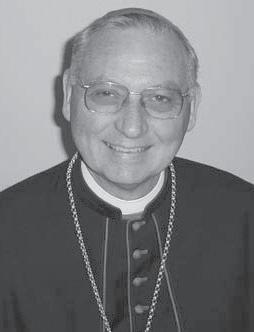

August 13 2008, The Record Page 15
The heavyweight: Cardinal JH Newman is one of the most well-known converts from Anglicanism, while Bishop Jeffrey Jarrett of Lismore, NSW (below left) and Fr Peter Geldard (right) have made significant contributions to the Catholic Church.
More than a giant - a prophet
Aleksandr Solzhenitsyn’s life was devoted to promoting truth and human dignity - in a world which valued them less and less. He also did more than any other individual in the Twentieth Century to intellectually discredit Marxism and its various genocides at a time when many intellectuals and commentators in the West were seeking to excuse or justify them.
Aleksandr Isayevich Solzhenitsyn (1918-2008) RIP
So finally he has joined his fellow zeks inmates. Year after year, millions of lives poured into the thirsty Gulag: for a caustic joke, for losing battles, for being heroic, for thinking counter-revolutionary thoughts, for failure, for success, for being related to a zek, for hatching imaginary plots, for nothing at all.
How could it be - such lies, such injustice, such truckling to the insane whims of the bloated spider at the heart of the corruption? He escaped to tell the tale, filled with a flailing fury that evil should grind to powder good, ordinary men in the frigid wastes of northern Russia.
Aleksandr Isayevich Solzhenitsyn was educated as a Marxist and served with distinction in the Red Army in an artillery unit. But towards the end of World War II he made a terrible blunder.
In letters to a friend which were intercepted by the censor he had made veiled criticisms of Stalin. There wasn’t much evidence, but he received an eight-year sentence anyway, followed by years of internal exile in Kazakhstan. Whatever Marxism there was in his heart evaporated as he witnessed what it was doing to Russia. He wrote his novels secretly, hardly daring to show them even to friends, lest he be betrayed and his manuscripts destroyed. Finally he broke his silence and offered One Day in the Life of Ivan Denisovich to the editor of the leading Soviet literary journal, Novy Mir. Nikita Khrushchev approved it personally as part of his campaign to denigrate Stalin. It was published, uncensored, in 1962.
A Day in the Life was a bombshell in the Soviet Union and in the West as well. It opened the eyes of ordinary Soviet citizens to the barbarity and injustice of life under Stalin, and it confirmed Western hostility towards Communism. It is a simple, short book which relates the strategies Ivan uses to survive oppression, hunger, cold and unending toil. It is impossible to forget, not because of its historical value, but because of its humanity. For anyone who cared to read it closely, it had a positive and deeply Christian message: that the measure of a life well lived is not success or recognition, but a deepening of one’s humanity. The most sympathetic figure, for instance, is a pious Baptist, Aloyshka, who tries to persuade Ivan Denisovich that he is freer in prison because he can pray without distractions. Ivan Denisovich remains unconvinced, but nods off to sleep “pleased with life”: “The end of an unclouded day. Almost a happy one. Just one
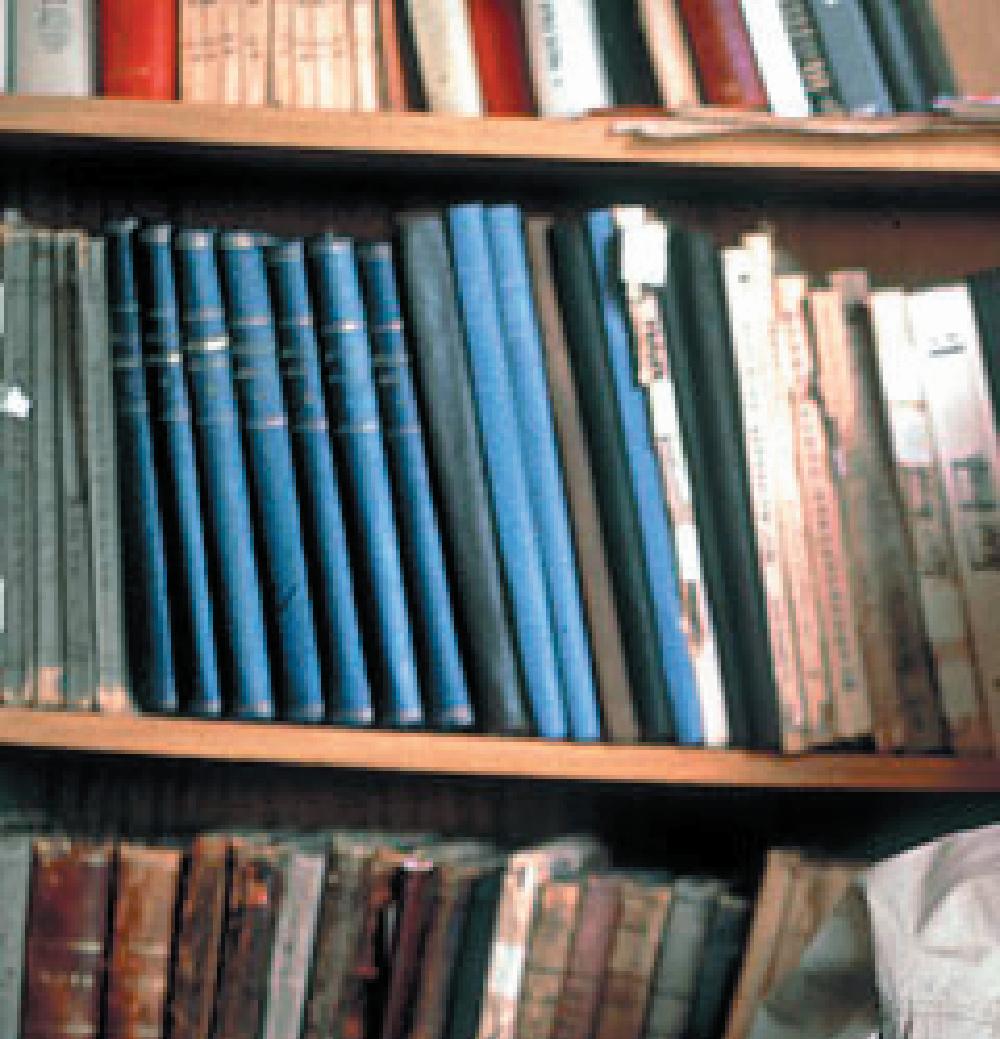

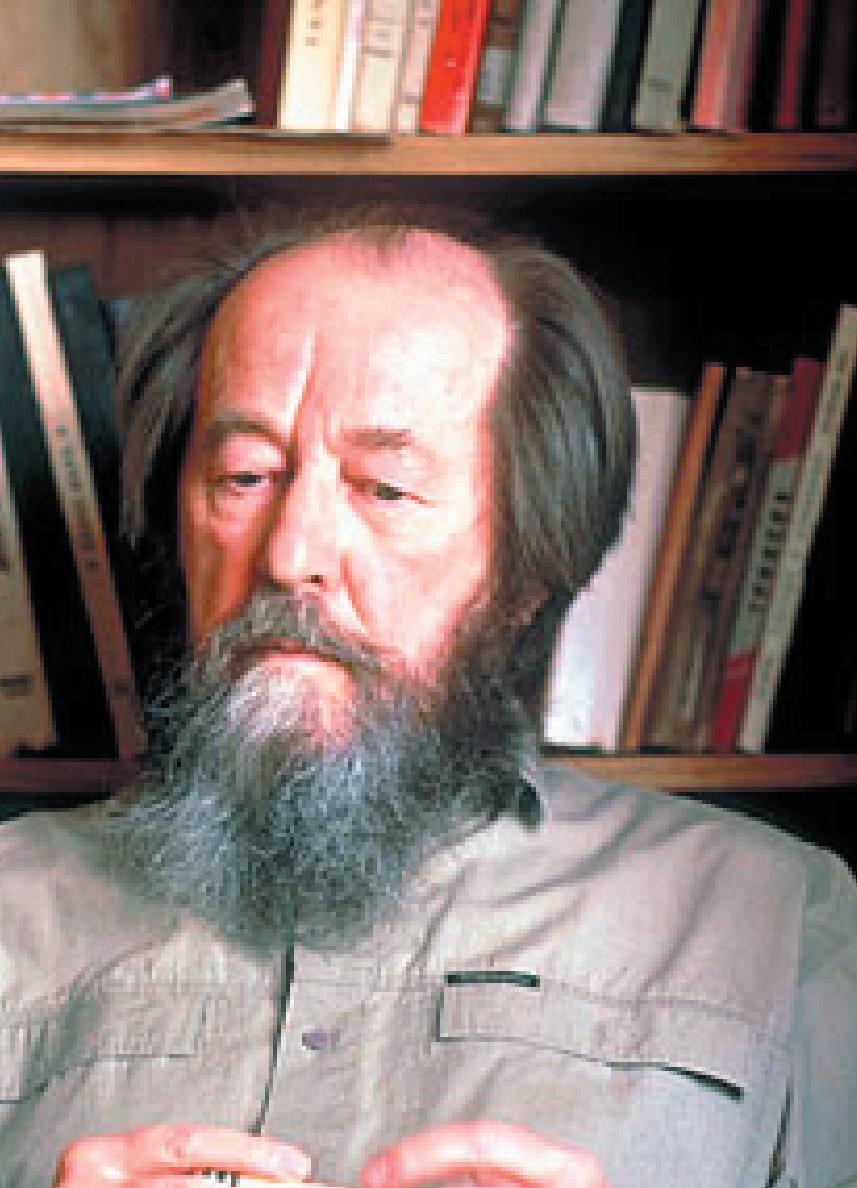


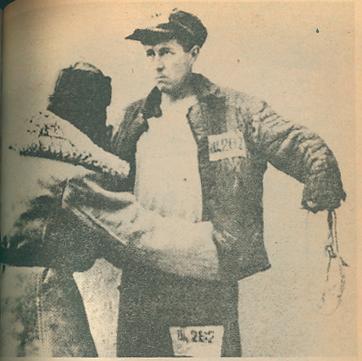

of the three thousand six hundred and fifty-three days of his sentence, from bell to bell. The extra three were for leap years.”
Solzhenitsyn’s curse was that his novels were read in both East and West more as political statements
than works of art. In the Soviet Union under Leonid Brezhnev, who deposed and succeeded Khruschchev, he became persona non grata. The First Circle and Cancer Ward were both smuggled out of the USSR and published in
voice recognition machine which can identify an official who made a single subversive phone call. Cancer Ward – filled, like most Russian novels, with more characters than the Moscow phone book – uses a cancer hospital as a metaphor for the bleakness of Soviet life after Stalin.
Solzhenitsyn’s great themes are the survival of good in an evil world, human dignity, the redeeming value of truth, and the importance of a spiritual dimension to life. But he was astonished to find that when he moved to the United States in 1976, these were no more welcome there than in the Soviet Union. In his eyes, America had become weakened and corrupted by its material success. He expanded upon this in a blistering address at Harvard in 1978 – only a little while after it had granted him an honorary doctorate. But Aleksandr Isayevich was not one to be bribed with the gewgaw of academic honours. Beginning with an invocation of the Harvard motto, Veritas, truth, he hammered an establishment which had strayed from the pursuit of truth and had liberated itself from God:
“But should someone ask me whether I would indicate the West such as it is today as a model to my country, frankly I would have to answer negatively. No, I could not recommend your society in its present state as an ideal for the transformation of ours. Through intense suffering our country has now achieved a spiritual development of such intensity that the Western system in its present state of spiritual exhaustion does not look attractive...
the West in 1968 to extravagant praise. In 1970 he won the Nobel Prize for Literature. By this time the Soviet leadership was fed up and in 1974 it stripped him of his citizenship and expelled him. In exile he continued writing and in 1973 appeared the first of three volumes of his act of piety to the millions who perished in Stalin’s camps, The The Gulag Archipelago became his best-known book and made him the world’s most famous Soviet dissident, many people found almost unreadable. A history, not a novel, it made bleak reading, full of endless gloom and unpronounceable names. This had the unfortunate effect of diverting many readers away from the brilliance and humanity of his other two novels The First Circle is a snapshot of a camp where scientist zeks are trying to create a
“Six decades for our people and three decades for the people of Eastern Europe; during that time we have been through a spiritual training far in advance of Western experience. Life’s complexity and mortal weight have produced stronger, deeper and more interesting characters than those produced by standardised Western wellbeing... It is true, no doubt, that a society cannot remain in an abyss of lawlessness, as is the case in our country. But it is also demeaning for it to elect such mechanical legalistic smoothness as you have. After the suffering of decades of violence and oppression, the human soul longs for things higher, warmer and purer than those offered by today’s mass living habits, introduced by the revolting invasion of publicity, by TV stupor and by intolerable music.”
The resentment which greeted this caustic analysis of capitalist materialism and Enlightenment thinking may explain why Solzhenitsyn’s reputation declined quickly thereafter.
His later novels, part of a gigantic historical cycle about the Russian Revolution, were largely ignored. Perhaps his powers were declining and perhaps his focus on Russia’s destiny was puzzling for Western readers. But ultimately Solzhenitsyn was sidelined because his unwavering belief that life was a battle between good and evil, between transcendent spirituality and degrading materialism, was regarded as too simplistic, even too threatening, in a society which spurned firm convictions.
Solzhenitsyn regarded himself first and foremost as an artist, not as an historian or politician. He had faith that his art could liberate men from the most humiliating servitude of all, living in the sty of their own lies.
“One word of truth shall outweigh the whole world,” he said in his Nobel Prize acceptance speech. It is a message that is needed today more than ever.
Michael Cook is editor of MercatorNet.
Page 16 August 13 2008, The Record
Meditation: Solzhenitsyn in a reflective moment. His Nobel Prize-winning works were a searing indictment of Soviet totalitarianism and effectively ended Communism’s intellectual respectability among Western intellectuals and academics. Banished to the West, however, he was under no illusions about the moral corruption there which matched the political corruption of Communism. His bluntness saw him become unpopular, especially with a media that could only understand comic book-like stereotypes.
Vindicated: Solzhenitsyn returns home, at left, welcomed by Russians as a prophet with a towering intellect and moral authority. He dedicated himself to remembering the 65 million or so done away with by Lenin and Stalin. Solzhenitsyn the zek, above, is shown in rare photographs of his time as an inmate of Stalin’s Gulag.
Kids quiz











COOKING
WITH THE SAINTS

 feast of spiritual and culinary delights!
feast of spiritual and culinary delights!
Over
DAVID’S FORTUNE COOKIES
Ingredients:
3⁄4 cup margarine
1 tsp vanilla
2 cups sugar
1 cup flour
3 eggs
60 psalms foiled into small squares
Method:
Let margarine soften. Blend in sugar in a bowl. Beat until fluffy. Add vanilla; add eggs one at a time. Beat well after adding each egg. Add flour, and beat in thoroughly. Grease and flour cookie sheets, drop rounded tsp of dough at least 2” apart on cookie sheet. Bake for 10 minutes at 300F
(Check equivalent in celcius). Remove each cookie gently. Fold the cookie in half, with psalm inside. Pinch edges together then twist in the centre.
RAGGEDY ANN SALAD
1 fresh or canned peach half
Small celery sticks
Large marshmallow
Raisins
Cut of cherry
Shredded yellow cheese
Leaf of lettuce
Body – A fresh or canned peach half
Arm & Legs – small celery sticks
Head – large marshmallow
Eyes, nose, shoes, buttons – raisins
Mouth – cut of cherry
Hair – shredded cheese (yellow cheese)
Lettuce – leaf of lettuce. Assemble – place on salad plate and serve.
These recipes come from Pat and St Odelia’s parish in Tuscon, Arizona - recipes compiled by catechists of this parish and after school children from government schools - RE instruction. Pat Rauhl and her husband spent 3 years in Western Australia where Pat was a Catechist for St Benedict’s Applecross, President of Majellans and a member of Catholic Women’s League.
Hey! Want to know more about St Paul? Get mum or dad to go through this quiz with you. Give yourself one point for each correct answer and see who gets the most points. Get a copy of the New Testament to help look up the answers.
As a teenager, who did Paul study with in Jerusalem? (See Acts 22:3)
A. Gamaliel
B. Jacob
C. Melchizedek
What was Paul’s occupation?
A. Tentmaker
B. Carpenter
C. Tax Collector
Was Paul a
A. Pharisee
B. Sadducee
St Paul was shipwrecked on what island in Acts 27-28?
A. Sicily
B. Malta
C. Hawaii
Who was the first convert Paul brought into the faith? (See Acts 16:13-15)
A. Barnabas
B. Lydia C. Peter
Late one night, a teenage boy named Eutychus sat in a window listening to St Paul preach. Eutychus dozed off, lost his balance and fell three stories. What did Paul do? (see Acts 20:7-12)
A. Buried Eutychus
B. Performed last rites
C. Brought him back to life
St.Paul
Apostle of the Church
Beginning June 29, 2008, the Catholic Church will recognize and celebrate the contributions of St. Paul, the author of many of the New Testament books, for a full year. He was much more than just a writer of epistles. He was a teacher, traveler and friend of St. Peter (like friends, they, too, had some disagreements). “He lived and worked for Christ:he suffered and died for Him,” Pope Benedict XVI said at the announcement of the Year of St. Paul.
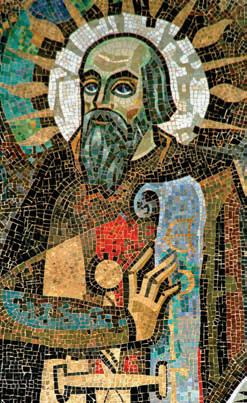
DRPJDHTIPUSEJENCNS
Which is NOT one of St Paul’s four feast days?
A. Conversion of St Paul
B. Dedication of the basilicas of St Peter and St Paul outside the walls
C. St Paul imprisoned
D. Saints Peter and Paul
Where did St Paul die?
A. Rome
B. Patmos
C. Alexandria, Egypt
Where is St Paul buried?
A. St Peter’s Basilica
B. The Colosseum
C. Basilica of St Paul Outside the Walls
A sword is a symbol of St Paul
A. True
B. False
Did You Know…?
St. Paul was descended from Benjamin, the youngest of Jacob’s twelve sons (Philippians 3:5).

When St. Paul was a teenager, his parents sent him to Jerusalem to study with Gamaliel, one of the most respected rabbis of his time (Acts 22:3).
St. Paul had at least one sister who lived in Jerusalem. When Paul’s enemies planned to ambush and murder him, his sister’s son warned his Uncle Paul and the Roman authorities (Acts 23:16).
When the king of Damascus tried to kill St. Paul, the apostle’s friends had him climb into a heavy-duty basket, then lowered him from a window in the city walls to safety (2 Corinthians 11:32-33).

Late one night, a teenage boy named Eutychus sat in a window listening to St. Paul preach. Eutychus dozed off, lost his balance and fell three stories. St. Paul brought the boy back to life (Acts 20:7-12).

St. Paul was shipwrecked on the island of Malta (Acts 27 and 28).
St. Paul has four feast days: Jan. 25, The Conversion of St. Paul; Feb. 10, St. Paul Shipwrecked; June 29, Sts. Peter and Paul; Nov. 18, Dedication of the Basilicas of St. Peter and St. Paul-outside-the-Walls.

St. Paul’s first convert was Lydia, a businesswoman who sold purple cloth (Acts 16:13-15).
St. Paul is buried in Rome, in the Basilica of St. Paul-outside-the-Walls. His relics lie under the altar in a stone coffin. On the lid is the inscription “Paulo Apostolo, Mart.” which means, “The Apostle Paul, ” which means “ The Paul Martyr.”
— By Thomas Craughwell
August 13 2008, The Record Page 17 Photos: The Crosiers and Shutterstock
ALQBWIJCRCPECCVWHT
KIODLKHGBPORTBTAJM
LVRSWAIDYLSMBYSIOT
CNIBASPDIRRZAJFGHY PKPUERPASLUKEPONJH SWUQWINDCNXBVATPRT XVBOFYUAAYASPNIVWO
WUCPJHYUTAEOKQULGI
the names of these friends and disciples of St.
Find
Paul.
TIMOTHY TITUS BARNABAS Take Out Summer_08 4/17/08 12:05 PM Page 5
LUKE LYDIA PRISCA
COOKING
Kids bitz
By Ernst Schuegraf
170 recipes from 21 countries.
illustrated with colour photos of saints and dishes including inspiring short biographies of 73 saints.
recipe for St Paul.
A
Richly
*No
THE MOST UNIQUE CATHOLIC COOKBOOK EVER!
Panorama
A roundup of events in the Archdiocese
Panorama entries must be in by 12pm Monday.
Contributions may be emailed to administration@therecord.com.au, faxed to 9227 7087, or mailed to PO Box 75, Leederville, WA 6902.
Submissions over 55 words will be edited. Inclusion is limited to 4 weeks. Events charging over $10 constitute a classified event, and will be charged accordingly. The Record reserves the right to decline or modify any advertisment.
Sunday August 17
PERTH WYD REUNION – POST-WYD REUNION PARTY
1pm to 4pm at Vietnamese Catholic Community Centre, 3 Victoria Road, Westminster, bring your photos, stories, some food and drinks to an informal gathering with all Perth World Youth Day Pilgrims. RSVP to: wydperth@highgate-perthcatholic.org.au or Office 9422 7944.
Wednesday August 20
TAIZE MEDITATION PRAYER
7.30pm to 8.30pm at St Thomas More Catholic Church, 100 Dean Road, Bateman: spend an hour in Group Prayer and relax after a busy day in a candlelight atmosphere of prayer and song. All welcome. Enq: Daisy/Barney 9310 4781.
Wednesday August 20
ST SIMON PETER PLAYERS PRODUCTION AND CREATIVE TEAM (CREW) MEETING
7.30pm at Our Lady of the Mission, Camberwarra Drive, Whitfords; inter-parish group seeks crew to stage its next original production in 2009, The Story of the Three Marys, Mary of Nazareth, Mary of Bethany and Mary Magdalene. Enq: Gerald 9404 7272.
Thursday August 21
ST PEREGRINE HEALING MASS
7.pm at St John and Paul Church, Pinetree Gully Road, Willetton. A Healing Mass in honour of St Peregrine, Patron of cancer sufferers and helper of all in need. Celebration will include Veneration of the Relic, and anointing of the sick. Enq: paddyjoe@iinet.net.au
Thursday August 21
CAMPION COLLEGE INFORMATION EVENING –FR JOHN FLEMING
7:30pm Venue TBA. An opportunity for secondary and tertiary students, parents and Catholic teachers to hear more about this authentically Catholic University based in Sydney, offering Liberal Arts Degree. Enq: Antoinette antlet@bigpond.com or 0433 921 554.
Friday August 22
MEDJUGORJE EVENING OF PRAYER
7pm to 9pm at St Peter The Apostle Parish, Wood Street, Bedford; an evening of prayer with Our Lady Queen of Peace, commencing with Adoration, Rosary and Benediction followed with Holy Mass. All welcome. Free DVD on Medjugorje. Enq: Eileen 9402 2480.
Saturday August 23
ST PADRE PIO PRAYER GROUP
9.45am at Infant Jesus Church, 47 Wellington Road, Morley. Exposition, Rosary, Divine Mercy, Adoration and Benediction, Fr Meilak. Confession in English or Italian. 11am Mass, St Padre Pio Liturgy, Celebrant Archbishop Barry Hickey. Attending Priests invited to concelebrate. 12pm shared lunch. Tea and coffee provided. Enq: Des 6278 1540.
Saturday August 23
LAUNCH OF THE TELEPACE AUSTRALIA INC
After 11am Mass at Infant Jesus Church, Wellington Road, Morley by His Grace Archbishop Hickey, President of Telepace. Official announcement will be made during lunch. Bring plate. Enq: Rose 0437 700 247 or Des 6278 1540.
Wednesday August 27
PREGNANCY ASSISTANCE INFORMATION DAY
9.30am-2.30pm at Pregnancy Assistance Inc, 195 Lord Street, East Perth; Are you pro-life? Compassionate? Are you good listener? Register to know more about becoming a pregnancy support volunteer. Enq: Lydia 9328 2926.
Friday August 29
TRUE LOVE WAITS DVD WORKSHOP
7.15pm at Claremont Parish Hall; featuring Chris West’s inspiring teaching on the Theology of the Body running over 8 Friday nights. Catering provided. Enq: www. truelovewaitswa.com or Stephen 0431 228 630 or truelovewaitswa@yahoo.com to register.
Saturday August 30 to Monday September 8
SILVER JUBILEE OF THE NOVENA TO OUR LADY OF GOOD HEALTH, VAILANKANNI
6pm Vigil Mass at Holy Trinity Church, 8 Burnett Street, Embleton; Celebrant Archbishop Charles Bo of Yangon followed by Novena, devotions, Benediction and banner hoisting. Times weekend 6pm, weekdays 7pm. September 1,2, and 6 blessing of children, anointing of the sick and Novena Food Fete. 8 September, after Mass, candlelight procession to Grotto to honour Our Lady and farewell Archbishop. Bring plate. Enq: George 9272 1379.
Friday September 5
CATHOLIC FATIH RENEWAL
7.30pm at St John and Paul’s Church, Pinetree Gully Road, Willetton. Praise and Worship, then talk – Be still and Know I am God, by Fr Clayton Mitchell. Thanksgiving Mass, followed by refreshments. All welcome, bring family and friends. Enq: Maureen 9381 4498 or Rose 4043 300 720.
Saturday September 6
DAY WITH MARY
9am to 5pm at St Andrew Church, 53 Belleville Gardens, Clarkson; 9am Video on Fatima. Day of prayer and instruction based upon the Fatima message. Reconciliation, Holy Mass, Eucharistic Adoration, Sermons on the Eucharist and Our Lady, Rosaries, Procession of the Blessed Sacrament and Stations of the Cross. BYO lunch. Enq: Franciscan Sisters of the Immaculate 9250 8286. Transport: Nita 9367 1366.
Sunday September 7
DIVINE MERCY
1.30pm at St Joachim’s Church, Shepperton Road, Victoria Park, Holy Rosary and Reconciliation. Sermon on St Gregory the Great, by Fr Terry Rag. Followed by Divine Mercy prayers, Benediction and refreshments. Video/DVD on Holy Rosary, Part 3 by Fr John Corapi. Enq: 9457 7771.
Thursday September 11 to Sunday September 14
FEAST OF OUR LADY MARIA SANTISSIMA DEL
TINDARI
7.30pm at Basilica St Patrick, Adelaide Street, Fremantle; Triduum Mass celebrated by Fr Christian Fini O.M.I –Melbourne. 9.45am Sunday concelebrated Mass, principal celebrant Archbishop Barry J Hickey. 2pm Sunday procession from the Basilica through Fremantle Streets. Enq: Joe 0404 801 138 or 9335 1185.
Friday September 19 to Sunday September 21
WEEKEND RETREAT
TRANSFORMATION AND EUCHARIST – IN WHAT WAY DOES THE EUCHARIST SUPPORT YOU FOR THE JOURNEY?
7pm at St John Of God Retreat Centre, you are invited to explore and deepen your understanding of the Eucharist. Enq: Sr Ann Cullinane 0409 602 927.
Saturday September 20
ST PADRE PIO PILGRIMAGE TO TOODYAY – FEAST DAY AND 40TH ANNIVERSARY OF HIS DEATH
8.15am depart, route, Glendalough, Balcatta, Leederville, Morley, Bassendean and Midland. 10.15 Padre Pio DVD. 11.30am Mass. 12.45 Lunch BYO. 2pm Eucharistic Procession, Rosary, Adoration and Benediction. Confession available. 4.15 Return. Enq: Des 6278 1540. Victoria Park, Mirrabooka, Girrawheen, Nita 9367 1366.
Friday September 26
MEDJUGORJE EVENING OF PRAYER
7pm to 9pm at St Gerard’s Parish, Changton Way, Mirrabooka; a prayer with Our Lady Queen of Peace, will commence with Adoration, Rosary, and Benediction ending with Holy Mass. All welcome. Free DVD on Medjugorje. Enq: Eileen 9402 2480.
Monday September 29
DIVINE MERCY PILGRIMAGE TO GINGINCHITTERING-FEAST OF THE ARCHANGELS
11.30am lunch BYO at Gingin; 12.30pm Holy Rosary and Way of the Cross - with Pilgrim Cross. 1.30pm depart Shrine of Divine Mercy for 2pm Holy Mass, followed by Divine Mercy Devotions and Benediction. 3.30pm Tea. 4.30pm return. Divine Mercy Prayer Groups welcome. Transport: Francis 9459 3873 or 0404 893 877. Enq: Sheila 9575 4023 or Fr Paul 9571 1839.
Friday October 3 to Sunday October 5
CATHOLIC FAITH RENEWAL – RETREAT
6.30pm at Advent Park 345 Kalamanda Road, Maida Vale; Talk, God – I am yearning for you, longing for you and desiring you- Where are You, by Fr Gino Henriques, CSsR, an international speaker. Enq: Kathy 9295 0913, Rose 0403 300 720, Maureen 9381 4498.
Mid October
DIVINE MERCY APOSTOLATE
Pilgrimage to Lourdes for nine days. Father Meilak will be the Spiritual Director. This invitation is open to anyone who would like to join us. Consider this wonderful place of healing for all humanity in body, mind and spirit. Lourdes celebrates 150 years this year. Enq: John 9457 7771.
Every Sunday
MUSICIANS AND SINGERS
6pm at the Redemptorist Monastery Church, Vincent Street, North Perth; the Shalomites have been providing the music and singing for over thirty years. We are looking for new members particularly musicians. All interested singers and musicians are welcome. Enq: Stephen or Sheelagh 9339 0619.
Every Saturday
VIDEO/DVD NIGHT
After the 6.30pm Mass at St. Joseph’s Church, 20 Hamilton Street, Bassendean; 16 August Kimberly Hahn, Conversion Story (part 2). 23rd August, Kibeho Apparitions, Africa: approved by Church. DVDs approximately 30 mins. Bring family. Enq: 9379 2691.
Every 1st Tuesday of the Month
HEALING MASS
7.30pm at St Joachim’s Parish Hall, Shepparton Road, Victoria Park. Incorporating hymns, spiritual reflection and Novena to God the Father. Enq: Jan 9323 8089.
Every 1st Sunday of Month DIVINE MERCY
Commencing with the 3 o’clock Prayer at Santa Clara Parish, Bentley, followed by the Chaplet of Divine Mercy, reflection and Benediction. All friends and neighbouring parishes are invited. Tea and coffee provided. Enq: Muriel 9458 2944.
Every 2nd Wednesday of Month CHAPLETS OF THE DIVINE MERCY - MONTHLY DEVOTIONS
7.30 pm at St Thomas More Catholic Church, Dean Road, Bateman. All welcome. Enq: George 9310 9493 home or 9325 2010 work.
Every 1st Thursday of the month PRAYER AND MEDITATION SERVICE USING TAIZE SONGS
7.30pm at Our Lady of Grace, 3 Kitchener Street, North Beach, the next service of prayerful, beautiful chants
sang together, in meditative silence, bathed in candlelight and reflecting on themed readings will commence 7 August. All welcome. Enq: Beth 9447 0061 or office 9448 4888.
Every Thursday
JOURNEY THROUGH THE BIBLE
7.30pm, July 31, Acts 2 College of Mission and Evangelisation, Osborne Park using The Bible Timeline; The Great Adventure can be studied towards accredited course or for interest. Resources provided. See http:// www.acts2come.wa.edu.au/ or Jane 0401 692 690.
First Friday and First Saturday
COMMUNION OF REPARATION-ALL NIGHT VIGIL
Corpus Christi Church, Mosman Park, 47 Lochee Road. Starting with Mass at 7pm on Friday with Father Bogoni and concluding with Mass at midnight. Confessions, Rosaries, Prayers and silent Adoration every hour. Please join us for reparation to The Two Hearts according to the message of Our Lady of Fatima. Enq: Vicky 0400 282 357.
Third Sunday of the Month
OBLATES OF ST BENEDICT MEET
2pm St Joseph’s Convent, York Street, South Perth, affiliated to Benedictine Abbey of New Norcia. All interested in studying rule of St Benedict, its relevance to lay people’s day-to-day life. Vespers and tea conclude meetings. Enq: 9457 5758.
Every Saturday
HOLY SPIRIT OF FREEDOM CHARISMATIC PRAYER MEETING
10.30am to 12.30pm at St Peter the Apostle Parish Hall, 91 Wood Street, Inglewood. All welcome. Enq: 9475 0155.
First Friday of Each Month
CFC PRAYER ASSEMBLY
7.30pm at St Joachim Parish Hall, Shepperton Road, Victoria Park. The Couples For Christ and its Family Ministries welcome all members who now reside or are visiting Perth to join the community in its monthly general prayer assembly. Enq: Tony and Dolly Haber 9440 4540.
Every Sunday LATIN MASS KELMSCOTT
The Latin Mass according to the 1962 missal will be offered every Sunday at 2pm at the Good Shepherd Parish, 40-42 Streich Avenue, Kelmscott, with Rosary preceding. All welcome.
Every Tuesday
THE GOSPEL OF ST MATTHEW - COURSE
7.30pm St Joachim’s Parish Hall, Shepperton Road, Victoria Park. Exciting revelations into the Gospel of St Matthew are being offered free of charge. Conducted by Fr Douglas Rowe SFP. Participants will be introduced into an insightful exploration of this fascinating Gospel. Light refreshments will follow. Please bring your bible and a friend.
AL-ANON FAMILY GROUPS
If a loved one’s drinking is worrying you – please call AlNon Family Groups, for confidential information, meetings etc. Call 9325 7528, 24 hours.
BOOK DONATIONS WANTED
We urgently need donations of Altar Vessels, Catholic books, Bibles, Divine Office, Missals, Lectionaries, Sacramentaries etc. Telephone: (08) 9293 3092.
CALL FOR VOLUNTEERS
Jesuit Volunteers Australia calls for part-time volunteers to respond to the needs of people in the community who live in marginalised circumstances. To learn more: www.jss.org.au. Enq: Kevin Wringe 9316 3469 or email kwringe@iinet.net.au.
Page 18 August 6 2008, The Record
reasonably brief
US prime-time TV undermining marriage
Marriage gets little respect on US network television shows, even in prime time, says a not too surprising report from the Parents Television Council.
After studying four weeks of scripted shows on the major networks at the start of the 2007-2008 season, the council concludes that prime-time TV “seems to be actively seeking to undermine marriage by consistently painting it in a negative light”.
What appears to fascinate the networks, according to the report, is bizarre sexual behaviour including partner swapping and paedophilia.
Visual references to “kinky” practices outnumbered married-sex references by nearly three to one.
Behaviour that was once seen as “fringe, immoral or socially destructive has been given the imprimatur of acceptability by the television industry” and children are absorbing or even imitating it, the report says.
References to adultery outnumbered references to marital sex by two to one. The “family hour” - the


first hour of prime-time TV, which draws the most young viewers - contained the highest ratio of references to non-married vs. married sex, the study found.
It cites “Grey’s Anatomy”, “Boston Legal” and “Desperate Housewives” as providing bad examples of sexual behaviour.
While some shows have better attitudes, says the council, they are not necessarily suitable for children.
Parents do not necessarily have the tools to identify program they may want to block via the V-chip, and the council says designations such as “S”, signalling sexual content, were applied inconsistently or inaccurately. - FAMILYEDGE
100 per cent of Americans ‘to be overweight by 2048’
Most American adults will be overweight or obese by 2030 and related health care spending will be more than US$950 billion, according to the research in the latest issue of the journal Obesity.
“If these trends continue, more than 86 per cent of adults will be overweight or obese by 2030 with approximately 96 per cent of
non-Hispanic black women and 91 per cent of MexicanAmerican men affected,” says Dr Youfa Wang, the lead author.
He estimates that at least 1 in 6 health care dollars will be spent on obesity-related ailments.
There may be more than a smidgen of alarmism in the report. Looking even further into the future, Dr Wang projects that by 2048 100 per cent of American adults will be obese.
This seems improbable, as other researchers claim that the prevalence of anorexia nervosa is also increasing. Surely skinny people will not become extinct!
Nonetheless, public health experts are preparing for the worst. Overweight and obese people are at risk of hypertension, type 2 diabetes, heart disease and stroke. Children and young adults may end up having a shorter life expectancy than their parents if the trend continues.
This is gloomy news for the government health experts who organised the “Healthy People 2010” program.
This aimed to reduce obesity by 15 per cent among adults. Fat chance. Dr Wang believes that direct health costs attributable to overweight Americans will more than double every decade.
- FAMILYEDGE
BUILDING TRADES
■ BRICK RE-POINTING
Phone Nigel 9242 2952.
■ PERROTT PAINTING PTY LTD
For all your residential, commercial painting requirements. Phone Tom Perrott 9444 1200.
■ BRICKLAYING
20 years exp. Quality work. Ph 9405 7333 or 0409 296 598.
■ PICASSO PAINTING
Top service. Phone 0419 915 836, fax 9345 0505.
BOOK REPAIRS
■ REPAIR YOUR LITURGICAL BOOKS
General repairs to books, old bibles & missals. 2ndhand Catholic books avail. Tydewi Bindery 9293 3092.
FURNITURE REMOVAL
■ ALL AREAS
Mike Murphy 0416 226 434.
RELIGIOUS PRODUCTS
■ ALL SAINTS HANDCRAFTED ROSARIES AND CHAPLETS
View our current range of original rosaries, chaplets and bracelets for all occasions. Custom orders in the beads and colour of your choice are welcome. Contact Elisa on 0421 020 462 or email allsaintscreations@iinet.net.au
■ KINLAR VESTMENTS
‘Modern meets tradition.’ Quality hand-made & decorated. Vestments, altar cloths, banners. Vickii Smith Veness. 9402 8356 or 0409 114 093.
■ CATHOLICS CORNER
EMPLOYMENT
■ CARETAKER COUPLE
For Catholic Church, Bindoon. Accom provided. Suit active pensioners. For details telephone 9571 1839 or 9576 0006.
HOLIDAY ACCOMODATION
■ MANDURAH
Fully furnished, Air Conditioned 2 Bedroom Flat 100m to Halls Head Beach ring 08 9385 9732.
■ MANDURAH
Townhouse in Resort Complex. Fully furnished. Sleeps 6. Phone 9381 3495 or email valma7@bigpond.com
HEALTH
■ DEMENTIA REMISSION
Do you, or your loved one, suffer Dementia. Get into Dementia Remission like me! http://www. wgrey.com.au/dm/index.htm or (02) 9971 8093.
EFFECTIVE LEGAL, family owned law firm focusing on property settlements and wills. If you are buying, selling or investing in property, protect your family and your investment, contact us on (08) 9218 9177. WANTED
■ PLEASE HELP
A monstrance, candelabra and icons are required for Eucharistic Adoration at Murdoch University. If you are able to assist with any of these items please contact Fr Joe Cardoso on 0403 303 667.
■ ORGANIST
AUGUST

Parish Visitation, Bateman - Bishop Sproxton
17 Confirmation, Mt Lawley - Archbishop Hickey
Procession for Feast of Assumption, Mundaring - Archbishop Hickey
Reception for Anniversar y of Independence, Republic of IndonesiaFr Ari Pawar to OCarm
Nor thbridge Histor y Projec t Irish Event, Nor thbridge - Archbishop Hickey
Visit Confirmation Candidates, Morley - Archbishop Hickey
23 Confirmation, Morley - Archbishop Hickey
Padre Pio Prayer Group Day and Launch of Telepace in Per th, MorleyArchbishop Hickey
Investiture Mass, Equestrian Order of the Knights of the Holy Sepulchre of Jerusal Subiaco - Archbishop Hickey
Mass and Commissioning, St Vincent de Paul, Ocean Reef - Bishop Sproxton Pilgrimage, Vietnam - Archbishop Hickey
24-29 Clergy Retreat - Bishop Sproxton

Retailer of Catholic products specialising in gifts, cards and apparel for baptism, communion and confirmation. Ph: 9456 1777. Shop 12, 64-66 Bannister Road, Canning Vale. Open Mon-Sat.
■ OTTIMO
Shop 108 TRINITY ARCADE (Terrace Level)
Hay St, Perth Ph 9322 4520. Convenient city location for a good selection of Christian products/ gifts. We also have handbags, fashion accessories. Opening hours Monday-Friday 9am-6pm.


St Joseph’s, Subiaco is seeking an organist to play for Masses and other occasions. Lessons given if required. Please contact Michael Peters, Director of Music, on 041 429 4338 or michael@michaelpeters.id.au
granted. Sandra
and
of
to despise and
down
that God speaks to us. But do we have the humility and missionary sense to listen to them?
Office on
7933 should you want to explore this idea further.





SETTLEMENTS
THANK YOU
you Saint
August 13 2008, The Record Page 19 Classifieds: $3.30/line incl. GST 24 hour Hotline 9227 7778 Deadline: 12pm Monday ADVERTISEMENTS Classifieds Subscribe!!! Name: Address: Suburb: Postcode: Telephone: I enclose cheque/money order for $78 For $78 you can receive a year of The Record and Discovery Please debit my Bankcard Mastercard Visa Card No Expiry Date: ____/____ Signature: _____________ Name on Card: Send to: The Record, PO Box 75, Leederville WA, 6902 Ne w subscr ibers will recie ve a f ree entr y into our CATHEDRAL CR UCIF IX COMPET IT ION! MISSION MATTERS Reflections on this Sunday’s Gospel; Matthew 15:21-28 Today’s Sunday gospel reveals the humanity
himself to be moved, touched
the
the
Desperate
look
Call
Thank
Jude, Apostle and martyr for petition
of Jesus as he allows
and ‘missioned to’ by the deep faith of
desperate and despised Canaanite woman. Catholic missionaries throughout
developing world live and work amongst people like her.
and despised because of their poverty and ethnic background, they are usually people of exceptional faith who find healing and hope in the presence
work
our missionaries. Paradoxically it is through them, the people that we tend
on,
the Mission
9422
Please debit my Bankcard Mastercard d

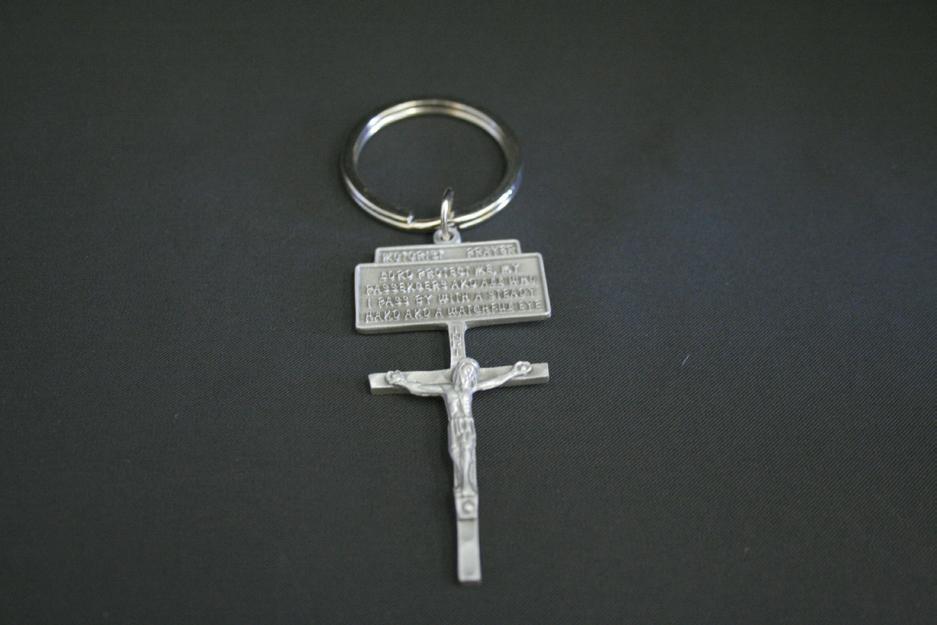
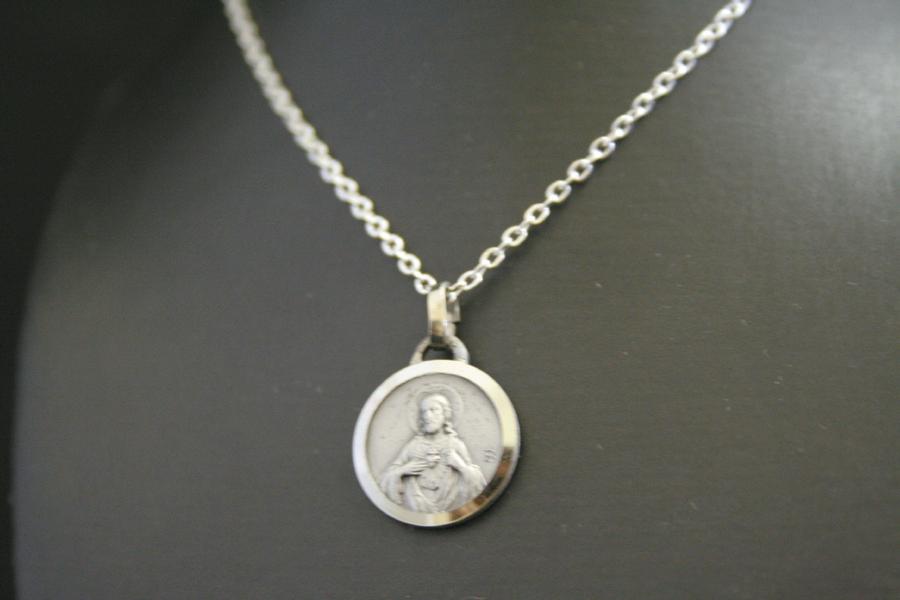

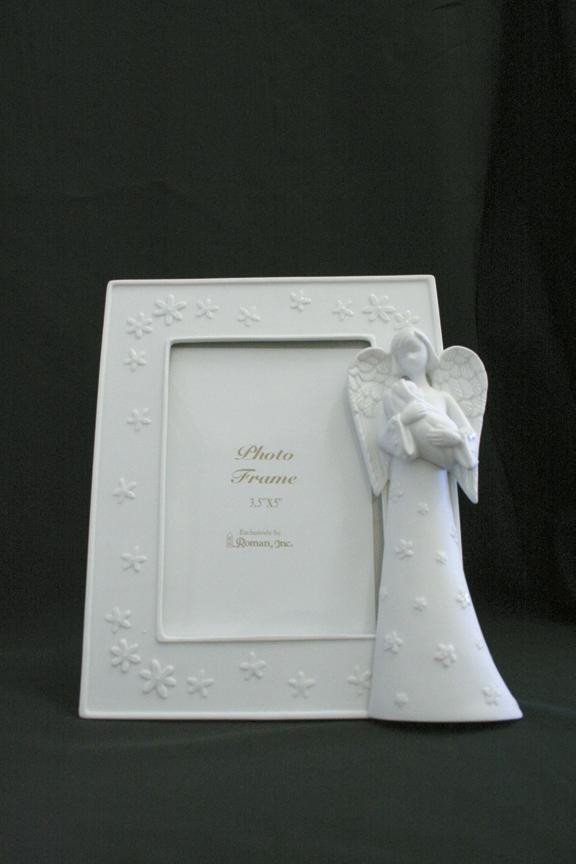


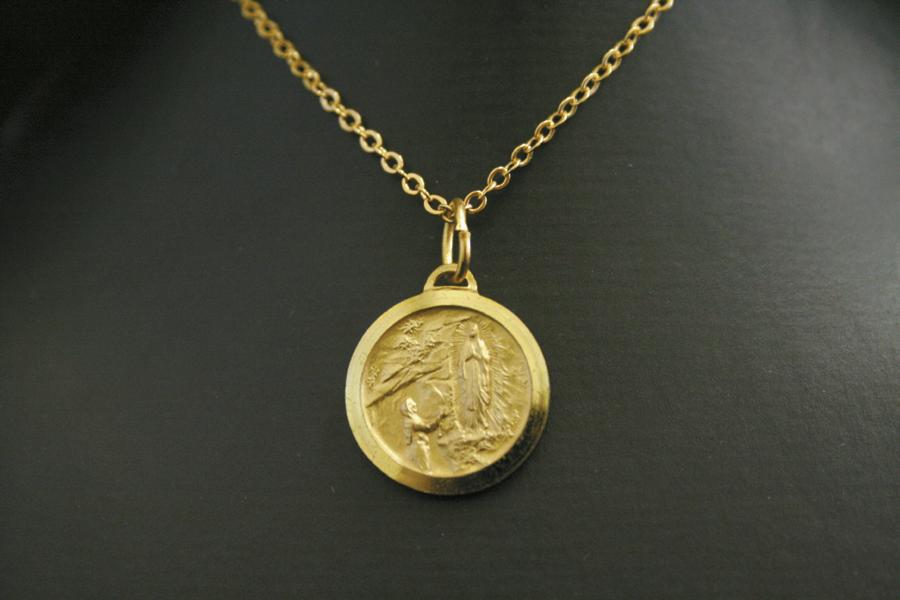
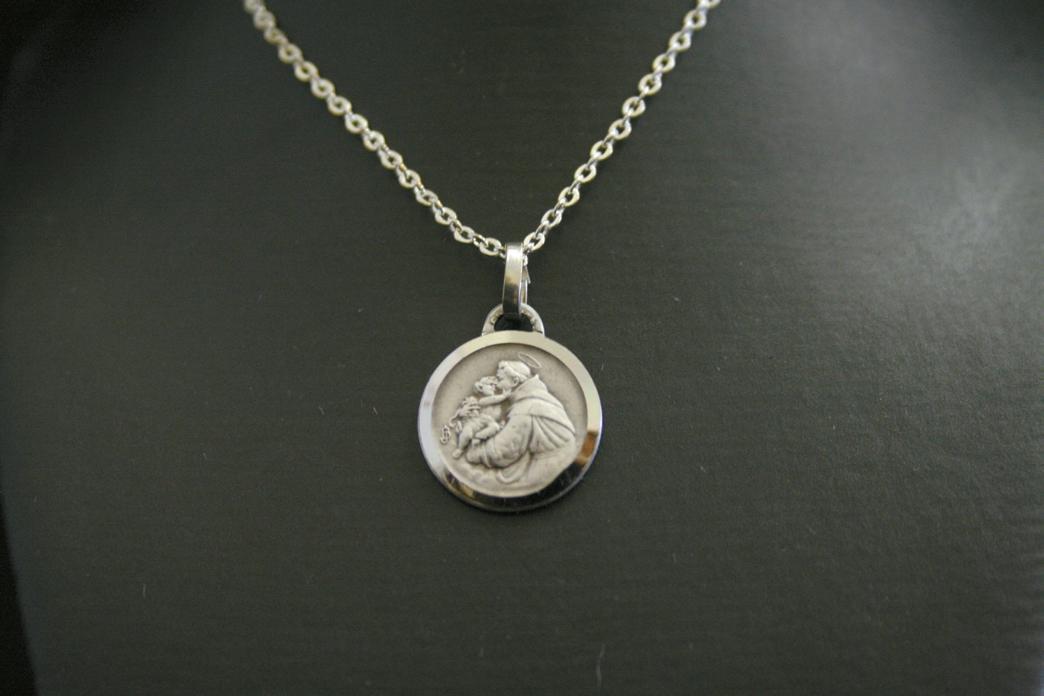
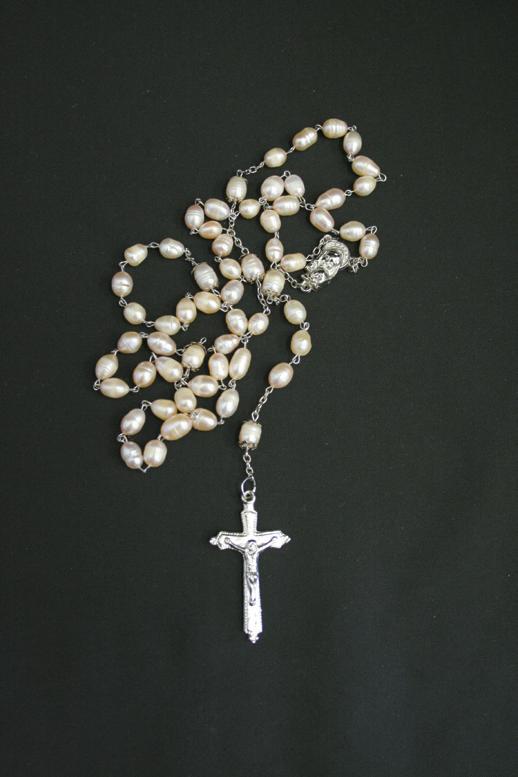

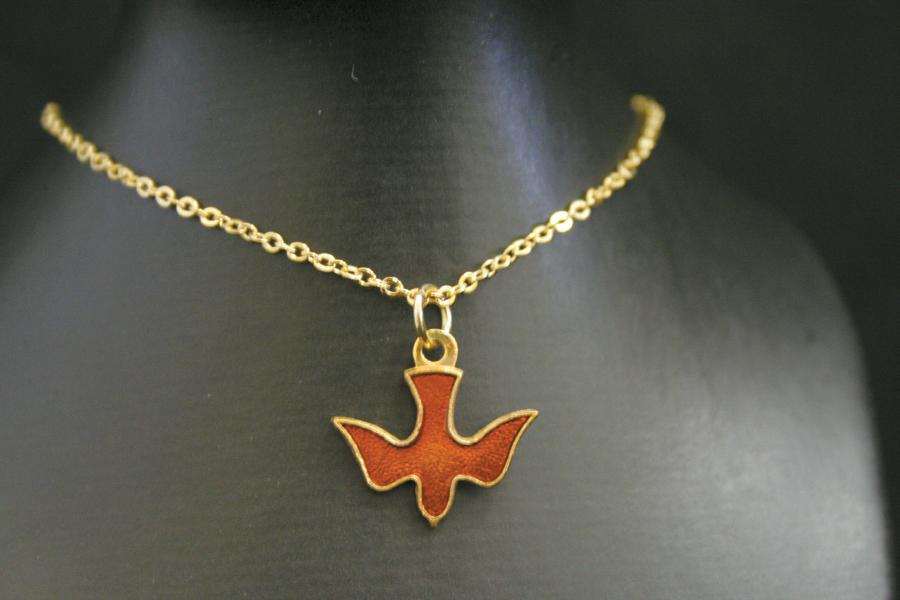
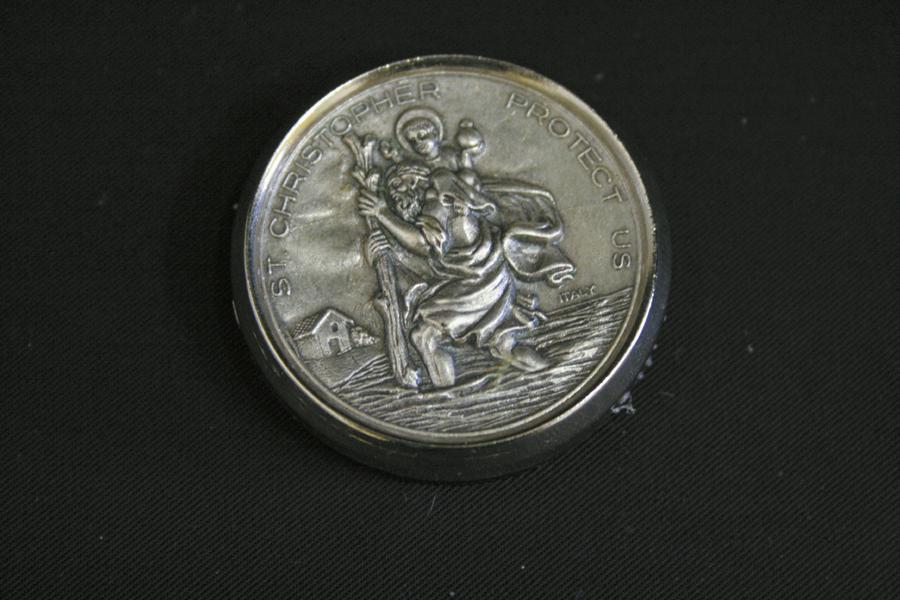


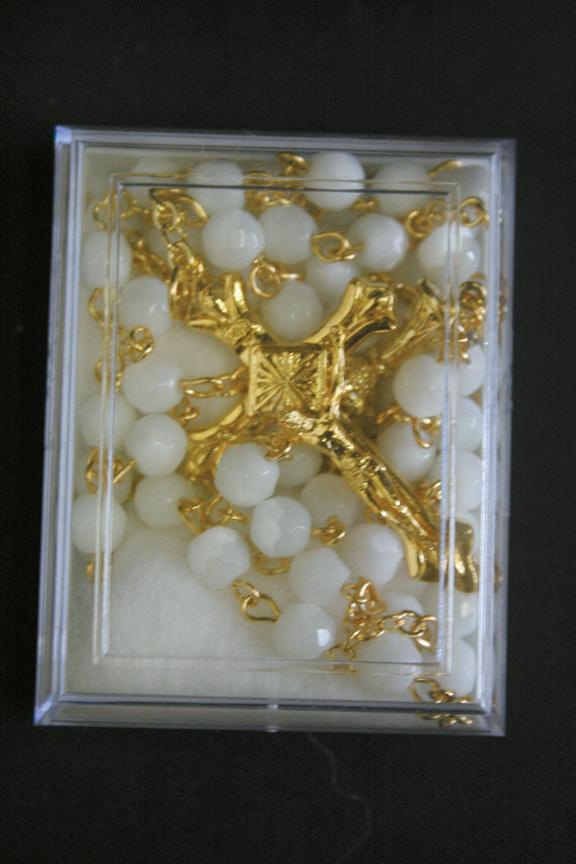







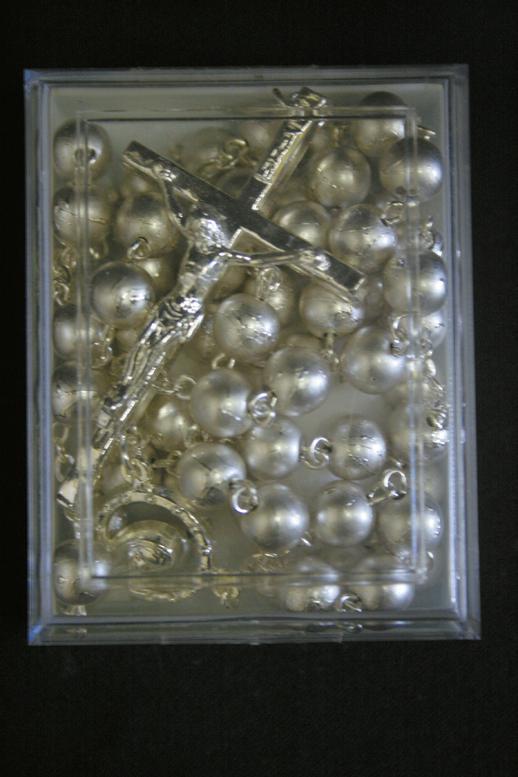
August 13 2008, The Record Page 20 Giftshop Sale $13.95 $4.95 $8.95 $4.95 $7.50 $7.50 $7.50 $7.50 $7.50 $7.50 $7.95 $39.95 $14.50 each $6.50 each $29.95 $9.95 $10.95 $33.95 $20.95 $15.95 $15.95 $29.95 $29.95 All gifts available from The Record Bookshop, contact Caroline on (08) 9227 7080 or bookshop@therecord.com.au $7.50









































 ■ By Anthony Barich
■ By Anthony Barich








 ■ By Steve Gorddard
■ By Steve Gorddard









 ■ By Joanna Lawson
■ By Joanna Lawson





























































































 Beth O’Neil
Beth O’Neil



 with Debbie Warrier
with Debbie Warrier

 By Fr John Flader
By Fr John Flader





 with Bronia Karniewicz
with Bronia Karniewicz














































 feast of spiritual and culinary delights!
feast of spiritual and culinary delights!


































